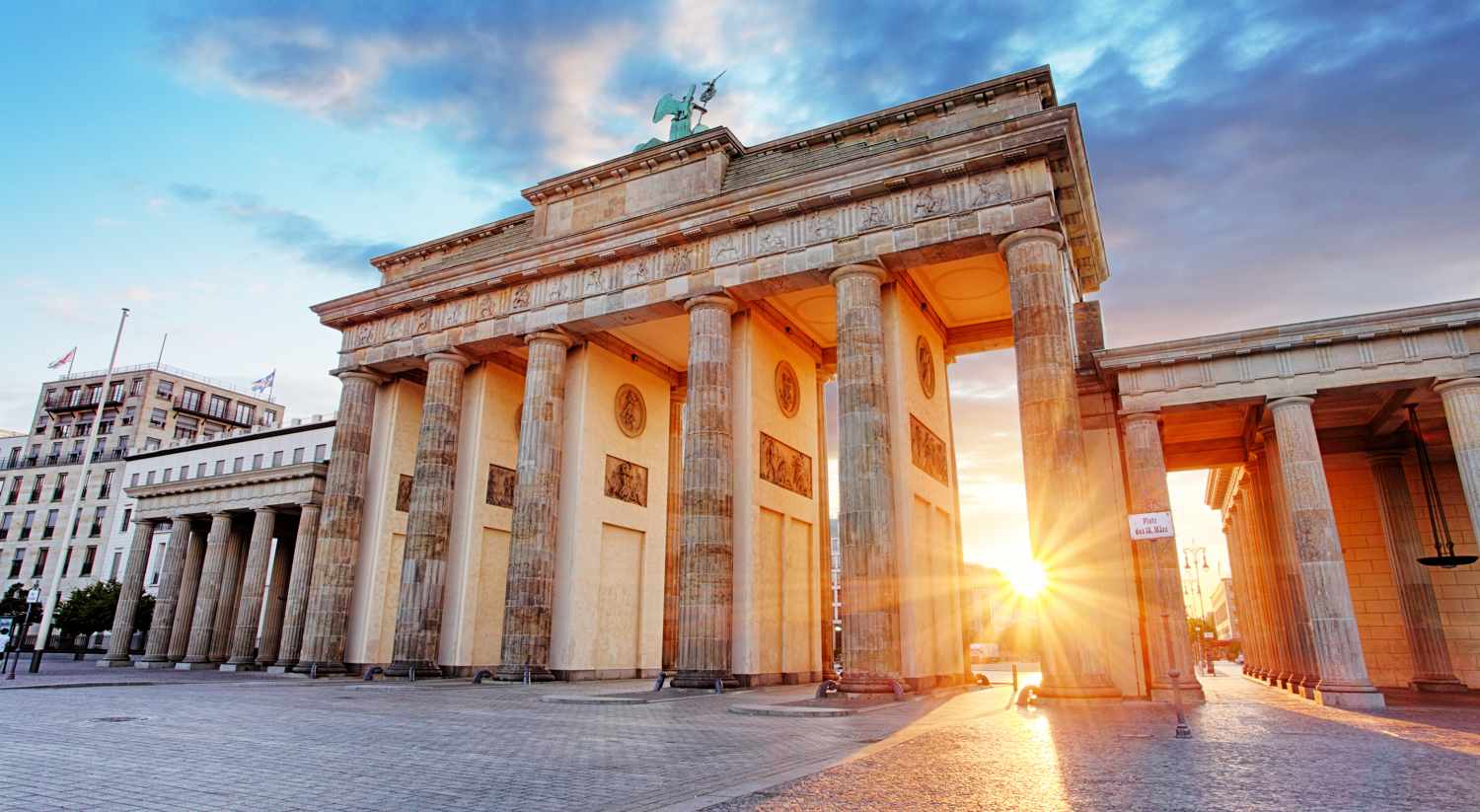

Introducing Germany
About germany.
- Images of Germany
- History, language & culture
- Weather & geography
- Doing business & staying in touch
Plan your trip
- Travel to Germany
- Where to stay
While you’re there
- Things to see & do
- Shopping & nightlife
- Food & drink
- Getting around
Before you go
- Passport & visa
- Public Holidays
- Money & duty free
Book your flights
- BER Berlin Brandenburg Airport
- Bodensee Airport Friedrichshafen
- City Airport Bremen
- Cologne Bonn Airport
- Dresden International Airport
- Düsseldorf Airport
- Frankfurt Airport
- Hamburg Airport
- Hanover Airport
- Leipzig/Halle Airport
- Munich Airport
- Münster Osnabrück International Airport
- Nuremberg Airport
- Paderborn/Lippstadt Airport
- Rostock-Laage Airport
- Stuttgart Airport
- Sylt (Westerland) Airport
- Zweibrücken Airport
Ski Resorts
- Garmisch-Partenkirchen
Germany travel guide
Misunderstood by many, Germany is one of the most varied and charming countries on the continent. Anyone expecting a homogenous nation conforming to old Teutonic stereotypes is in for a shock.
As a destination, it offers a clutch of truly lovely cities, culture served up in hefty portions and rural scenery so pretty you'll wonder why it isn't on every tourist hit list.
The country occupies a prime position at the heart of Europe – both literally and figuratively. It is home to the biggest economy on the continent, has more inhabitants than anywhere else in the EU and shares land borders with no less than nine other nations.
It's no surprise, then, that today's Germany is more diverse and cosmopolitan than old stereotypes suggest; mixing time-honoured traditions with multicultural modernism and self-confidence.
It’s the nation’s urban highlights that immediately draw the attention. Berlin is the definition of dynamism, having forged a good-time reputation for groundbreaking creativity while still keeping sight of its past.
Elsewhere, the likes of Cologne, Munich and Hamburg provide the capital with able support. Not only are they rich in history, whether in the forms of classical music, fine art or medieval architecture, but they also put pay to the notion that Germans don’t do gastronomy. These days, you can dine and drink extremely well in Deutschland.
Then there's the beautiful German countryside. From the sky-scraping peaks of the Bavarian Alps and pale cliffs of the Jasmund National Park to the castles of the Rhine and moors of the Mecklenburg Lake District, it's nirvana for hikers, cyclists, boaters, motorists and skiers alike.
Travelling around this country is a piece of Black Forest gâteau. Costs are manageable, overcrowding is rare and, despite its size, it could not be easier to get from A to B thanks to an incredibly efficient public transport network. Which proves some of those old German stereotypes do hold true.
357,022 sq km (137,846 sq miles).
82,293,457 (2018).
236 per sq km.
Federal Republic.
President Frank-Walter Steinmeier since 2017.
Chancellor Olaf Scholz since December 2021.
Travel Advice
Before you travel.
No travel can be guaranteed safe. The Foreign, Commonwealth and Development Office ( FCDO ) provides advice about the risks of travel to Germany, to help you make informed decisions. Find out more about FCDO travel advice .
Read all the advice in this guide. You may also find it helpful to:
- see general advice for women travellers
- read our guide on disability and travel abroad
- see general advice for LGBT+ travellers
- read about safety for solo and independent travel
- see advice on volunteering and adventure travel abroad
Follow and contact FCDO travel on Twitter , Facebook and Instagram . You can also sign up to get email notifications when this advice is updated.
Travel insurance
If you choose to travel, research your destinations and get appropriate travel insurance . Insurance should cover your itinerary, planned activities and expenses in an emergency.
This information is for people travelling on a full ‘British citizen’ passport from the UK. It is based on the UK government’s understanding of the current rules for the most common types of travel.
The authorities in Germany set and enforce entry rules. If you’re not sure how these requirements apply to you, contact the German Embassy in the UK .
COVID-19 rules
There are no COVID-19 testing or vaccination requirements for travellers entering Germany.
Passport validity requirements
Germany follows Schengen area rules . Your passport must:
- have a ‘date of issue’ less than 10 years before the date you arrive – if you renewed your passport before 1 October 2018, it may have a date of issue that is more than 10 years ago
- have an ‘expiry date’ at least 3 months after the day you plan to leave the Schengen area
Check with your travel provider that your passport and other travel documents meet requirements. Renew your passport if you need to.
You will be denied entry if you do not have a valid travel document or try to use a passport that has been reported lost or stolen.
If you have a residence permit, you must have a valid passport for the duration of your stay. Renew it before the expiry date.
Visa requirements
You can travel without a visa to the Schengen area , which includes Germany, for up to 90 days in any 180-day period. This applies if you travel:
- as a tourist
- to visit family or friends
- to attend business meetings, cultural or sports events
- for short-term studies or training
The requirements for working in Germany are different.
If you’re travelling to other Schengen countries as well, make sure your whole visit is within the 90-day limit. Visits to Schengen countries in the 180 days before you travel count towards your 90 days. If you overstay the 90-day visa-free limit, you may be banned from entering Schengen countries for up to 3 years.
Make sure you get your passport stamped on entry and exit.
If you’re a visitor, border guards will look at your entry and exit stamps to check you have not overstayed the 90-day visa-free limit for the Schengen area.
If your passport is missing a stamp, show evidence of when and where you entered or left the Schengen area (for example, boarding passes or tickets) and ask the border guards to add the date and location in your passport.
At German border control, you may need to:
- show a return or onward ticket
- prove that you have enough money for your stay
Staying longer than 90 days in a 180-day period
To stay longer, you must meet the German government’s entry requirements. Check which type of visa or permit you need with the German Embassy in the UK .
If you’re in Germany with a residence permit or long-stay visa, this does not count towards your 90-day visa-free limit.
Read about passport stamping if you live in Germany .
New Schengen entry requirements
Plans for the introduction of the new EU Entry/Exit System (EES) for all non-EU nationals, including British nationals, travelling in or out of the Schengen area has been delayed. Information will be updated when available.
Read more information on the EU Entry/Exit System .
Border controls at Germany’s land borders
A temporary reintroduction of border controls is currently in place at Germany’s land borders.
See information from The Federal Ministry of the Interior and Community .
Vaccine requirements
For details about medical entry requirements and recommended vaccinations, see TravelHealthPro’s Germany guide .
Customs rules
There are strict rules about goods you can take into and out of Germany . You must declare anything that may be prohibited or subject to tax or duty.
Taking food into Germany
You cannot take meat, milk or products containing them into EU countries . There are some exceptions such as powdered baby milk, baby food and special foods or pet feed required for medical reasons.
Taking money into Germany
You must declare any amount above 10,000 euros in cash or other payment types. You can find more information on the German Federal Foreign Office website.
There is a high threat of terrorist attack globally affecting UK interests and British nationals, including from groups and individuals who view the UK and British nationals as targets. Stay aware of your surroundings at all times.
UK Counter Terrorism Policing has information and advice on staying safe abroad and what to do in the event of a terrorist attack. Find out how to reduce your risk from terrorism while abroad.
Terrorism in Germany
Terrorists are very likely to try to carry out attacks in Germany.
Attacks could be indiscriminate, including in public places visited by foreign nationals such as:
- restaurants
- shopping centres
- places of worship and religious sites, including synagogues
- sporting and cultural events
- crowded places and public gatherings
Examples of recent attacks include:
- in 2024, 3 people were killed and several injured following a knife attack in Solingen
- in 2021, 5 people were stabbed and injured on a train in Neumarkt, Bavaria
- in 2020, one person was killed and another seriously injured in a knife attack in Dresden
- in 2020, 8 people were killed and 5 injured in 2 mass shootings in shisha bars in Hanau
- in 2019, 2 people were shot and killed after a failed attempt to enter a synagogue in the eastern German city of Halle
German authorities regularly report that they have disrupted planned attacks and made arrests.
Protecting yourself and your belongings
Crime levels are similar to the UK. Take sensible precautions to avoid mugging, bag-snatching and pickpocketing. Be particularly vigilant at airports, railway stations and in crowded public places or gatherings. Do not leave bags unattended.
Counterfeit currency
Only change money at banks, ATMs or official money exchanges. Check your change when paying in cash. British nationals have been arrested for trying to pay with counterfeit currency.
Laws and cultural differences
Personal id.
It’s not a legal requirement to carry ID. However, if you cannot show ID when asked, police can escort you to get your passport.
They will ask for a passport and, if you are a resident, for your residence card as well.
Outdoor activities and adventure tourism
If you’re taking part in organised outdoor activities, check that the company is reputable and has documented safety procedures.
For sports activities like skiing, potholing and mountaineering, and for sports classed as particularly dangerous (for example off-piste skiing, mountain biking, climbing or paragliding), your insurance should include:
- mountain rescue services
- helicopter costs
- repatriation to your country of residence or possible transfer to neighbouring countries for treatment
Check weather forecasts and conditions and make sure you’re properly equipped for the worst-case scenario with items such as a map, compass, GPS and telecommunication equipment.
Risks are greater if you undertake any activity alone. You may want to hire a guide for expert advice. Always leave copies of your itinerary with someone.
Winter sports
Read about preparing for winter sports abroad .
Take advice on weather and avalanche conditions before you travel. Follow local skiing laws and regulations.
Off-piste skiing is very dangerous and can invalidate your travel insurance. Avalanches are a risk in some areas. Follow safety instructions carefully and go with a qualified guide. Check ahead on the European Avalanche Warning Service website.
Transport risks
Road travel.
If you are planning to drive in Germany, see information on driving abroad and check the rules of the road in the RAC’s Germany guide . The guide lists driving regulations and other legal requirements you need to be aware of.
You can drive in Germany for up to 6 months with your UK photocard driving licence. If you stay longer, you’ll need to have both the 1968 version of the international driving permit ( IDP ) and your UK driving licence with you in the car. You cannot buy an IDP outside the UK, so get one before you travel.
The German Federal Transport Ministry has more information on the validity of non-German driving licences.
If you’re driving a vehicle that does not belong to you, you may need to show written permission from the registered owner.
Check if you need a UK sticker to drive your car outside the UK .
If you live in Germany, check the driving requirements for residents .
Low emission zones
Some inner-city areas have an environmental zone (‘Umweltzone’). Only vehicles that meet specific exhaust emission standards can enter. See Federal Ministry for the Environment, Nature Conservation, Nuclear Safety and Consumer Protection for more information.
Before you travel, check that:
- your destination can provide the healthcare you may need
- you have appropriate travel insurance for local treatment or unexpected medical evacuation
This is particularly important if you have a health condition or are pregnant.
Emergency medical number
Dial 112 and ask for an ambulance.
Contact your insurance or medical assistance company quickly if you’re referred to a medical facility for treatment.
Vaccine recommendations and health risks
At least 8 weeks before your trip:
- check the latest vaccine recommendations for Germany
- see where to get vaccines and whether you have to pay on the NHS travel vaccinations page
See what health risks you’ll face in Germany , including Mpox.
Altitude sickness is a risk in parts of Germany, including mountainous regions. Read more about altitude sickness on TravelHealthPro .
The legal status and regulation of some medicines prescribed or bought in the UK can be different in other countries.
TravelHealthPro explains best practice when travelling with medicines .
Healthcare in Germany
FCDO has a list of medical providers in Germany , where some staff will speak English.
Health insurance cards
To get medically necessary state healthcare in Germany, you need a Global Health Insurance Card ( GHIC ) or a European Health Insurance Card ( EHIC ).
The NHS’s getting healthcare abroad webpage has details about:
- how to apply for a GHIC
- how to get temporary cover if you lose your card or it does not arrive in time
- who qualifies for a new EHIC instead of a GHIC
- what treatment counts as medically necessary
A GHIC or EHIC is not an alternative to travel insurance. You may have costs your GHIC or EHIC does not cover, including:
- changes to travel and accommodation bookings
- additional standard costs for treatment
- medical repatriation to the UK
- treatment that is ruled non-urgent
- private healthcare
- private clinics
There is also guidance on healthcare if you’re living in Germany .
Travel and mental health
Read FCDO guidance on travel and mental health . There is also mental health guidance on TravelHealthPro .
The Foreign, Commonwealth & Development Office ( FCDO ) cannot provide tailored advice for individual trips. Read this travel advice and carry out your own research before deciding whether to travel.
Emergency services in Germany
Ambulance: 112
Police: 110
Contact your travel provider and insurer
Contact your travel provider and your insurer if you’re involved in a serious incident or emergency abroad. They will tell you if they can help and what you need to do.
Refunds and changes to travel
For refunds or changes to travel, contact your travel provider. You may also be able to make a claim through insurance. However, insurers usually require you to talk to your travel provider first.
Find out more about changing or cancelling travel plans , including:
- where to get advice if you are in a dispute with a provider
- how to access previous versions of travel advice to support a claim
Support from FCDO
FCDO has guidance on staying safe and what to do if you need help or support abroad, including:
- finding English-speaking lawyers , funeral directors and translators and interpreters in Germany
- dealing with a death in Germany
- being arrested in Germany
- getting help if you’re a victim of crime
- what to do if you’re in hospital
- if you’re affected by a crisis , such as a terrorist attack
Contacting FCDO
Follow and contact FCDO travel on Twitter , Facebook and Instagram . You can also sign up to get email notifications when this travel advice is updated.
You can also contact FCDO online .
Help abroad in an emergency
If you’re in Germany and you need emergency help from the UK government, contact the British Embassy in Berlin .
FCDO in London
You can call FCDO in London if you need urgent help because something has happened to a friend or relative abroad.
Telephone: 020 7008 5000 (24 hours)
Find out about call charges
Risk information for British companies
The Overseas Business Risk service offers information and advice for British companies operating in Germany on how to manage political, economic, and business security-related risks.

Related Articles

Bathe thyself: Searching for the ‘Kneipp Cure’ in Germany
Once upon a time, Europeans flocked to Germany in search of the 'Kneipp Cure' or Kneippism, so find out what it is and why it is popular again
Book a Hotel
© Columbus Travel Media Ltd. All rights reserved 2024
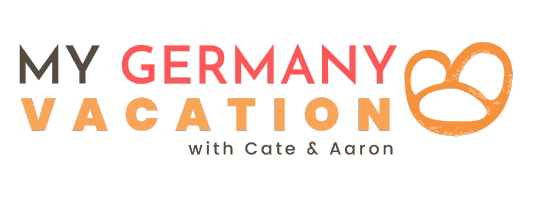
How to Plan a Trip to Germany (Your Step by Step Germany Trip Planner for Traveling to Germany for the First Time!)
This post may contain affiliate links. Read my disclaimer policy.
You’ve decided to visit Germany. Hooray! Whether you’re looking for bustling cities, sandy beaches, alpine hiking, intriguing history, fairytale castles, delicious food, fun festivals or friendly people, Germany is the perfect European vacation destination.
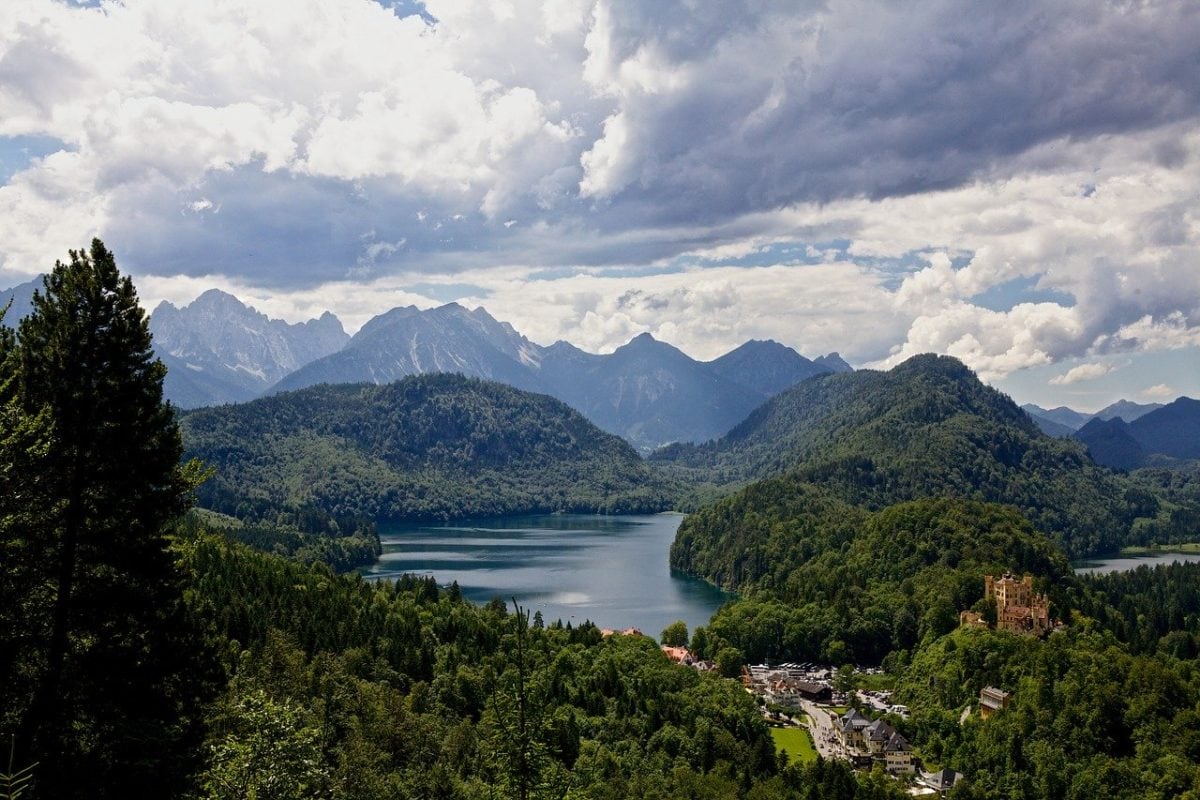
Not only is there a tremendous amount to do, see, eat, and experience in Germany, you can easily combine a visit to Germany with other European destinations. Germany is easy to get around in by train, bus, car or bike, and many people speak English.
You’re probably wondering…where do I even begin with planning my dream-come-true vacation to beautiful Deutschland?
Where should I go? Is it better to take the train or rent a car? What are the must-see cities and attractions? Which ones should I skip? Where’s the best place to stay? What should I eat and drink?
Join our FREE Germany Trip Planning Facebook Group!
Don’t worry! We’re here to help you narrow down your travel options, plan your itinerary , and book your trip with ease. It’s actually quite easy to plan a trip to Germany by yourself with the information in this article, on this site and with some help of some online booking engines.
To reduce overwhelm and help you plan your ideal vacation, we cover everything you need to know to get started planning your trip to Germany . And if you have any questions, you’re welcome to ask us in our free Germany travel Facebook community or send us an email .
Ok, let’s begin!
- 1 Meet Your Germany Travel Guides
- 2 Overview of Regions
- 3 Where to Go in Germany: Itineraries and Planning
- 4 Want more itinerary ideas? Are you a big city person? Check out…
- 5 Prefer smaller historic, picturesque cities? Check out…
- 6 What about cute little villages with “Fachwerk” (half-timber) architecture? There are so many! Here are a few ideas…
- 7 Looking forward to visiting fairytale castles?
- 8 Like islands and water? Take a look at…
- 9 What about nature, hiking, and national parks? Consider…
- 10 Passports & Visas
- 11 What’s the Best Time to Go to Germany?
- 12 Germany Booking Timeline
- 13 What’s the Weather in Germany Like?
- 14 What Time is it in Germany Right Now?
- 15 What’s the Best Way to Get to Germany?
- 16 Where to Stay in Germany
- 17 Getting Around Germany
- 18 What to Wear in Germany
- 19 My Absolute Favorite Travel Clothing Items
- 20 What to Eat in Germany
Meet Your Germany Travel Guides
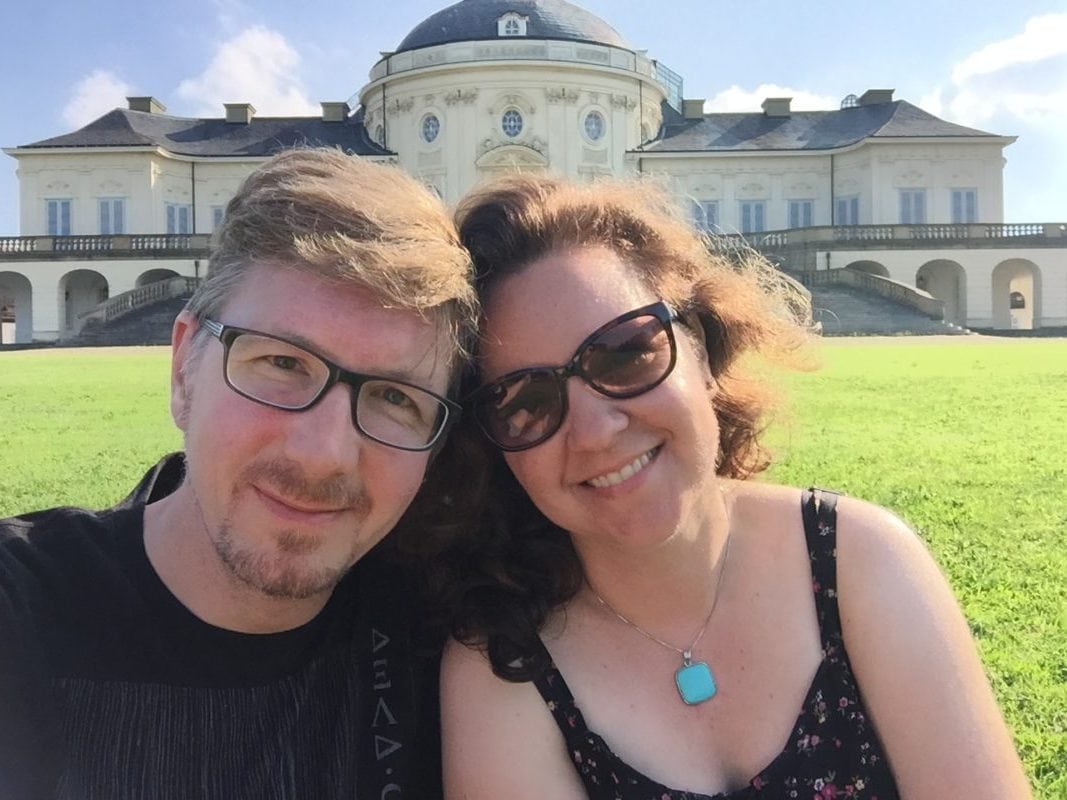
Hi, we’re Cate and Aaron, and we love helping people plan amazing trips to Germany. While Aaron has visited Germany several times (and is our chief rental car driver!), I lived there for 4+ years, have spent nearly 30 years of my life going back and forth between the US and Germany, and have traveled to all corners of the country.
I also taught German for several years and have a PhD in German Applied Linguistics, which means I’ve gotten to know Germany from several different angles. We’re so excited to help you plan your dream trip to Deutschland!
Overview of Regions
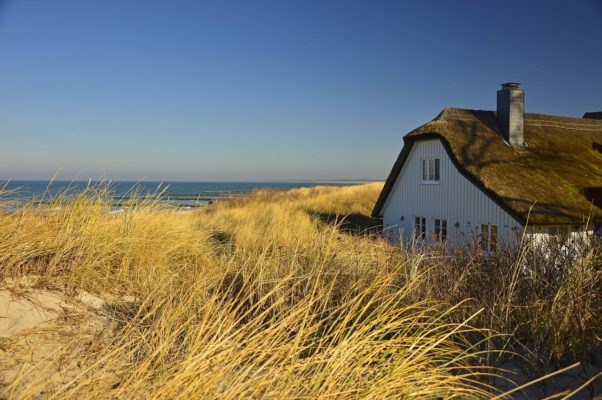
Northern Germany – Hamburg is the largest city in this region but there are other must-visit smaller cities like Lübeck , Stade, Bremen, and Lüneburg. Northern Germany also has the beautiful beaches of the North Sea and the Baltic Sea, the Wadden Sea national park, and the islands of Sylt, Flör, and Heligoland. Northern Germany is flat and great for biking. It looks so different from Bavaria! Combine a trip to Denmark with a visit to northern Germany.

Eastern Germany – Berlin is of course the feature city in this region, but Dresden, Leipzig, Magdeburg, Quedlinburg, Bautzen, Erfurt, and Weimar are smaller must-see cities. There’s also the Harz mountains, Swiss Saxony national park , Saalfeld Fairy Grottoes in Thuringia, Wernigerode castle, the Schwerin Palace, and Sansouci in Potsdam. Combine a trip to eastern Germany with a visit to Poland or the Czech Republic.

Central Germany – This region offers bustling cities like Cologne , Düsseldorf, and Frankfurt , smaller cities like Aachen, Wiesbaden, Koblenz, and plenty of cute villages. There’s also the Rhine and Mosel river areas, vineyards, the Eifel national park, castles , and beautiful rolling hills. Combine a visit to central Germany with a trip to the Netherlands, Belgium, Luxembourg, or France.
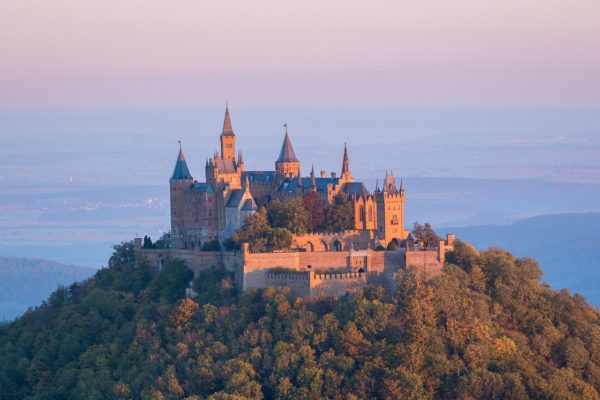
Black Forest/Baden-Württemberg – Stuttgart is the largest city in this region, and smaller cities like Baden-Baden, Heidelberg, Freiburg , Tübingen, and Ulm also warrant a visit. Vineyards and wineries, spa towns, castles (such as Hohenzollern or Lichtenstein ), waterfalls, Lake Constance, cute villages, and hiking are also features of the Black Forest /Baden-Württemberg region. Combine a trip to France or Switzerland with a visit to southwestern Germany.
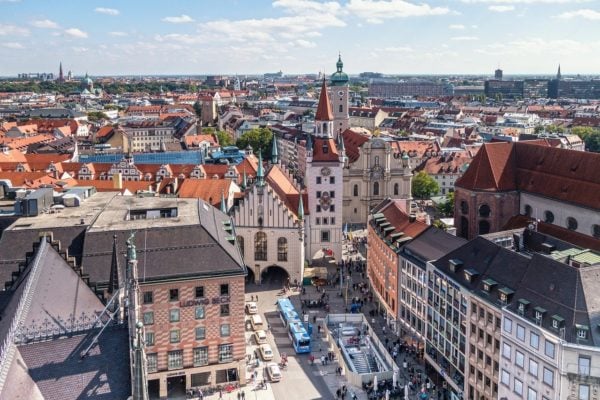
Bavaria/Alps – Munich is the feature city of Bavaria ( Oktoberfest! ), along with smaller cities like Regensburg, Nuremberg, Würtzburg, Bamberg, and Passau. There’s also the famous Zugspitze, Eagle’s Nest, Neuschwanstein castle , and Chiemsee lake, as well as lovely alpine towns like Garmisch-Partenkirchen and Berchtesgaden . Combine a trip to Bavaria with a visit to Austria, Czech Republic or Switzerland.
Click here for what to do in Munich!
Where to Go in Germany: Itineraries and Planning
There’s so much to see and do in Germany! Here’s some info to get you started on your itinerary (you can also check out this article with 10-14 day itinerary ideas ).
If you have just a few days, I recommend focusing on one city and a day trip (e.g., Hamburg with a day trip to Lübeck or Munich with a day trip to Neuschwanstein ).
If you have a week, you could visit 2 cities (plus 2 day trips) in different parts of Germany and allot one day for travel between cities (e.g., a few days in Munich with a day trip to Chiemsee, travel day to Berlin, then a few days in Berlin with a day trip to Potsdam). Or you could spend a week touring one region of Germany (e.g. the Black Forest or the Rhine and Mosel areas).
If you have two weeks, you can see a lot of Germany! You could, for example, start in Berlin, then visit Hamburg, take a day trip to Lübeck , then visit the Rhein river area, stop in the Black Forest , and end your trip in Munich. You could easily do this trip via train or car. Take a look at a couple 10-14 day itineraries we’ve outlined to give you a sense of how much you can do in that amount of time.
Grab our FREE Germany Trip Planning Checklist Now!
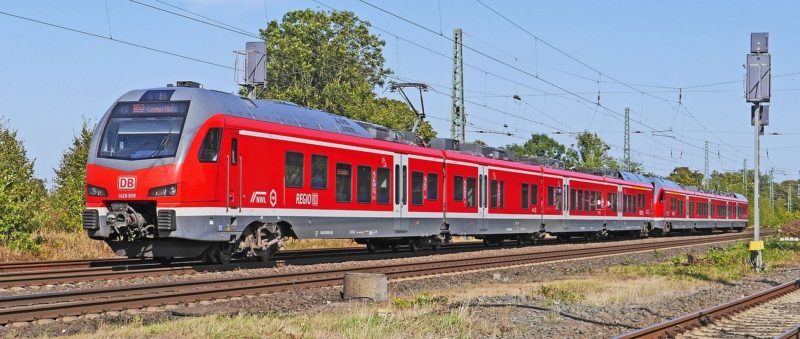
How long does it take to travel around Germany by train?
It’s quick and easy to travel around Germany by train. Here are some sample travel times to give you an idea:
- Berlin to Hamburg – 1 hour 45 minutes
- Berlin to Munich – 4 – 4 1/2 hours
- Hamburg to Lübeck – 1 hour
- Hamburg to Cologne – 4 hours
- Hamburg to Munich – 5 hours 40 minutes
- Frankfurt to Nuremberg – 2 hours
- Stuttgart to Munich – 2 1/4 hours
- Munich to Berchtesgaden – 2 hours
I use and recommend the official German rail system website to check travel times and book train tickets (point-to-point, saver tickets, and discounted regional tickets). I book all of our train tickets here!
Want more itinerary ideas? Are you a big city person? Check out…
- Cologne / Düsseldorf
Prefer smaller historic, picturesque cities? Check out…
What about cute little villages with “fachwerk” (half-timber) architecture there are so many here are a few ideas….
- Wernigerode
- Quedlinburg
- Dinkelsbühl
- Rothenburg Ob der Tauber
- Berchtesgaden
Looking forward to visiting fairytale castles?
- Neuschwanstein & Hohenschwangau (the “Disney castle”)
- Castles near Frankfurt
- Castles near Cologne
- 16 castles to visit in Germany
Like islands and water? Take a look at…
- Husum (North Sea)
- Timmendorferstrand (Baltic Sea)
- Lake Constance (Bodensee)
- Titisee
What about nature, hiking, and national parks? Consider…
- Schleswig-Holstein Wadden Sea National Park
- Hamburg Wadden Sea National Park
- Lower Saxon Wadden Sea National Park
- Jasmund National Park
- Western Pomerania Lagoon Area National Park
- Müritz National Park
- Lower Oder Valley National Park
- Harz National Park
- Kellerwald-Edersee National Park
- Hainich National Park
- Eifel National Park
- Hunsrück-Hochwald National Park
- Saxon Switzerland National Park
- Bavarian Forest National Park
- Berchtesgaden National Park
- Black Forest National Park
How about a road trip? Why not drive the…
- German Timber-frame Road (northern to southern Germany)
- Romantic Road (Bavaria and Baden-Württemberg, north/south)
- Castle Road (Bavaria to Baden-Württemberg, east/west)
- Wine Road (Palatinate wine region, north/south)
- Fairytale Route (from Hanau to Bremen, south/north)
- Black Forest High Road (Baden-Württemberg, north/south)
- Alpine Route (Baden-Württemberg to Bavaria, east/west)
- Volcanic Route (Rhein River and Eifel mountains, north/south)
Passports & Visas
If you’re from the US, Canada, Australia, New Zealand and many other countries, you do not need a visa to enter Germany (at the time of publishing this article). You do, however, need a valid passport with at least 3 months validity AFTER your planned departure date.
Play it safe and have MORE than 6 months validity on entrance to Germany! You also need at least 2 blank passport pages at the time of your arrival. Check your passport NOW so you have plenty of time to renew it if needed. Do not wait until the last minute to do this (been there, done that – it’s expensive and stressful)!
Germany is part of the Schengen zone, which means you can stay in Germany for up to 90 days without a visa. If you visit other countries in the Schengen zone before or after Germany, that counts towards your 90 days and reduces the amount of time you can spend in Germany. While on the automatic 90-day tourist visa you may not work but you can engage in business.
What’s the Best Time to Go to Germany?
The best time to visit Germany is whenever you can get there! No, seriously! There’s no best time of year for your Deutschland tour because there’s no bad time of year to visit. I’ve traveled all over Germany in spring, summer, fall, and winter and enjoyed every single season (Cate here, writing this article, by the way).
When should you travel to Germany? Well, it just depends on what you’re looking for…
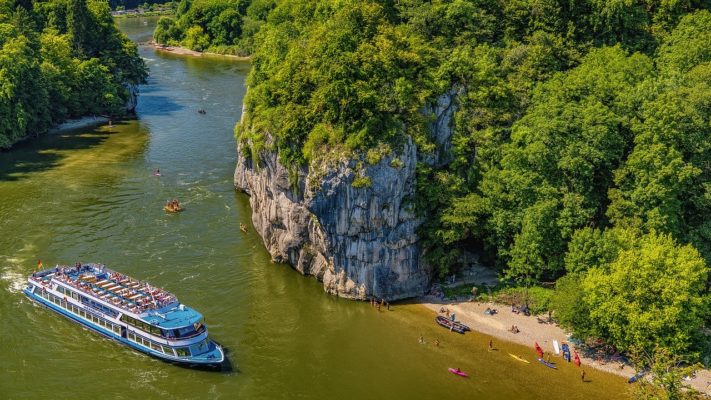
Summer is when you’re most likely to have warm (even hot) sunny weather. But it’s not guaranteed. I’ve had hot steamy summers in Germany (like last summer when we traveled during a heat wave), cold rainy summers, and everything in-between.
Fortunately, even if you encounter rain in the summer it likely won’t last more than a few hours or at most a couple days before you’ll see the sun again. The benefit of summer travel is that you’ll have nice long days for sight-seeing because the sun doesn’t fully set until about 10pm. If you’re interested in beaches or mountains, summer is a great time of year to visit.
Note, however, that not all hotels, cars, and restaurants use A/C. If you really hate hot weather, play it safe and avoid Germany in the middle of the summer. (Although, to be honest, in all of the summers I’ve spent in Germany, there have only been a few days in the summer that I’ve found truly unbearable without A/C.) If you must have A/C, be sure to confirm that your room or rental car has it.
Summer can also be a more crowded time to travel, since so many families make use of summer break. Book accommodation early for the most options and best prices!
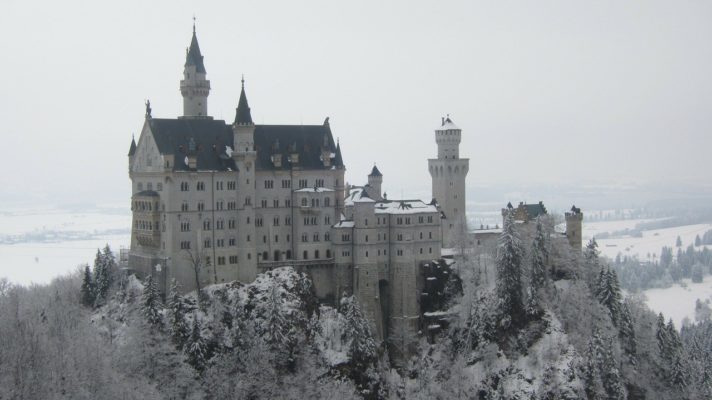
Winter travel in Germany can be cold but beautiful. One of my favorite times of year to travel in Germany is during the four weeks of advent at Christmas.
Yes, it gets dark early (by 5pm or a bit earlier) but the lights, decorations, and Christmas markets more than make up for it. Plus, you can go skiing and enjoy other winter activities.
I was just in Germany for a couple weeks in December and the weather was perfectly fine 90% of the time. There was only one day where the weather was truly miserable and even on that day there were enough breaks in the weather to enjoy my day trip exploring a new town and a new Christmas market.
Germans don’t let winter keep them from enjoying outdoor activities, hiking to strolling through a Christmas market or enjoying a coffee at an outdoor cafe. Don’t let it stop you, either! Just bundle up, grab a mug of Glühwein, and you’ll be fine!
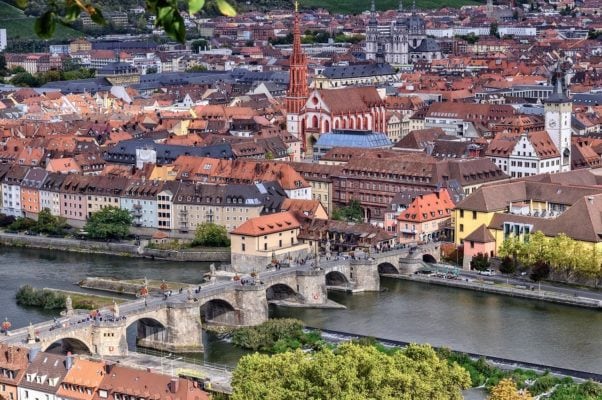
Fall and spring are also great times to visit Germany. In the fall you’ll enjoy crisp mornings and cool evenings and seeing the leaves change color.
In the spring you’ll experience the joy everyone feels when they can once again sit outside at cafes and restaurants. The weather can vary quite a bit day to day but if you travel late in the fall or early in the spring you can score great deals and will find smaller crowds.
Germany Booking Timeline
I’ve booked flights, accommodations , and tours and tickets a few weeks before my arrival, and I’ve booked them several months in advance. Book early if you:
- Are traveling during peak summer, Christmas market or ski season
- Have very specific travel dates or lodging, transportation, sight-seeing needs
- Are visiting big cities
- Are on a tight budget
- Are visiting during a special event, such as Oktoberfest
I usually start looking at my options as early as possible so I can figure out what a good deal looks like for my travel dates. I then set up flight alerts and start earmarking AirBnB’s and hotels. I begin booking whenever I find something that meets my needs and fits my budget.
Here’s a general booking timeline to get you started:
6-12 months in advance:
- Research and book your international flights
- Research travel insurance
- Plan your travel itinerary and dates
- Research and book flights within Germany or Europe
- Research travel options within Germany (rental car, train bus, etc)
- Research accommodation options (book if you find great deals or if availability is limited)
- Make sure your passport is up-to-date (you need at least 6 months left on it when you enter Germany) and apply for a new one if it isn’t
3 – 6 months in advance:
- Book accommodation
- Book trains or busses (usually 90 before your travel dates is the earliest you can book but always check if you can book earlier – the best deals go fast)
- Book rental car
- Book tours, events, and tickets
- Book travel insurance
- Review your travel wardrobe and gear and purchase the items you need
1 month in advance:
- Book any remaining attractions and tours
- Book airport transfers or plan how you will get to your lodging
- Purchase a sim card for phone or check how you can use your current phone service in Germany (e.g., I can use my Verizon phone service for a $10/ a day fee)
1 week in advance:
- Print out or ensure that you can easily access all bookings, tickets, and travel info on your phone (make sure you can access everything without data or wifi!)
1 day in advance:
What’s the Weather in Germany Like?
What will the weather be like when you visit Germany? Well, it depends on the time of year and where you are. Weather in Germany can be somewhat unpredictable no matter the time of year.
I recommend being prepared by wearing layers, packing an umbrella or rain jacket, and remembering that the weather will likely change soon. And, as I said earlier, don’t let any kind of weather stop you from enjoying Germany!
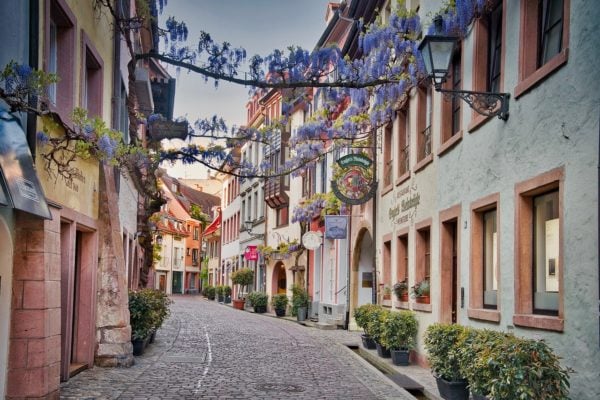
Summer. Germany comes alive in the summer with everyone and their dog (literally, there are dogs everywhere) outside enjoying the nice weather. Average high in the summer is 80F.
Be warned…it can rain in the summer but it doesn’t usually last that long. It can also be super hot in the summer…but again, scorching temperatures doesn’t usually last that long.
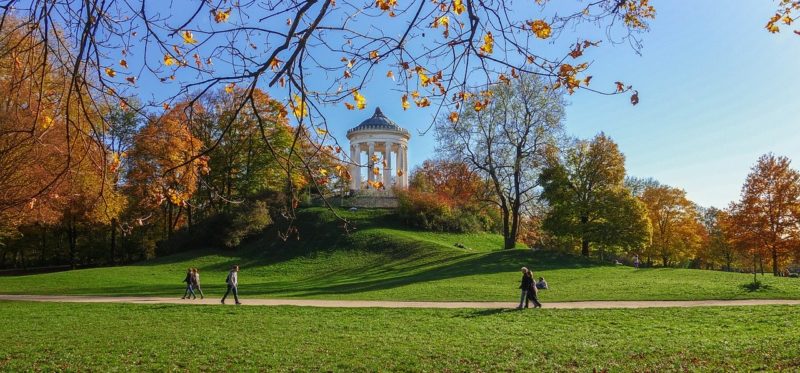
Fall. Such a beautiful time of year in Germany with the leaves changing colors and cool, crips mornings and evenings and warm days. One of my favorite times of year in Germany! In September, the average high is 67F and by November it’s around 47F.
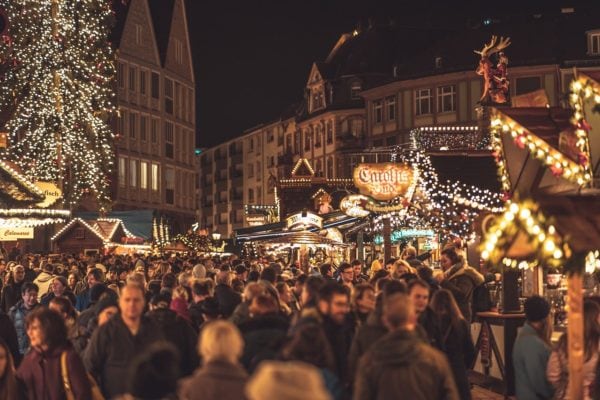
Winter. Bring your scarf, hat, and mittens because German winters can get cold! Average temps hover around freezing with warmer days in the 40s/50sF. While it can snow anywhere in Germany, you’ll find the most snow in southern Germany. Winter weather doesn’t mean everyone hides inside, though. On the contrary! Do what the Germans do – bundle up and enjoy the outdoors.

Spring. I love being in Germany on the first spring day because everyone heads outside to enjoy the sun and everyone is in such a good mood! Early spring will see a high around 47F but by late spring it’s more like 67F.
What Time is it in Germany Right Now?
Germany is in the Central European Time zone (CET) or UTC+2. It’s 6 hours ahead of the US EST, 7 hours ahead of CST, 8 hours ahead of MST, and 9 hours ahead of PST.
Daylight savings in Germany in 2020: time “falls back” on October 25 and “springs forward” on March 29. Write these dates in your calendar so you don’t accidentally miss any flights or trains (been there, done that)!
What’s the Best Way to Get to Germany?
It depends on where you’re coming from and where you’re going. When flying from outside Europe, many people fly into Frankfurt (FRA), the largest airport in Germany and one of the largest and busiest airports in Europe.
The benefit of flying into Frankfurt is that it has a ton of direct flights, and once you reach Germany you can easily take a commuter flight, train, bus or rental car to your final destination.
The downside? The airport is huge, busy, and I’ve noticed prices into Frankfurt have been higher than regional airports in Germany.
I used to always fly into Frankfurt , and then take a train, bus or rental car to my final destination. But recently? I’ve found that it’s easier (and sometimes cheaper) to bypass FRA and fly into other German cities, such as Munich , Hamburg , Berlin , Düsseldorf ( Cologne ) or Stuttgart .
You might even be able to find a direct flight from the US (I’ve flown direct Atlanta – Stuttgart and Washington DC – Munich, for example). Otherwise, you’ll change planes somewhere in Europe and take an easy 1-3 hour flight to Germany. We’ve changed planes in London, Amsterdam, Stockholm, Paris, and Vienna, for example. You could also fly into another European city and then take a train, bus or rental car into Germany.
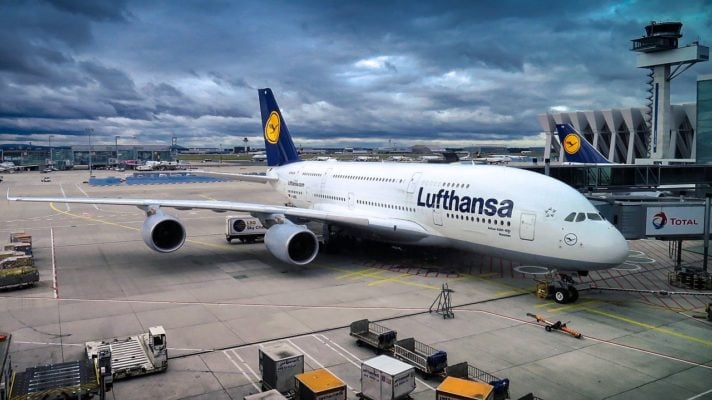
A Few Notes About Flying Into FRA (Frankfurt Airport) and Traveling Onwards
If you take a commuter flight from Frankfurt (FRA) to your final destination in Germany, you’ll go through passport control in FRA and then to your connecting gate. Super easy. Most flights from FRA to elsewhere in Germany are an hour or less in duration.
If you’re traveling onward by train from Frankfurt, you can transfer to the train right at the airport below Terminal 1. If your train leaves from the main station in Frankfurt, you can either take the S-bahn or a regional train from the airport to the Hauptbahnhof (main station) in about 10-15 minutes.
Important: you’ll find cheap “savings fare” train ticket prices if you book your ticket online well ahead of your arrival. Be sure to book your ticket for at least a few hours after your flight’s arrival time into FRA.
Be warned: getting through passport control, customs, picking up your checked luggage, and making your way to the train station can take longer than you think. And if your plane from the US (or elsewhere) is delayed…well, it’s easy to miss your train and have to buy a new, much more expensive ticket on the spot. Personally, I would book a saver fare train ticket for a train that leaves 3-5 hours after my international flight’s arrival time – at the minimum. And that’s still cutting it close if there’s any kind of delay!
Tip: If you want maximum flexibility and peace of mind, buy a “flex ticket.” You’ll pay more but these tickets aren’t tied to a specific train. So if your flight is five hours late, you can take a train later in the day without changing your ticket or losing money.
These tickets also you to stop somewhere en route to your final destination for a couple hours, and then get back on a different train (e.g., stop in Stuttgart for a couple hours on your way to Munich). So if you arrive on time, you can work in a short excursion on the way to your final destination (store your luggage at a locker in the train station). If your flight is late, just go directly to your destination. These tickets are also refundable before the first day of travel.
For ultimate flexibility and peace of mind, spend the night in or around Frankfurt and book a saver fare train for early the next morning.
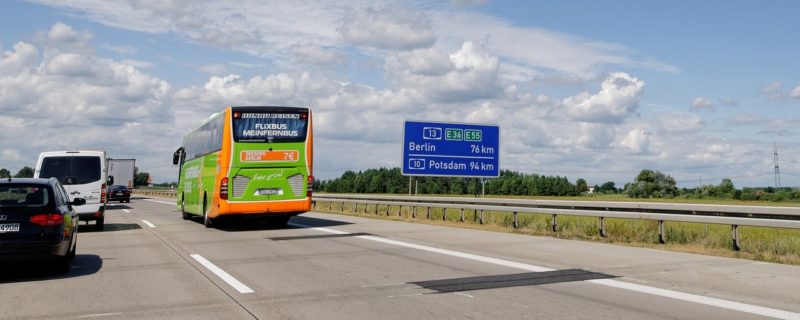
You can also easily pick up a rental car at FRA and drive to your final destination. Aaron and I have done this a few times and never had any problems.
The one problem we do have? Staying awake long enough to drive to our destination! We usually keep the driving distance to an hour or two on the day of our arrival and drink a lot of coffee. Sometimes we pull over at rest area and take a nap.
If you want to rent a car at the airport and are concerned about driving while jet lagged, consider picking up the car and then spending the night in nearby town, such as Wiesbaden (I spent an enjoyable few days there before catching my flight home a few years ago).
If you’re catching a bus from the city center to travel onwards, S-bahn 8 or 9 will zip you into town quickly and cheaply in about 10-15 minutes. Buy tickets at any of the ticket machines before you board the S-bahn.
You can also catch busses into Frankfurt and elsewhere in front of Terminal 1 (arrivals level) and Terminal 2 (level 2).
You’ll find taxis in the same general area. It takes about 20 minutes to get into downtown Frankfurt by taxi.
Flying to Germany from Elsewhere in Europe
These days it’s super easy and generally inexpensive to fly to Germany from all over Europe. Here are a couple tips:
When booking your international flight, you might be able to include a stop-over in the city where you’ll transfer to your Germany flight. I used to do stopovers in London, and a couple years ago I did an awesome stopover in Iceland. TAP also offers free stopovers in Lisbon or Porto.
I highly recommend looking into both flying and taking a train (or bus) into Germany, especially if you’re arriving from a neighboring country and not on a stopover. Of course, if you’re flying from cities like London, Barcelona, Rome or Oslo, flying is the best option. But if you’re traveling from Paris, Vienna, Copenhagen or Prague, for example, a train might be the better way to go.
Even if the actual flight is only an hour, you have to factor in the time it takes to travel to the airport, go through security, potential flight delays, and then traveling to your lodging once you land. A 5- or 6-hour train ride might actually take less time than a 1-hour flight when you total it all up!
Traveling to Germany By Train, Bus or Car
Traveling to Germany from other European countries by train, bus or car is easy. Train travel is generally simple, comfortable, and quick. Most train stations in Germany are located in the city center, so it’s easy to get to your lodging via taxi or public transportation.
If renting a car in another country, just double check that you’re authorized to take the car out of the rental country. If you are, you’ll have no problems crossing the boarder and driving around Germany.
Busses tend to cost less than trains, and you can find some amazing deals, but to be honest, I still prefer taking trains over busses. Trains are more comfortable, you can get up and walk around, and they’re almost always faster than busses. Plus, they don’t get stuck in traffic.
Tips for Booking the Best Flights with Cash or Miles:
- Start looking for flights early, especially if you’re traveling during peak season. I booked our mid-June flights in late January. While we found low mileage flights for very specific weekend travel dates, we could have found better flight times had we booked even earlier.
- Track flights through google or look at options in Hopper so you’ll know a good deal when you see one.
- Look for last-minute deals. When I decided to go to Germany in December I didn’t start looking for flights until early November (the trip was a last-minute decision). Because I was flexible on travel dates and went early in the month, I found excellent tickets using miles. This doesn’t always happen, but it never hurts to look for deals, even if your travel dates are right around the corner.
- Fly in or out of smaller regional airports (e.g., Berlin , Hamburg , Stuttgart , Munich , Düsseldorf). When I booked our flights for mid-June I couldn’t find anything into Frankfurt using miles. But I did find flights into Berlin and out of Stuttgart, and that actually worked even better for that trip ! For my recent December trip , I found that flying in and out of Stuttgart used the lowest amount of miles and had the best schedule. I’ve also flown into Hamburg and Munich airports.
Where to Stay in Germany
Germany has so many options for lodging:
- Vacation rentals (e.g., VBRO, AirBnB)
- Hip boutique hotels
- Quirky hostels
- More traditional HI hostels
- Large hotel chains
- American-styles hotels (Hilton, Marriott, etc)
- Family-run Pensionen (bed and breakfast)
- Camping (RV and tent)
When we’re in Germany we typically opt for AirBnB (I like having a kitchen to make breakfast) or a smaller family-run Pension or boutique hotel. We used to stay in hostels when we was younger (they’re pretty nice in Germany) but even then I found Pensionen to be very affordable – sometimes more affordable than hostels – especially when traveling with one or two other people. If we’re spending the night near an airport or train station and want convenience and ease we’ll stay at a larger chain hotel .
Whether you’re looking for luxury or budget accommodations, you’re sure to find what you’re looking for in Germany! To help you get started, check out our Germany hotel guides.

Breakfast is often included with lodging in Germany (but not always). Sometimes breakfast will feature fresh bread or Brötchen (delicious German rolls), cold cuts and cheese, butter and jam, and tea and coffee. Other times there will be an extensive breakfast buffet that includes things like yogurt, museli, a variety of breads, meats, cheeses, and even hard-boiled eggs. You’re unlikely to find things like omelets, bacon, pancakes, waffles, and hot oatmeal.
If you’re looking to save money on lodging, book rooms with a shared bathroom. (This is typically only an option in smaller or older hotels and not an option I come across as often anymore.) Sometimes that will mean sharing a full bathroom with other guests on your floor, and other times you’ll have a sink and/or shower in your room and will share a toilet located in the hallway. Shared bathrooms are more common in smaller Pensionen than in hotels.
These days I prefer the convenience of having a full bathroom in my room but I’m not averse to sharing a hall bathroom when needed (takes me back to my younger backpacking days – ha!). I’ve never had to wait to use a shared bathroom or had any trouble with them. Sometimes there are two or more bathrooms per floor. If you do opt for a shared bathroom, bring flip-flops!
Hostels can be a great option for families, as many offer family rooms. Hostels typically offer a simple breakfast and sometimes dinner. While accommodations are simple, some hostels can be in spectacular locations. The hostel in Bacharach, for example, is in an old castle on a hill and offers a gorgeous view of the town below and the Rhine river!
Getting Around Germany
One of the benefits of traveling in Germany is that it’s super easy to get around the entire country. You have so many transportation options.
You can rent a car and drive from place to place. Or you can stick to trains and busses. Or ride a bike – there are tons of bike paths throughout Germany.
If I’m primarily visiting big cities I prefer taking the train or a bus to get from one city to another. When I spend more time in smaller cities or want to take day trips to harder to reach places, I prefer having a car.
For our recent summer trip to Germany, we rented a car at the Berlin airport and returned it to the Stuttgart airport. We didn’t take trains or busses at all. We got a car so we could go to places that aren’t as easily (or quickly) accessible by train. We didn’t use the car every day, though. We walked and used public transportation when exploring cities.
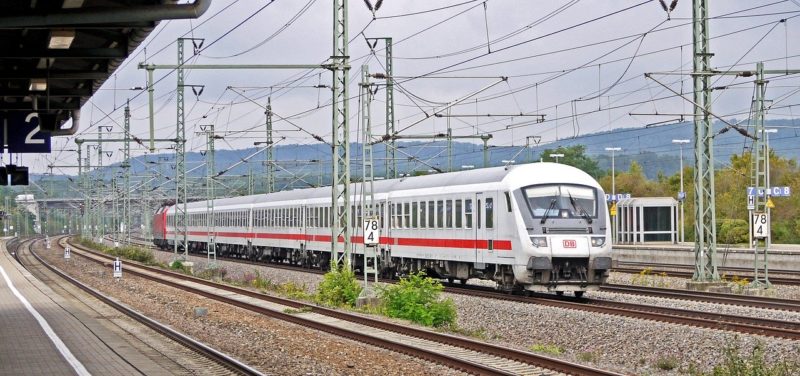
Speaking of public transportation, Germany’s is one of the best! It’s super easy to get everywhere you want to go via the S-bahn (above ground metro), U-bahn (underground metro), Strassenbahn (street car), and city bus. Taxis (and Uber/Lyft, where available) are also convenient options, though more expensive than public transport.
There are also car-share programs that you can look into. I haven’t used any of them and don’t know how convenient they are for travelers but it doesn’t hurt to check them out.
German cities are very walkable, so it’s easy to get around by foot. And, if you’d like to bike around like a local, there are lots of places to rent bikes (or scooters!) around town or maybe even at your hotel or AirBnB. If you’re more interested in just one afternoon of biking, try a city bike tour!
A few transportation tips:
- For the best train ticket prices book your ticket via the official German rail system website in well in advance. I book all of our tickets there. Note: if you pre-purchase your ticket at the lowest price you have to take the specific train you booked. If you miss that train, you have to buy another ticket.
- If you don’t mind taking slower regional trains you can get some really cheap tickets and regional day tickets. You may not want to use these tickets to go from Munich to Hamburg, but they’re great for day trips, whether traveling solo or with others.
- Busses are often less expensive than the train (though not quite as comfortable and often slower).
- There are Eurail options for Germany, and they’re a great choice if you value flexibility and ease or if you want to make stops while traveling (eg., stop in Cologne for a couple hours while traveling from Hamburg to Munich).
- If you plan to rely on public transportation in the cities you visit, buy a day pass (or perhaps a multi-day or week pass) rather than individual tickets. Also check to see if there are group day tickets or if young kids can ride free. Note: there’s often a small additional fee to bring a bike or a large amount of luggage on public transportation. There are often less expensive day passes for travel starting after 9am.
What to Wear in Germany
Check out my packing list for Germany!
Layer, layer, layer! The weather in Germany is often unpredictable so your best bet is to bring layers so you can customize your wardrobe on the fly. Since rain is a possibility any time of year, you may want to bring a light rain jacket or an umbrella.
Bring comfortable shoes. You’ll no doubt walk all day long (often on cobblestone), so bring your most comfortable, supportive shoes. Be sure to break in your shoes before you travel. There’s nothing worse than realizing a day into your trip that your shoes pinch your toes or give you huge blisters. (Bring along moleskin, just in case. I always have this kind in my day bag!) I typically bring a good pair of walking shoes appropriate for the season (e.g., boots in the winter) and a nicer pair of flats (sandals in the summer).
You can wear jeans. Some people say never travel with jeans but I’m not one of those people. I love traveling with jeans! They’re comfortable, I can wear them a few times without having to wash them, and I feel less like a tourist wearing them because everyone wears them. If you like jeans, wear jeans.
Scarf, hat, gloves. If you’re traveling in the winter or even late fall or early spring, definitely bring a warm scarf, hat, and gloves or mittens. Or buy them in Germany and take them home as a souvenir! Almost all of my winter accessories are from Germany. Even if you’re not traveling in colder weather, I recommend a travel scarf with a hidden pocket for ease and security.
You can wear shorts in the summer. Shorts are more popular in Germany than they used to be, so if you like them and are comfortable in them, wear them. That said, do also bring summer dresses or skirts and or lightweight pants to wear when shorts are too informal.
Bring a comfortable day bag or purse. When you’re out and about all day you want a comfortable bag or purse to hold your travel essentials – wallet, phone, camera, ipad/kindle/book, umbrella, journal, etc. For peace of mind, you may even want one with special security features. Click here to read my guide for buying the best travel purse.
My Absolute Favorite Travel Clothing Items
Merino wool camisole/tank – These camisoles are the BEST for travel! They’re soft, comfortable, easy to hand wash, and they never stink. This might be TMI but a few years ago, when I was traveling solo around Europe, I wore the same merino wool tank each day for 14 days in warm spring weather. It never smelled bad! Since that experiment I don’t typically go that long without washing my tanks, but I like knowing that I could! Click here to read more reviews and buy a merino wool camisole/tank.
Foldable flats – I splurged on a pair of foldable leather flats a few years ago, and after I broke them in I started really liking them. I wouldn’t recommend them for a full day of walking (especially on cobblestones) but I like to bring my foldable flats along for a change of pace or when I want the option of wearing a cute pair of shoes but don’t want them to take up much space in my suitcase.
Merino wool shoes – I bought a pair of dark grey merino wool walking/tennis shoes a couple years ago and I LOVE them! I can wear them barefoot in the summer, and not only do my feet stay relatively cool, my shoes don’t stink when I take them off at the end of the day. I can throw them in the wash if they get dirty (though mine still look great 2 years later), they pack flat and don’t take up much space in my suitcase or travel backpack, and the heel is thick and cushioned. You can also buy replacement merino wool insoles without having to buy a new pair of shoes.
What I don’t like: the pair I have doesn’t have enough arch support for me and there’s not enough padding under the ball of my foot. The first few times I wore them they were uncomfortable after walking all day and I was super disappointed! But after adding an arch support and a gel insert under the ball of my foot (I like this one ) I loved them and now wear them all the time while traveling and at home. Many people love them from the start! Click here to to read reviews and check out merino wool shoes.
What to Eat in Germany
You’ll never go hungry while traveling in Germany! While you can always find traditional items like Schnitzel, Spätzle, Rouladen, and Bratwurst, there are plenty of healthier options, including those that are vegetarian, vegan, and gluten-free.
Many restaurants now cater to special diets and accommodate allergies, as do some specialty grocery stores. Aaron has a meat allergy and frequently eats gluten-free and has never had a problem finding delicious food in Germany.
These days Germany has a wide variety of restaurants to ft all budgets featuring cuisine from all over the world (except Mexican…I’ve yet to find good tacos in Germany). So you won’t be stuck eating Schnitzel every day – unless you want to!
We usually eat breakfast at our AirBnB or hotel, enjoy a nice lunch at a restaurant we’ve stumbled upon, and then grab a Döner, salad or pizza for dinner. We also often picnic using ingredients from the bakery and grocery store or farmer’s market.
Traditional German dishes to try: Schnitzel, Spätzle, Rouladen, Bratwurst, Sauerbraten, Schweinehaxen, Maultaschen, Currywurst, Leberkäse, Flammkuchen, Sauerkruat, Kartoffelsalat (potato salad), Quark, all kinds of German breads.
Quick lunches and snacks on the go: Döner, Falafel, Bratkartoffeln (fried potatoes), Kartoffelpuffer (potato pancakes), Bratwurst, Currywurst, salads, Brötchen filled with meat and/or cheese, fresh pretzels, pastries, cakes. Click here to see the best German street food!
Desserts & sweet treats: Schwarzwälderkirchtorte (Black Forest Cake), Bienenstich (Bee Sting Cake), cheesecake, Stollen, Frankfurter Kranz, cake, Donauwellen cake, Berliner, Lebkuchen, Pflaumenkuchen (plum cake), all kinds of pastries and chocolate – just to name a few! Click here to see the 10 must-try German desserts and sweets.
Beer: every kind you could ever imagine! I usually just ask for the local beer unless there’s a specific one I know I want to try.
Christmas: This is the best time of year to be in Germany, partly because of the many delicious holiday treats like Lebkuchen, Stollen, Glühwein, and so much more. Click here to read more about what to eat in Germany during the Christmas season.
Want to try German food now? Click here to see where to buy delicious German food online!
Got a question about traveling in Germany? Join our free Germany trip planning community or send us an email!
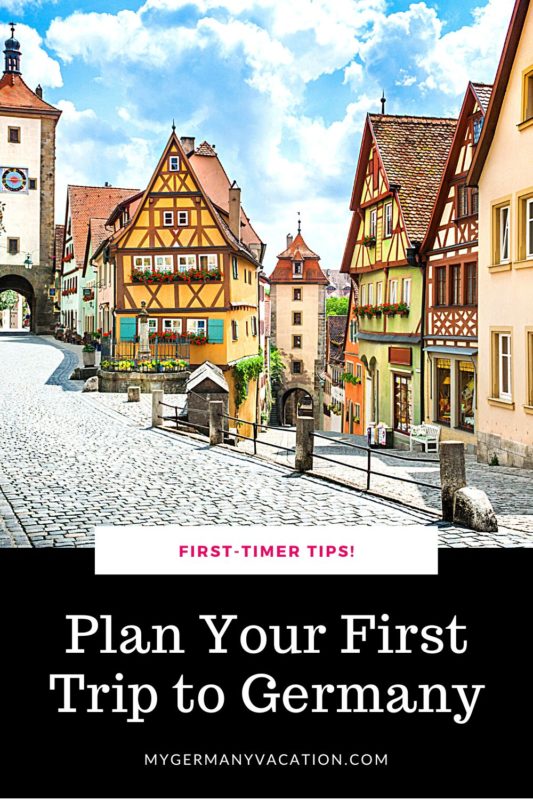
Grab your FREE 10 Germany Gems Cheatsheet Now!
Cate has been traveling to Germany for 30+ years. She has lived in Germany, taught college German, and has a PhD in German Applied Linguistics. She loves helping travelers plan their dream trips to Germany!
Similar Posts
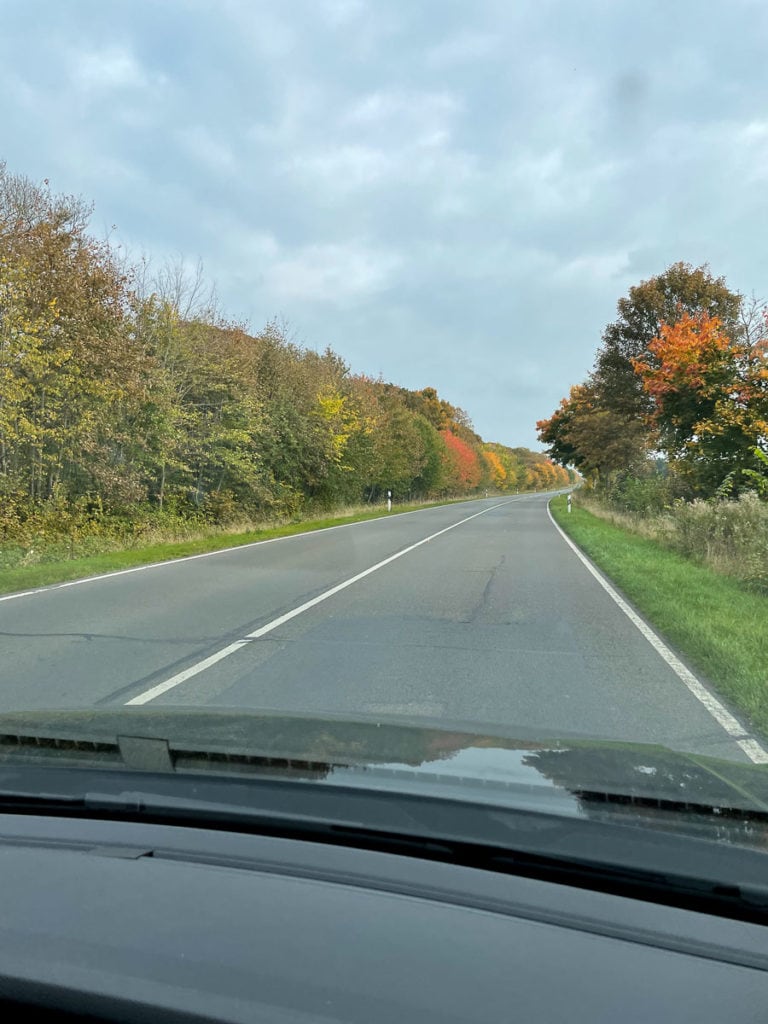
Best Scenic Germany Road Trip Ideas And Routes
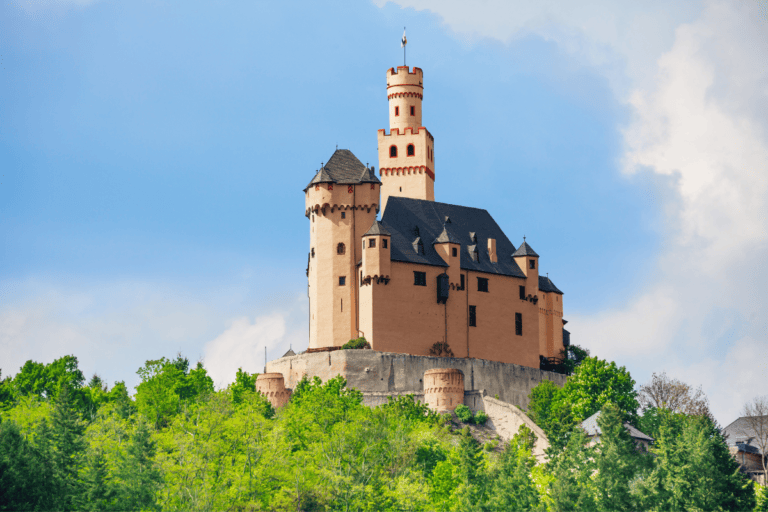

14+ Beautiful Castles Near Cologne, Germany
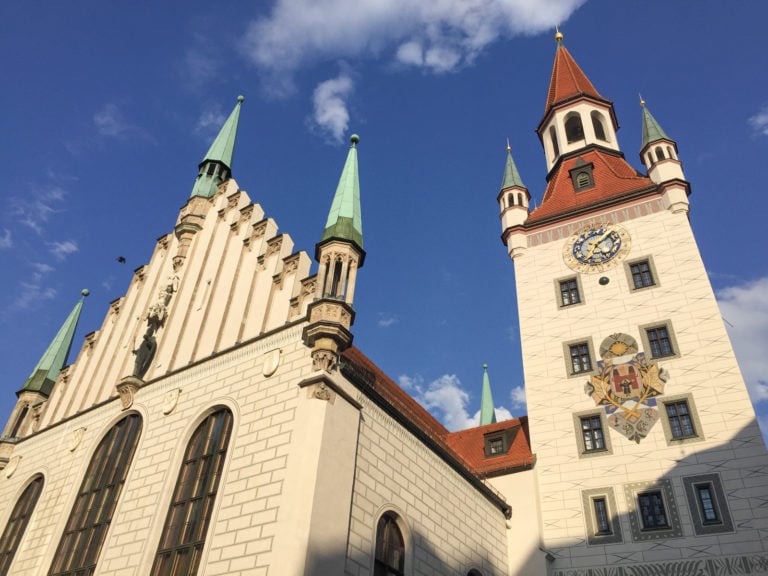
2 Days in Munich: Perfect Itinerary & Best Things To Do
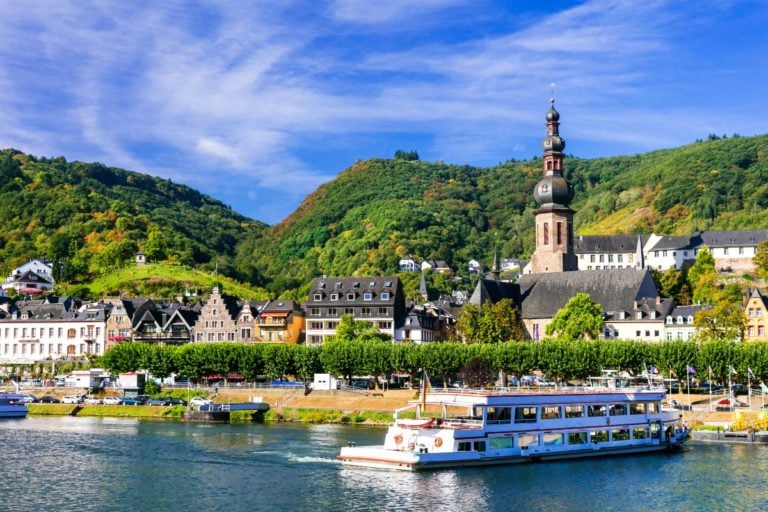
Best Things To Do And See In Cochem, Germany
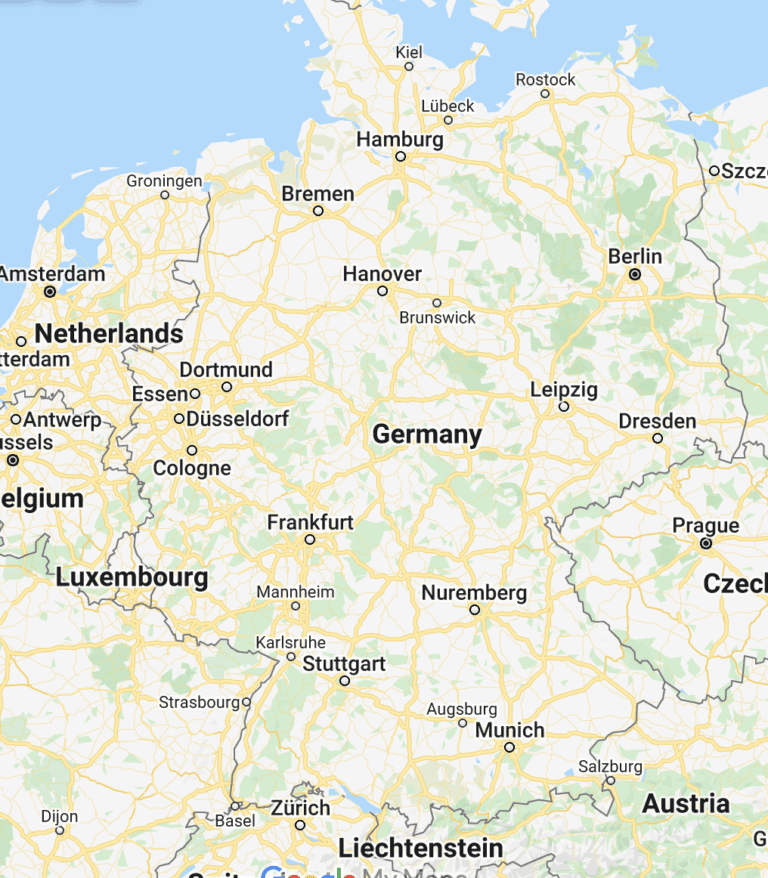
10 Days in Germany: Itinerary Ideas For the Perfect Trip
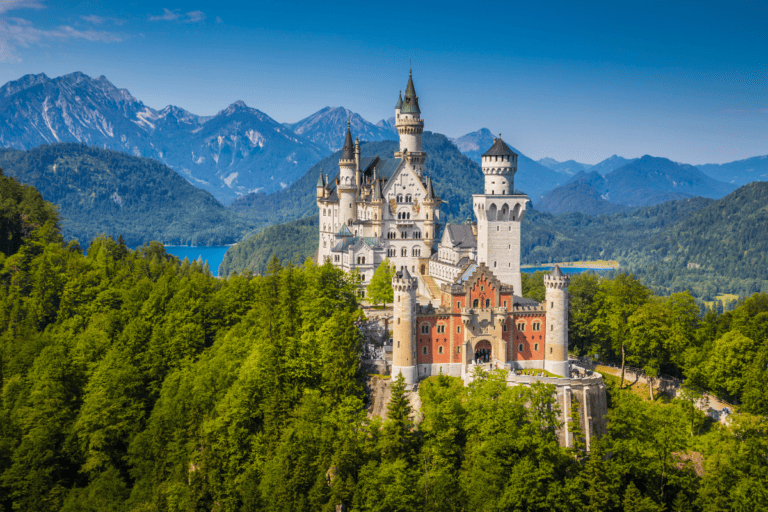
Best Hotels Near Neuschwanstein Castle & In Füssen
Here’s how we can help you plan your perfect trip in 2024.
GERMANY TRAVEL PLANNER: Just getting started? Have questions about Germany’s confusing train tickets or how to find the best guided tours? Not sure which parts of Germany should be in your itinerary (and what to leave out)? Our Germany Travel Planner answers those questions and more via how-to videos, our interactive Germany Planning Map, City Cheatsheets, and MUCH more. Click here to unlock the best of Germany the easy way!
GERMANY TRAVEL CONSULT: Feeling overwhelmed? Itinerary just not coming together? Wonder if a few tweaks would take your trip to the next level? Book a Mini or Full consult with Cate! She’ll help you create or tweak your itinerary, recommend train tickets/passes, hotels, things to do, guided tours, show you how to buy train tickets, orient you to specific cities, help you plan out day trips, and answer your Germany travel questions.
ACCOMMODATIONS: We recommend using Booking.com since they have widest range of accommodations available from hostels, boutique hotels, luxury chains, aparthotels, at the best prices. Check out our accommodation guides for specific recommended hotels.
WHAT TO PACK: If you’re bringing your phone, be sure to bring this plug adapter , this power bank , and this wrist strap . They’ve been lifesavers for us! You can see our other packing essentials here and here .
TICKETS & TOURS: For guided tours, day trips, private tours, and skip-the-line tickets, Get Your Guide is our go-to!
TRAINS & BUSES: To research train schedules and buy tickets or a Germany Rail Pass, we recommend the official Deutsche Bahn (German Rail System) website (and download their DB Navigator app). For buses, look at FlixBus , which offers tickets for routes within Germany and to other European countries. FlixBus is often cheaper than trains but can take longer.
71 Comments
I enjoyed reading this information. My husband and I would like to stay in Germany for 2 to 3 months in 2022. I am interested in staying in the area of Bamberg with the plan of visiting other regions in Germany via a rental car. Either at the end or beginning of our stay we would like to visit France (especially Paris). I have so many questions. But our hope is to have basically our last trip on our own and experience more of the everyday lifestyle. Up to this point we have only traveled via being guest of Viking River Cruise and tours.
Hi Donna! 2-3 months in Germany sounds awesome! Since you’ll be there so long, you might want to consider spending 1 month in 3 different regions or 1.5 months in 2 regions. Otherwise you’ll be doing a lot of overnight or multi-night trips if you want to see other regions. Are you thinking about renting an AirBnB? If you want to experience the everyday lifestyle, I highly recommend it. Feel free to email me if you have questions as you start planning. 🙂
Hi! Thank you for this awesome post. It’s very useful. I wanted to ask you a question. I’m planning to travel to Germany as soon as the pandemic starts to be less dangerous. I want to go to Germany for 2 months, how many cities do you think is possible to visit? And also how much money do you think is possible to use everyday for food if my budget is small? Thank you very much!
Hello! Two months is a good amount of time to visit Germany, and you should be able to see and do quite a lot! Just how many cities depends on how quickly you like to travel and what you want to do in each place (e.g., just see the highlights or live like a local). If you want to stick to big cities you could spend 1-3 weeks in each and take lots of day trips to see the surrounding area.
If that’s the case, you could rent an Airbnb (or similar), which would not only save you money on lodging (they’ll often give discounts for stays of 1 week or longer) but also make it easier to make some inexpensive meals at the Airbnb (and it’s easy to make German dishes “at home”!) and maybe even do laundry for free.
If you want to be on the go the whole time, moving from city to city (big, medium, and small), it will be more expensive unless you stay at hostels (or super cheap hotels). And remember to factor in the constant packing and unpacking, time getting to/from the train station (or airport)…that gets tiring when traveling for a couple months!
I recommend coming up with a budget, then looking at what kind of lodging fits that budget (hotels, hostels, longer Airbnb stays, Couchsurfing, etc). Then think about what you most want to do in Germany (live like a local, just spontaneously explore, see specific sights, have specific experiences, etc) and what you want your daily experience to be like (e.g., do you want to feel relaxed each day and get to know fewer places or be on the go, packing and unpacking, moving from place to place). Neither is better than the other, it’s just important to get clear on what kind of experience you want!
A few ways to reduce your budget: – Eat in fewer sit-down restaurants. Eat breakfast at “home”, buy snacks and drinks at the grocery store and bring them with you each day, cook some meals each week at “home”, pick up lunch from a grocery store or bakery and eat in a park, etc. Make eating dinner in a sit-down restaurant a special occasion. Doing these things will save you money and you’ll eat healthier!
– Take busses or slower trains to travel around Germany. There are regional train passes you can purchase that allow travel in a specific area very inexpensively. Travel will be slower and there are some restrictions on when you travel (often not during rush hour) but you’ll save money and often you’ll see some out of the way sights. You can also get good deals on flights but once you factor in travel to the airport (time and cost), time to check in, waiting to board, potential delays, and then getting from the airport to your final destination, it’s often just easier to take the train.
– Buy standard train tickets in advance. You can get nice discounts on faster train tickets if you book far enough in advance.
This might be more info than you wanted but I hope that helps you start planning your trip! Let me know if you have any other questions. 🙂
- Pingback: Europe Through the Seasons: The Best Time to Visit - Intentional Travelers
Great post full of detailed information on all aspects of travel in Germany. When travel reopens in Europe we’re planning on a 2 week trip in Germany with our adult son. He’s an avid soccer fan so we’ll need to plan the trip around the soccer schedule so he can see as many games as possible. We are considering Eastern Germany with a short trip into Poland or Northern Germany with a few days in Denmark. We’d really appreciate your expertise and suggestions. Although we’ve traveled extensively in many western and eastern European countries, we have not spent a great deal of time in Germany. Thanks. J.
Hello! I’m back working on this site now and am happy to help. I’ve got more articles and resources coming but let me know if you have any specific questions!
Hi Both The Ueckermann family 9-10 adults and 2 little once to experience Germany in Oct 2023. Central G and Netherlands will be awesome. We need to do all planning and funds estimates please assist. We live in South Africa and hopefully COVID 19 not a factor any more. Plan 2-3 weeks depending on the funds regards Engela
Hi Engela! Let me know if you have any specific questions about planning your trip to Germany. Happy to help!
HI, I was having trouble with your email 🙂 so sorry I am just replying here. I was hoping you could help us and I wasn’t sure if you offer buying tickets and guidance of our specific places we would like to visit. Anxiously wanting to hear back from you, Anne
Hi Anne! I just sent you an email. 🙂
Hello Cate! Such a well written article with great info! My husband and myself would like to travel to Germany in Oct. of 2022, possibly with my then 16 year old son as well. We want to go in October so we can also experience Octoberfest. I cant have beer because I have celiac’s. IS THERE OTHER ALCOHOL DURING OCTOBERFEST OTHER THAN BEER? WHAT IS THE WEATHER IN OCTOBER AND DOES OCTOBERFEST RUN THE FULL MONTH? IS THERE A CERTAIN AREA WE SHOULD STAY TO REALLY EXPERIENCE OCTOBERFEST AND ANY POTENTIAL ISSUES TO AVOID DURING OCTOBERFEST? We are overwhelmed with planning our trip because we don’t even travel within the US and I feel like there’s so much we want to experience in such a short period. We would like to go for 2 weeks. We want to go because both our families are from Germany. My family comes from Nuremburg (sp) and my husbands family Bavaria but we are unsure which part. This trip is important for us to try to learn about our family roots. DO YOU KNOW WHERE WE COULD GO IN GERMANY TO LEARN ABOUT OUR GENEOLOGY? We would like a more of a laid back approach to experiencing Germany. I dont want to necessarily feel rushed every single day but I do understand that some events and places we would want to visit would need to be scheduled and we are ok with that. I would like to do the Air bnb but know nothing about them. I would like less stress worrying about transportation such as missing busses. We are interested in castles, picturesque views, experiencing floating on the Rhine River perhaps. ANY SUGGESTIONS ON AIR BNB’S THAT PROVIDE BREAKFAST AND ANY IDEAS ON AREA’S TO VISIT BASED ON EVERYTHING I’VE PROVIDED? P.S……our last name literally translates to “the German”. We have had so many Europeans tell us that when they hear our name…LOL
CORRECTION: This is Lisa Nemec. My hubands family is Bohemian. We believe his family crossed over from Czech.
Hi Lisa! There are plenty of other drinks at Oktoberfest, both alcoholic and non-alcoholic, so you shouldn’t have any trouble finding something. The weather at that time of year can vary but in late September to early October it’ll likely be warm during the day and cooler in the evening. Oktoberfest is mostly held in late September but I believe it goes until Oct 2 in 2022. There are a lot of hotels and AirBnB’s within walking distance of Oktoberfest (also walking distance to downtown) but book early because they fill up quickly! You’ll also pay a premium at that time of year. Some people prefer not to stay near the main train station but other people don’t mind it.
As to where you could go in Germany to find out about your genealogy, I’d start by searching the genealogy sites online and get as much specific info as you can. You can then try a site like http://www.genealogienetz.de/index_en.html (I haven’t used it, just found it).
If you have 2 weeks, you could fly in and out of Munich and focus on Bavaria. While in Munich you could take a couple day trips to Salzburg, Berchtesgaden, Neuschwanstein, the Alps, etc. You could see a lot at a laid-back pace in 2 weeks!
AirBnB’s are great if you’re going to be somewhere for at least a few days, want a little extra space, a kitchen, etc. Even just being able to make breakfast, coffee/tea, and keep drinks cold for when you come home in the evening is so nice. But you don’t typically get hotel-like services like a prepared breakfast, new towels each day or linen changes. If you want to be walking distance to lots of things in Munich, a hotel near downtown could be a great option. If you’re ok with being in a neighborhood, an AirBnB could be a good choice. There are so many great neighborhoods in Munich so you really just need to look at price, amenities, and distance to the things you want to see. I’ve stayed at hotels near Marienplatz and in an AirBnB further away (maybe a 10-15 minute walk + U-bahn ride to Marienplazt) and I enjoyed both.
I hope that helps!
- Pingback: 12 Most Popular German Drinks & Beverages You Must Try In Germany | travel-boo | Portugal & Spain Travel Blog
HELP……I have been put in charge of coming up with an itinerary for my hubby and 4 of our friends for travel in July 2022. I truly have no idea what I am doing. What we are looking for are castles, beautiful scenery and history (although I have been told that they do not want to go to concentration camps). The following is the tentative itinerary I have come up with. We are looking also, for moderate priced Inns/quaint hotels and castle stays centrally located. Any changes/suggestions/comments would be GREATLY appreciated. We will be renting 2 cars. 1 night Munich drive to Nuremburg 3 nights Nuremburg – drive to Fussen 1 night Fussen – drive to Ettal 3 nights Ettal – drive to Unterwossen 1 night Unterwossen – drive to Salzburg Austria 3 nights Salzburg Austria drive to Munich 1 night Munich – fly home
Hi Linda! Your itinerary looks good for a 2-week trip. Here are few suggestions:
-If you’re flying into Munich, you could drive right to Nuremburg on the first day, since it’s only a couple hours drive from Munich airport. If you pick up your car, drive into Munich, settle into a hotel, and then drive to Nuremburg the next day, you’re using a lot of time for driving/checking in/unpacking/packing and you won’t get to see much of Munich. If you go right to Nuremburg on arrival day and stay for 3 nights, you could add a night to the end of your trip so you have 2 nights in Munich or add a day to Salzburg and keep Munich at 1 night.
-Fussen and Ettal are pretty close to each other so you could stay 3-4 nights in one and then take a day trip to the other. I like to reduce the number of one night stays as much as I can during 1 and 2 week trips for the reasons I mentioned above. You could also stay in Ettal and make day trips to both Fussen and Unterwossen and cut out 2 1-night stays.
-If you don’t want to see Munich, I’d keep that at 1 night and stay near the airport at the end of your trip. If you do want to see Munich, I’d give that 2 nights minimum.
I hope that helps! I think you’ll really enjoy your itinerary!
- Pingback: Can I Go to Germany Right Now? (Your COVID-19 Questions Answered) - My Germany Vacation
Thankyou for all the wonderful suggestions! I’m visiting Germany closer to Christmas for two weeks.
That’s my favorite time to be in Germany! Everything is so beautiful and festive. You might be interested in my Stuttgart Christmas Market article – even if you won’t be near Stuttgart, it will give you an idea of what you can do, see, and eat at any Christmas market. I also talk about 6 other nearby Christmas markets that are super fun to visit. 🙂 Enjoy your trip!!
I had all but given up on our delayed 25 yr Wedding Anniversary(07/28/2020 delayed to Sept 2021, due to covid) trip to Germany. Then I found your website! It reinvigorated our desire to NOT CANCEL our plans! We have a son in Kaiserslautern(rhein main air force base) , and want to split a 2 week trip between seeing 7-8 days traveling in Germany( Berlin, Munich, Cologne, and Stuttgart) and Paris. And then 6 to 7 day visiting our son. We had all but given up, until I read your article. Thanks! I wish that there were some way to have everything planned for us in advance! But, your post at least has assured us that we can make this happen on our own. Thank you very much!!
Definitely don’t cancel your plans, even if you have to postpone! (We had to postpone our anniversary trip, too – such a bummer!) You can definitely make your trip to Germany happen. Here are a few ideas for you…
You could fly into Paris, then travel to Kaiserslautern to see your son and do a day trip to Stuttgart (visit the Christmas market if you’re there in December or nearby Esslingen any time of year) and then either visit Munich and the area around there (fly out of Munich) or travel up to Cologne and over to Berlin (fly out of Berlin).
It’ll be a lot to try to see Paris, spend several days in Kaiserslautern, and also see Cologne, Stuttgart, Munich, and Berlin but if you can combine things – like if your son can go with you to visit Stuttgart and Munich or Cologne and Berlin, you could see a lot of the places you’re interested in. Flying into one city and out of another will help a lot, too.
You could also fly into Munich, then go to Kaiserslautern via Stuttgart, take a short trip to Paris, then go to Berlin via Cologne and fly out of Berlin. Or do the same but start in Berlin and fly out of Munich.
You’ll have a great time no matter your itinerary! 🙂
Your website is a such a great resource! I have a ton of questions about planning a trip, I’m just going to send you an email.
Thank you Komal
Got it and replied 🙂
We’re planning a trip to Germany at the end of February next year. What is the weather typically like during that time? Our itinerary includes arriving in Frankfurt, spending a day in Cologne, then heading to the Black Forest for about three days, followed by three days in Zurich, and returning to Frankfurt for three more days. Do you think this plan is good, or would you suggest any changes? Additionally, what places would you recommend visiting? Lastly, do you think purchasing a Eurail Global Pass is worthwhile for this trip?
The weather will likely still be cold in February but you could have some sunny days. Rain (or even snow) is always a possibility so bring an umbrella or even a waterproof jacket or shoes.
To best answer your other questions, I recommend booking either an itinerary review or a one-on-one consult in Zoom. I’ve helped hundreds of clients answer questions just like yours. 🙂 You can check out both options and read what previous clients have said here: https://www.mygermanyvacation.com/services/
I’d love to help you get your trip sorted so you have the best trip to Germany ever!
What is a good budget for 2 adults in Germany for two weeks?
It’s nearly impossible to give a guideline because it depends on so many things – your travel style, what kind of transportation you want to use, your accommodation & restaurant preferences, etc. I know that’s not very helpful in the short-term but it would be less helpful for me to give you a specific budget not knowing any specifics about you or your trip plans. Plus, most travelers like to splurge in one area and cut back in another but that’s so different for each traveler.
What I recommend is this: start looking at flights, transportation, and accommodations well before you want to book them in order to get an idea of what each costs for your travel dates. Add everything up for 2 weeks and then decide if you’re ok with that amount so far, keeping in mind you’ll still need to add on food, souvenirs, tickets/tours, insurance, and anything you need to get before you leave (clothes, luggage, passport, etc). I like to do this research before I book flights/transport/accommodations. That way I get an idea of what will be my splurge and where I will need to reduce costs to keep within the budget that’s right for me. Everyone’s ideal budget is so different!
hi i am planning to travail to Germany in December 2021 with my family , any idea
My big tip for Germany in December: visit the Christmas markets (if they’re open this year)! You’ll find one in nearly every German city, town and even small villages. They’re outdoors so dress warmly and enjoy the food, drink, and stalls. They’re a great place to pick up souvenirs and gifts, too.
Days are short in December, and some touristy sites do shut down in winter, so keep that in mind. But you’ll still find plenty to do after dark, especially if you’re in bigger cities. As long as you take these two things into consideration, you’ll have a great visit no matter where you go!
Hi, my partner and I are wanting to visit Germany in January 2022. I have previously stayed in Wurzburg for 3 weeks and dream of taking my partner there.Seeing as I went with school a few years ago we didn’t really have a chance to look around other parts of local Germany. Where would you recommend us to go whilst in that area? We like architecture (but not too much…) we’re in our 20’s so we also want to have fun 🙂 we’ll either be driving (we live in France) or we’ll be going by train. Will the Christmas markets still be on? I doubt it but you never know… Thanks
Also, we are wanting to go with our dog. Would that be possible or too complicated?
You could easily go to Munich and spend a few days there – lots to see and lots of places to have fun. (I had a great time there in my 20s!) There are also a lot of day trip options – Berchtesgaden, Salzburg, Neuschwanstein, Passau, Regensburg, etc. You could also stop in Nuremberg on your way to Munich. All of that is easy by car or by train – and if you go by train, you could probably do those day trips using a regional train pass. Or you could do guided day trips and not have to plan anything! I’ve got some listed in my Munich guide – https://www.mygermanyvacation.com/munich-travel-guide/
It looks like the Christmas markets are on for 2021 but they could always get canceled in the coming weeks. Most have their last day on Dec. 24 so unfortunately, you won’t get to see them if you visit in January. That just means planning another trip to Germany for December 2022! 🙂
Germany is pretty dog-friendly so it’s probably do-able. But there are likely museums and other sites that might not allow dogs inside. If you mostly want to spend time outdoors, and your dog is ok with possibly very cold/wet/windy weather, or if you can leave the dog at your lodging for part of the day, it might work ok.
Hope that helps!
Hi Cate, you have put together a terrific planning guide. Thanks. Our 4 children just gave us a trip back to Germany in celebration of our 50th wedding anniversary. We lived in Erlangen from Aug 1972 – 1973. We are excited to go back but we are debating between a Rhine river cruise or going on our own. We’ll probably go sometime in May/June or Sept/Oct 2022.
How exciting!! It’s so fun to go back and revisit where you used to live in Germany. Aaron and I did that in 2019 and had such a good time seeing what had/had not changed. I’m excited for you!
I’ve heard people say great things about Rhine river cruises. If you don’t have time to or don’t want to do much trip planning, that’s a great option. The downside is that you’re more limited to what you can do and see. If you have time and interest in planning your own trip, you can definitely do it. And since travel is coming back, I’ll be focusing on this site a lot more in the coming months and helping people plan their trips, so I’ll be here to help you, too. 🙂
Hi Cate, We have wanted to visit Germany (from the US) for a few years now and have finally decided to make it happen, but had no idea where or how to start. Your article is full of valuable information. Thank you. At least we now have a starting point. Our trip isn’t for another year, but it will go quickly. So excited and thank you for all the information.
You’re welcome! I’m so excited for you already. 🙂 The next year will fly by and you’ll be on a plane bound for Germany before you know it. Now that travel is coming back, I’ll be focusing on this site a lot more so be sure to come back when you’re ready to plan your trip. I’m working on lots of guides and helpful resources! 🙂
Hello. My grandfather expressed interest in going to Germany in 2022. More specifically, he wants to go to ‘The Battle of the Bulge’ where his older brother passed away in World War II. We would also like to go to the Holocaust Memorial. I have been trying to research/plan this trip but would be open to suggestions. We are from the US and could spend about a week out there. I am grateful that I stumbled across your blog as it is very informative and interesting! 🙂
Hello! That sounds like it will be a wonderful trip for your grandfather! If you’re talking about visiting the Holocaust Memorial in Berlin (highly recommended), you could fly right into Berlin (their new airport!) and spend half of your time seeing the city, then head to Brussels and take a Battle of the Bulge day tour! I found one here that you can look at (aff link): https://www.getyourguide.com/bastogne-war-museum-l35043/bastogne-battle-of-the-bulge-tour-from-brussels-t169657/?partner_id_Y5UOFLS It looks like it also goes into Luxembourg so you could get 3 countries in one trip. 🙂 If you have enough time, you could take a day trip to Brugges or Ghent – both are 30-60 minutes from Brussels. You could then fly out of Brussels back to the US. To get from Berlin to Brussels you’d probably want to fly but it’s a short flight and you could probably get an early morning or a late afternoon flight so it wouldn’t take up your whole day. Hope that helps with your planning!
Hi, your site is wonderful and has some great information! I am traveling (solo) to Germany in late April and will be there for one month. I have been to Munich/Bavaria/Salzburg before so I’d planned on focusing my trip on the rest of Germany. I’m flying into Berlin and was planning on staying there 4-5 nights, then I’m not sure where to go. I was thinking of spending a week in an area and going on day trips; for example, the Black Forest, the middle Rhine area, maybe Harz Mountain. But I also want to see some cities like Cologne, Frankfurt, Heidelberg, Trier, and Hamburg. So maybe a bit of both cities and countryside? Do you have any thoughts? Thanks!
I definitely recommend choosing 3-4 locations where you can stay for a week or so and then take day trips. You could do longer stays in Berlin and Hamburg – there’s tons to do and see in each city, as well as lots of day trip options. You could also do Cologne or try a smaller town on the Rhein or Mosel and explore that area in more depth. For the Black Forest you could stay in the university town of Freiburg and day trip to towns/hiking in the Black Forest, as well as Basel and Colmar/Strassbourg). You could also choose 3 locations for longer stays (e.g., Berlin, Hamburg and Freiburg) and then do a couple of 2 or 3-night stays as you travel between cities, e.g., a short stay in Wernigerode or Quedlinburg (Harz mountains), Trier, Heidelberg, Stuttgart, or Tübingen on your way to Freiburg. Tip: if you want to do a lot of day trips, make sure you stay where it’s fairly quick and easy to get to the train/bus station! Since you’ll be there for a month you have lots of flexibility and plenty of time to do and see a lot of the areas you mentioned!
@Cate, Thank you so much! I’m really enjoying going through your site, too!
Looking for a good travel guide book for Germany any recommendations?
Rick Steve’s is always a good one! I’ve used his guidebooks a ton. You can get his Germany guidebook on Kindle or as a hard copy (aff link): https://amzn.to/33z7d59
@Cate, Thanks
So excited to find your site! My husband and I will travel from Texas to Bavaria for 7-10 days in September. I am in charge of all the planning. I’m thinking Munich & surrounding area and Salzburg. Do you have any suggestions? I’m also pondering some organized day tours..
Munich is a wonderful home base for seeing lots of great sites in Bavaria! You could easily spend 1-3 days in Munich (especially if you’re there during Oktoberfest) and then take day trips to places like Neuschwanstein, Garmisch-Partenkirchen, Salzburg, Linderhof, Chiemsee, Berchtesgaden, Nuremberg…just to name a few! You can easily do all of that by train and mix it up with some organized day tours here and there. I’ve been working on a Munich guide that will have ideas for day trips and tours so keep an eye out for that!
Hello Cate, Your blog is very helpful. Like to seek your help and guidance. I am from Singapore and not familiar with Germany. Both me and my wife intend to fly to Amsterdam where my daughter is attending university and spend 18 days vacation with her in Europe during her break. Am planning 7 days touring Germany. Tentatively looking tourist site at hamburg, Berlin, Stuttgart and then off to another country eg. france, switzerland or Italy for another 7 days. then travel back to Amsterdam to fly home. Any advise how we can optimize the traveling as we are not familiar with these region? Appreciate your kind assistance. regards, Perry
It will be so much fun to travel with your daughter! It might be difficult to fit Hamburg, Berlin and Stuttgart into 7 days. On the train it takes about 6 hours from Amsterdam to Hamburg, 3 hours from Hamburg to Berlin, and over 8 hours from Berlin to Stuttgart. While all three of those cities are amazing, I recommend choosing either northern or southwestern Germany, rather than trying to hit all three (or make the Germany part of your trip 10 days).
You could, for example, travel from Amsterdam to Hamburg, then to Berlin, and fly from Berlin to France or Italy. That would give you plenty of time for travel, city exploring and day trips.
Or take the train from Amsterdam to Stuttgart and explore that area. Stuttgart is close to France, so you could spend several days seeing both southwestern Germany (Stuttgart, villages in the Black Forest, Freiburg, Baden-Baden, etc) and French cities like Strassbourg, Colmar and Mullouse. You could also very easily go to Basel in Switzerland! It’s a long train ride from Amsterdam to Stuttgart so I’d look into flights. Stuttgart is a great airport to fly into!
Hi, my family and I would like to visit Germany this summer. My husband and I have two teenagers (15 and 13), and one of them is reads a lot and it is very interested in history. We would like to visit german cities but also, some concentration camps. Our plans is to spend two weeks there. Any suggestions?
You’re going to have so much fun in Germany! Everywhere you go there’s so much history, so it just depends on what kind of history you’re looking for. For a 2-week stay you could easily visit 2 (maybe 3) different parts of Germany without feeling like you’re spending your whole vacation on the train or in the car. You could, for example, fly into Munich, visit the city and Dachau concentration camp, take a few day trips to Salzburg, the Alps, Neuschwanstein, Nuremburg, etc – there are so many options!…then visit the Black Forest area, the Rhein/Mosel area, the Hamburg area or the Berlin area and fly out of that second city (Stuttgart, Cologne/Düsseldorf, Hamburg or Berlin). If you want to focus on 2 main areas, say Munich and Berlin, you could do a 1-2 night stopover in a city in-between. Hope that helps you get started on your planning! 🙂
@Cate, We are from USA planning on attending next years NfL game if possible. We are a large group 10-15people who would also like to see the culture and history. Open to staying in Berlin, munich, or anywhere else as long as accessible to get to game. We want to fly out wed night from BOS be there Th F S Su (game in Frankfurt) leave M. Anything you would recommend?
Hi! I just now saw your question. If you’re flying into FRA and have Th, F, and S to do some sight-seeing, I’d stick to the Frankfurt area and do day trips. If you go to Berlin or Munich you’ll spend most of your time in transit and checking in/out of hotels. We’ve got a Frankfurt guide on our website and also a castles guide – so you could spend a day exploring FRA, then a day visiting a castle, and then 1 day visiting a nearby city like Heidelberg, Nürnberg or Rothernburg ob der Tauber. Hope that helps! Let me know if you have any other questions. We’ve also got a Germany Trip Planner and one-on-one travel consults, too. And lots of info on this website. We’re happy to help!
I just found your great website! We have just drafted a 3 week trip plan to Germany and Austria and I would love your thoughts about it!. Is late May better than June? (I really can’t do heat without AC!)
– [ ] 2. Land in Vienna- 2 nights… – [ ] 3. Take tour or just Spend a day in the sprawling Schönbrunn Palace, – [x] 4. Rental car to Take KM 29 for about an hour to Burg Liechtenstein drive an hour to Melk Abbey Then Steyr From Melk, Steyr 1 night stay – [x] 5. Spend a little time, touring the Steyr Mannlicher! – [x] 6. Wake up early and bike 15 minutes to spend the morning exploring more of Halstatt before the day-trippers.. Sky Walk salt mine – [x] 7. After lunch, enjoy more the beauty of Salzkammergut area! on to Salzburg in time to return the rental car. we will stay in the old town (Salzburg 3 nights) – [ ] 8. See Salzburg – [ ] 9. Take guided tour to Eagles nest – [ ] 10: To Munich by 2 hour train.. taxi to hotel, Sleep Munich 2 nights … – [ ] 11. Guided tour all day— Dachau and Munich sites – [x] 12 Slow morning to rest, checkout, cab, 1.5 hour train to Oberarmagau for lunch and stroll. Rent car in Garmish and Drive another hour to Sleep in Hohenschwangau 2 nights Maybe take 30 minute Schloss Hornschwangau Castle tour before closing if time – [x] 13 Visit Neuschwanstein! (Hohenschwangau castle first if not last evening) then rent a bike and go a mile -7 minutes to Tegelberg luge ride – [x] 14 drive 2.5-4 hours but first stop for lunch and see Ulm Cathedral. Going Opposite the crowds arrive in afternoon to stay in nearby Rothenburg 3 nights. See stunning Rothenburg – [x] 15 After coffee and quiet streets, walk the medieval wall. If crowds arrive, leave and drive a short way and tour the Bad Weinsheim Frankonian Open Air Museum – [x] 16 Drive 30 min to Ansbach, park and Take 30 min train and10 min cab into Neuremburgfor day. – [x] 17. leave in early morning and drive 3-5 hours through To St Goar take B9 along the Rhine from Bingen arrive in time to tour Burg Eltz and then maybe return car in Emmelshausen this day or next. Take cab back down to nearby St Goar for 3 nights. – [ ] 18 See Burg Eltz castle if not seen yesterday and then see Marksburg castle – [ ] 19 REST maybe just board a boat for a relaxing Rhine River cruise from Sant Goar. We will disembark to visit small Bacharach and back again by train. – [ ] 20 Depart by 70minute train to Frankfurt airport Or would it be better to do the trip in reverse, starting with Germany first? Thank you!!
It’s not usually super hot in May but it can be hot in mid-late June. The last time we were there in June (2019) it was incredibly hot and there isn’t as much a/c there…but you never know, I’ve had cold and rainy June visits, too. If you want to be more sure of not-super-hot weather, I’d go in mid-late May or early to mid-June — as long as you’re ok with the possibility of some not-so-warm days. If you go in mid-late June and don’t love hot weather, book hotels with a/c, rent a car with a/c, and plan to buy a lot of cold drinks. No matter the weather, it’s always fun to travel around Germany! 🙂
You could easily do your itinerary either way so I’d just look at whether flights are better into Vienna/out of FRA or vice-versa. Check the hotels you want to stay in to make sure they have availability — I’ve actually reversed my itinerary before due to hotel availability!
You’re planning to cover a lot of ground in 3 weeks and be on the go go go, which some people find more tiring than expected…but if you know your travel style, then go for it! 🙂 3 nights in one place gives you 2 full days, which is a good amount of time for most places. 2 nights means 1 full day, which can be enough in some locations but if you do many in a row, it can feel like you’re constantly checking in/unpacking/packing/checking out, and can get super tiring if you’re doing a lot of day trips.
Be sure to plan in time for getting ready, eating breakfast, packing, checking out of the hotel, getting to the train station/car rental – it often takes up more time than you’d expect. Trains aren’t as punctual as they used to be, so keep that in mind for what you plan on arrival after a train trip.
An idea — instead of taking a train to Oberammergau, then to Garmisch to rent a car, then driving to Hohenschwangau, I’d rent a car in Munich and drive to each place. It will probably be less expensive to rent in Munich and easier than doing the train and car pick-up (especially with luggage!).
For the longer drives, plan on them taking longer than what’s estimated in google maps because there’s often traffic! If you miss the traffic and arrive early, it’ll be a nice bonus!
Your idea to add in some guided day tours is a good one – it’s a nice change from having to figure everything out yourself and can feel like a mini vacation from your vacation.
Overall, you’ve got a really fun trip planned!
Hi Cate! I love your clear way of describing and explaining. My husband and I are invited to a wedding outside of Berlin the last weekend in April. From there we would love to head to the spas in Baden-Baden .. what else would you suggest to see in the Baden-Baden area and without driving the best transportation option? We can stay up to about 10 days. Thank you!
Thank you for your nice comment! 🙂 I’d take the train from Berlin to Baden-Baden. It’s about 6 hours and you can relax and see the sights along the way. You could fly from Berlin to Stuttgart but by the time you travel to the airport in Berlin (the new one is further out than Tegel was), check in, wait to board, fly, and then take the train from Stuttgart to Baden-Baden, it’s at least as long as – if not longer – then taking the train.
When in Baden-Baden you could visit Gengenbach, the Black Forest, Triberg (cuckoo clocks & waterfalls), Tübingen, Stuttgart/Esslingen, Lichtenstein Castle, Hohenzollern Castle, Freiburg, Basel (Switzerland), Strassbourg (France), Colmar (France) — just to name a few! You should be able to reach all of these places via train/bus. The Black Forest Open Air Museum is also a lot of fun! I’m working on guides to several of these locations – and some are already on the site – so check back soon for new ones. 🙂
You should be able to get a free KONUS train pass, which enables you to travel throughout the Black Forest region for free. I don’t think it works for every place I listed but it will get you to several of them. Here’s more info about the KONUS card: https://www.schwarzwald-tourismus.info/planen-buchen/konus-gaestekarte (you can switch to English if it’s in German).
You could fly out of Stuttgart airport or travel up to Frankfurt and fly out of there. Strassbourg or Basel might work, too.
@Cate, that really does! Thanks again,
You’re very welcome!
- Pingback: Best 31 Things to Do in Stuttgart, Germany in 2022 - My Germany Vacation
- Pingback: 10 Days in Germany: Itinerary Ideas For the Perfect Trip - My Germany Vacation
- Pingback: Perfect Berlin in 2 Days Itinerary: What to Do & See - My Germany Vacation
- Pingback: Vacation In Germany - Touriago
I am planning a trip with my husband, 18 year old daughter, mother in law and myself. We will have 8 nights total flying Munich to Amsterdam or vice versa. Interested in the Christmas markets, of course, castles (would love if we could stay the night in a castle if that’s possible), and just getting an authentic German experience. My mother in law found family ancestry in Stuttgart, so she would like to stop there. The other areas that we have an interest in are Frankfurt, Cologne (wonder if there is such thing as a day cruise on the Rhine River), and maybe Hamburg (for the canals, but I’m not sure December is the best time of year for that). Although, I’m not sure we’ll be able to see all those cities in just 8 nights, as we would also like 1-2 nights in Amsterdam.
We plan to rent a car and I will be doing the driving. We live in Colorado so I’m familiar with winter driving, but wonder if I can use Google maps while traveling through Germany.
Would love your thoughts or suggestions on this.
Thank you, Lea Ann
Hi Lea Ann, you’ve got the makings of a magical winter trip! All of the places you mentioned will be beautiful in December because of the Christmas markets. Stuttgart, for example, has a huge, old Christmas market (plus there are 2 other really beautiful ones nearby) and there are 2 nearby castles you can visit. Hamburg and Cologne and also wonderful cities (Frankfurt too but I’d skip it on a short trip unless you have a specific reason to go there).Amsterdam is also a lot of fun and a great place to fly in or out of.
It’s a lot to fit into 8 nights so you’ll definitely need to hone in on just a few places, otherwise you’ll spend your entire trip packing/unpacking/driving. 🙂
You can use google maps in Germany and that’ll make getting from place to place easy. But unless you want to stop at specific sights between cities, you could easily take the train, since you’re going to big cities (you don’t need a car in any of the cities you want to visit). If you don’t mind parking the car at each hotel in the city, a car can give you more flexibility.
You can also stay in a castle in Germany! We’ve got a guide for that right here so you can see which one you like best.
It’s hard to get more specific about an itinerary here in the comments without taking to you and getting a better sense of your interests and needs but we’ve got lots of resources to help you — Christmas market guides (definitely take a look at the Stuttgart one!), city and hotel guides , and we’ve also got a Germany Travel Bundle with an interactive Germany Travel Map, City Cheatsheets, and other resources, and I do one-on-one trip planning consults .
And be sure to join our travel planning Facebook group !
@Cate, thank you for your quick response and feedback! I’ll check out the links you shared and I’ve joined your Facebook group.
You’re welcome! Glad you joined the group! 🙂
Hi Cate , I have visited Germany but only Düsseldorf for my sugery. I will like to take my wife and kids with me this time I have an appointment in December might use the opportunity to take them for Christmas holiday . I have 12’night in total . 5 night in Düsseldorf can you please advise which city we can visit for the rest days and we are not leaving Germany until 26th. So I want them To enjoy the Christmas but I don’t know which city to choose .I will you to please give me where the kids can enjoy the trip age 8 ,6 and 3 . Do we fly back from Düsseldorf or from Another city ? Thanks for your help.
If you’d like to fly out of the Düsseldorf airport, you could spend the second part of your trip in Cologne so you could visit the markets there, in Bonn, and surrounding area (e.g. a day trip to Aachen).
If you’re ok with flying out of a different airport, you could go to Stuttgart (good Christmas markets in the area and a couple castles), Munich (good markets and day trips) or Berlin (good markets and day trips) and fly out of any of those airports.
Most everything will be closed on Dec 25 and the latter half of Dec 24 so keep that in mind when doing your daily planning.
Hope that helps with your planning!
Hi, Thank you for the detail page. I and my family will be visiting to watch a NFL game in Frankfurt and had some travel ideas outside of the city that I have not found solutions for. First, are US citizens allowed to rent cars without a permit? We want to travel to Stuttgart and Munich for some museums and possibly Berlin, but I’ve yet to figure how time and distances for the trip as these do seem to be quite a distance from each other. Then, we would end the trip back in Frankfurt to travel back to the US, unless we find an airline in Berlin. Do you have suggestions? This would be a 7-14 day trip, depending on cost. Thank you
Hi Marco! Yes, you can rent a car with just your US driver’s license. While not required, an int’l driver’s license can be helpful if you get pulled over or in an accident (you can get on at AAA). You can check distance between those cities via google maps (it’ll show you both driving and trains). I always add 25% to the times they suggest because there’s a good chance you’ll encounter traffic somewhere. We use google maps for all of our road trips in Germany. You could definitely do Frankfurt – Stuttgart – Munich – Berlin – Frankfurt (stay near airport on the last night) in 14 days. If you don’t want to drive from Munich – Berlin – Frankfurt, you could return the car in Munich and then take the train to Berlin and back to Frankfurt. Hope that helps you get started on your trip planning!
Leave a Reply Cancel reply
Your email address will not be published. Required fields are marked *
Save my name, email, and website in this browser for the next time I comment.

Home » Destinations » Europe » Germany » 5-14 Day Germany Itinerary: A Guide For Planning Your Perfect Germany Trip
5-14 Day Germany Itinerary: A Guide For Planning Your Perfect Germany Trip
Links in this article may earn us a little money if you book/ order stuff. More here .
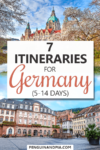
Plan Your Perfect Germany Itinerary with These Detailed Templates!
If you’re looking to plan the perfect trip around Germany, you are in luck! We’re passionate about exploring Germany because it’s a great country – and because Lisa is German!
Jokes aside, we’ve been lucky enough (and have made it a point) to see lots of different parts of the country – from the sea in the north to the mountains in the south. That said, Germany can be a tough country to plan a route or road trip through because there is just so much to see and do!
So, whether you’re looking for the best week in Germany or a Germany itinerary that covers 5 days or 14 days – here’s our master guide with 7 detailed Germany itineraries by train and/or by car! We’ve got cities, attractions, hotels and accommodations, directions, and distances to help you plan the best Germany travel route for you!
We’ve got other great posts to help you plan a visit to Germany:
- Must-Knows + Tips for Travelling to Germany for the First Time
- Helpful German Phrases to Get You By
- Discover 30 Beautiful Places in Germany
- Our Top Hostels in Germany (Stayed at all of them)
Table of Contents
Things to Consider When Travelling in Germany
Before you plan your trip to Germany, there are some things that you should know and keep in mind to make planning easier and to have a successful trip. While you probably know that the currency used in Germany is the Euro, here are some other topics that you should consider as well.
Best Time of Year to Visit Germany
Germany is actually a destination that you can visit year round – but it is important to plan accordingly and go in with the right expectations. If you’re planning a trip during the spring – let’s say from March to May – you could absolutely have beautiful weather… but it may also just rain a lot.
Unfortunately, the weather can be quite difficult to predict. However, as long as you prepare for different possibilities, you can have a great time no matter the weather! Generally you can say that Germany has a moderate climate with cool and rainy winters (more snowy the farther south you get) and warm – but not overly hot – summers.
July and August are usually the warmest months with an average temperature around 20°C. However, there can be days where you have 30°C. Of course, this can vary depending on the exact location you’re travelling to. Often, it is colder by the north coast than it is farther south.
We would honestly recommend that you avoid visiting the country in July if you dislike crowds since this is when the majority of kids are on their summer break from school. As a result, some cities can get quite busy.
Typically, we would recommend travelling in May or June and then from the end of August until the end of September (or even the middle of October). However, there is also a great reason to plan a Germany trip during the winter because of the many beautiful Christmas markets that you could visit at that time of year!
Public Transportation in Germany
Public transportation in Germany is quite good, especially when compared to North America. Yes, sometimes us Germans like to complain about the “Deutsche Bahn” – the German train company – but at the same time we are also super glad that it exists and works well.
If you’re wondering: Yes, all the itineraries mentioned below can absolutely be done if you want to take the train (minus the odd day trip to a castle here and there). If you want to check a train connection and/or buy tickets in advance you can do so on the DB Website . Alternatively, you can also download the DB app to your phone. We both have it and use it regularly.
As an alternative to the train, you can sometimes also use the bus to get from one city/town to another. Since 2013 (before this date it wasn’t allowed), long distance buses have established their presence in more and more cities and are now a popular way to get around for people who are more conscious of their money.
Unfortunately long distance train tickets can sometimes get quite expensive if you don’t book in advance – so the bus can be a good alternative in some cases.
The most popular long distance bus company in Germany is probably Flixbus. We have also used them multiple times to get between cities. If you want to look at the schedule and/or book a ticket, you can do so on their website .
In addition to the trains and long distance buses, the public transport within the cities is also usually pretty good – especially in bigger centres. Many of the cities – or transport associations – have their own transport apps. So, if you know where you are going and plan on using the local buses, trams, metros, etc. then downloading the local transport app would be a great idea!
Car Rental in Germany
If you want to rent a car and plan a Germany road trip, then that is certainly an option as well. Driving in Germany is generally pretty safe and people are not usually as reckless as in some countries in the south of Europe. However, it can get a little crazy in bigger cities like Berlin or Munich – especially if you are not used to driving in bigger centres.
In Germany, you drive on the right side as it is done in the United States, Canada, and many other countries as well. You have probably heard of the “Autobahn” – that’s simply the German name for our highway system. If you follow any of these itineraries, you’ll drive on many different highways.
While it is true that there is no speed limit in some parts of the Autobahn, there are lots of sections where there are actually speed limits in place. You can usually find limits imposed at/around construction zones along the way – so don’t think you can just speed all the time.
And PLEASE don’t drive on the Autobahn like you would on a highway in the United States or Canada – pass on the left and then get back over . If you’re going slower than other cars, there’s no need for you to be in the left (or even in the middle) lane. You can probably tell that this is something that Lisa complains about in Canada frequently, haha.
Since Germany is such a popular destination, there are lots of different rental car agencies to choose from. You can compare prices from different agencies for the duration of your trip with this handy rental car comparison tool . Please make sure to read the fine print so you know whether you need extra insurance, etc.
Also please be aware that many people in Germany drive cars with a stick shift. Rental cars with automatic transmissions exist, but the numbers available are usually lower and these cars might be slightly more expensive.
We’d also recommend that you reserve an automatic car well in advance if you need one – just so you can make sure that one is available for you. It probably wouldn’t be fun learning how to drive a stick shift while on a road trip in a foreign country.
Travel Insurance for Germany
If you’re planning a trip to Germany and you’re not from another EU country, then you should make sure to get travel insurance for the duration of your trip!
While you’ll probably be fine, accidents do happen and it could get really expensive if you’re not covered. That’s why we always travel with insurance.
If you live in another EU country and have health insurance there, you can get the blue health insurance card with which you are covered in other EU countries in emergency cases, as well.
If you don’t have that option – or are from outside of Europe – we recommend that you get private travel insurance.
Germany Itinerary 5 Days
If you only have a few days to travel through Germany, then have a look below at the two 5-day itineraries we have created. For these itineraries, we have assumed that you are not already in the country so they all start and end in bigger cities.
This should help make it easier for you to fly in/out of an airport with good connections if you are coming from overseas.
Depending on your preferences, you can choose between a trip through the northern part of Germany or a trip through the south of the country (mainly Bavaria). If you are interested in bigger cities and/or harbours, then we’d recommend the northern route.
In case you prefer half-timbered houses and beautiful old towns, then you should have a look at the southern route instead. Of course, you can always modify any itinerary to better suit your interests!
Germany Itinerary 5 Days – North
This 5-day Germany itinerary through the northern part of the country can certainly be considered a “sampler-type” of itinerary since you get to see the two biggest cities in the country – but not much more than that.
That’s completely fine though – you can only see so much in five days anyway. If you are interested in bigger cities and don’t have more than a few days, then this itinerary would be great for you!
The total driving time for this itinerary would be about 5 hours 30 minutes with a total distance of approx. 520 km. Of course, this can change depending on the route you are taking and the time of day you are travelling. Commuter traffic could add quite a bit of travel time to your journey.
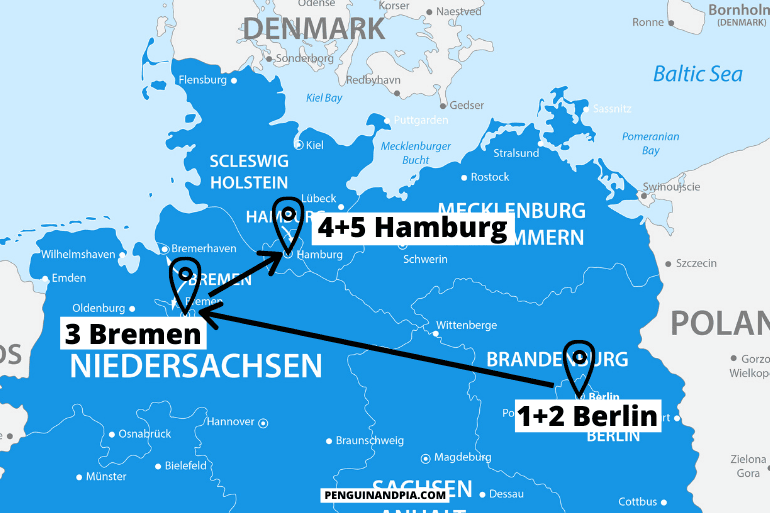
Day 1+2: Berlin Day 3: Bremen Day 4+5: Hamburg
Day 1+2: Berlin
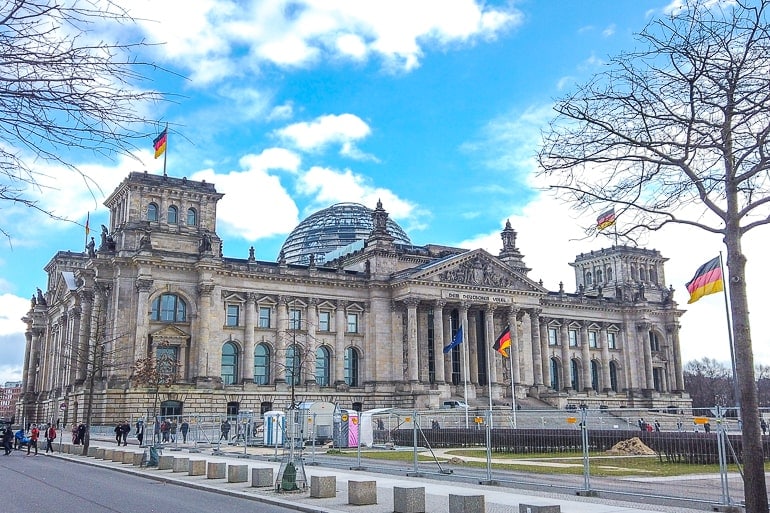
Berlin is a great place to start your adventure since it is the German capital, has multiple airports close by, and has really good train connections.
Since Berlin is such a popular tourist and business city, the car rental industry is well established and there are many different rental agencies to choose from.
— Compare prices from rental car companies in Berlin here
However, since you are only visiting bigger cities on this relatively short itinerary, we believe that a rental car is probably not necessary. Instead, for this trip, it might make more sense to take the train.
Since Berlin is such a big city with lots of things to do, it is worth it to spend (at least) two days in the city. So, remember to book your accommodation in Berlin for two nights .
Accommodation in Berlin : Berlin is a massive sprawling city with loads of different areas to stay and different accommodation options. You can check here for accommodations and hotels in Berlin .
If you are travelling to Berlin with a car, you’ll need a place to park. Check out Park Plaza Wallstreet Berlin Mitte for a stay right in the middle of the city close to Museum Island and other top attractions. It also has a tasty breakfast. Park Plaza has free parking on the street near the hotel (if available) or else it’s for a fee (but a reasonable price considering you’re in the middle).
If you are arriving into Berlin by train, you can check out NH Collection Berlin Mitte am Checkpoint Charlie . Located in the city centre right near the top sight “Checkpoint Charlie”, this popular hotel is in the heart of the action/attractions and is easy to get to via modes of public transit (metro – called the “U” for U-bahn).
If you are searching for a hostel/hotel, check out PLUS Berlin . Located over near the East Side Gallery (the piece of the Berlin wall with the artwork on it), Eric stayed here and really liked it! It’s also very easy to get to using public transit and is close to other areas to go out, etc.
Must-see Attractions in Berlin:
- Brandenburg Gate
- East Side Gallery (Berlin Wall)
We have also written a whole article about classic tourist attractions in Berlin in case you’d like some more inspiration. If you’re looking for some tips on how you could spend a day in Berlin, have a look at our One Day in Berlin Guide .
Day 3: Bremen
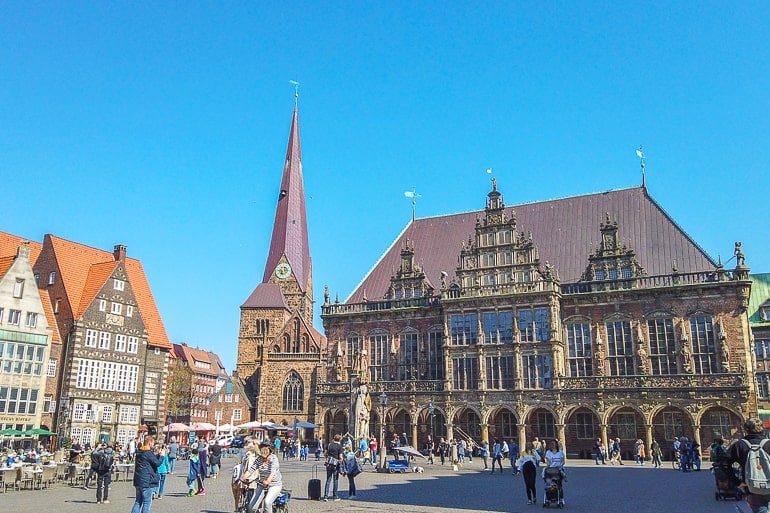
On the third day of your 5 days in Germany, you’ll head for Bremen. We’d recommend that you do the drive/train ride in the morning so you have enough time to explore the city once you get there.
Bremen is a hanseatic city with a nice old town – the market square with the town hall and the cathedral is especially popular. In German-speaking countries, the city is also known for a tale called the “Town Musicians of Bremen” by the Brothers Grimm. You’ll come across the animals of the tale (donkey, dog, cat, and rooster) many times as you stroll through the city.
The drive from Berlin to Bremen will take you approximately 4 hrs 10 min by car , but only around 3 hrs by train . If you take the train, try to book in advance if you can as this will usually save you some money.
Accommodation in Bremen: Bremen is a popular city to explore and it’s also on the larger side so you’ll find plenty of accommodations to suit your needs. There are hotels in the city centre/old town which put you within walking distance of the river and top attractions. You can check here for accommodations and hotels in Bremen .
For a popular choice in the historic middle, you should check out the very popular Radisson Blu Hotel Bremen . Funny story – we know there’s underground parking because we parked there when we visited Bremen by car.
If you want to stay closer to the train station just outside the historic centre (but still very central), check out the Dorint City-Hotel Bremen . This lovely and also very popular hotel is close to the pretty Windmill and flower gardens and has water views just outside the old city walls.
Must-see Attractions in Bremen:
- Marktplatz with Town Hall and Cathedral
- Böttcherstraße
- Schnoorviertel
If you want some more tips for Bremen, have a look at our detailed Things to do in Bremen Guide .
Day 4+5: Hamburg
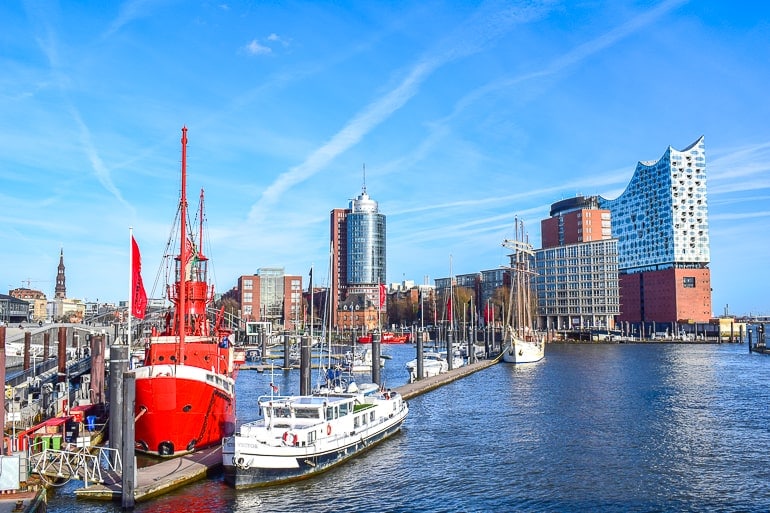
Hamburg is the second-biggest German city and the last stop on this short itinerary. We have been to Hamburg numerous times now and it is actually one of our favourite bigger German cities. You’ll find that the atmosphere of the city is very different than in Berlin. Not necessarily better or worse – just different.
Interesting (and slightly irrelevant) fact: The cities you visit on this itinerary are the three city states that exist in Germany in addition to the 13 area states such as Bavaria, Nordrhine-Westphalia etc.
The drive from Bremen to Hamburg is actually pretty simple and should only take around 1 hour 30 minutes by car and just around 1 hour if you take an ICE (fast train) . The train connection between these two cities is great with trains running pretty frequently. That should make it quite easy to find a train connection that works for your schedule.
Accommodation in Hamburg : Hamburg is popular city with loads of different accommodations and areas to stay in. You can check here for accommodations and hotels in Hamburg .
If you are travelling to Hamburg with a car, you might want to check out the Mövenpick Hotel Hamburg . Located in an old water tower, this unique hotel has a number of cool features with stunning views and parking onsite. It’s very popular – and also close to public transit for getting around!
If you are travelling to Hamburg by train, ARCOTEL Rubin Hamburg is a great hotel option for you to check out. Located in the cool area of St. Georg, you can easily walk to the hotel from the train station. It’s also walkable to other parts of the city centre and other attractions.
If you are looking for a hostel in Hamburg, you might want to check out Generator Hamburg as a reliable and popular hostel stay close to central station and the heart of the city.
If you want more details about accommodations in the city, we have a more detailed guide on where to stay in Hamburg .
Must-see Attractions in Hamburg:
- Speicherstadt
- Elbphilharmonie
- St. Pauli Piers
As one of our first ever articles on Penguin and Pia, we actually wrote a short Hamburg Guide . Have a look if you want some more Hamburg inspiration. Unfortunately it’s not nearly as detailed as our newer article – looks like it’s time for an update!
Germany Itinerary 5 Days – South
If you would like to explore the southern part of Germany instead of the north, then we would recommend the following 5 days Southern Germany itinerary. Compared to the northern itinerary, this trip includes stops in some smaller towns and cities. So, if you are interested in seeing some places of various sizes, beautiful old towns, and maybe a castle, then this might be a good itinerary for you.
The driving distance of this trip is just around 680 kilometres with a total driving time of approx. 7 hours . Depending on your mode of transportation, this can – of course – vary slightly.
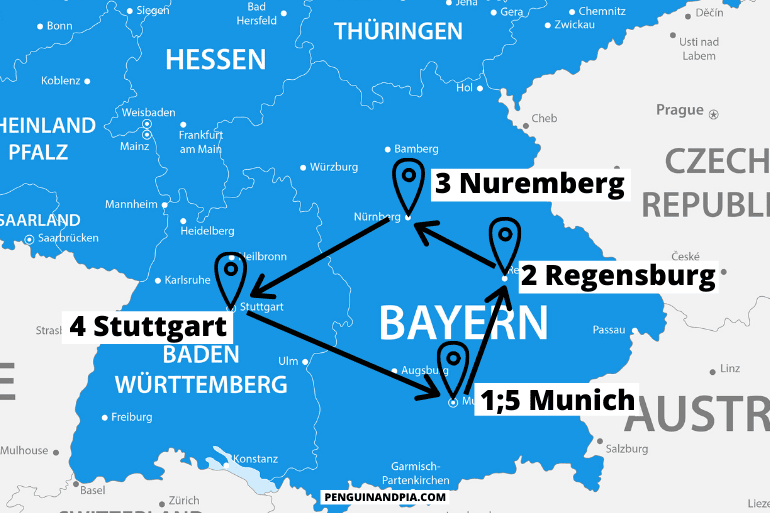
Day 1: Munich Day 2: Regensburg Day 3: Nuremberg Day 4: Stuttgart Day 5: Munich
Day 1: Munich
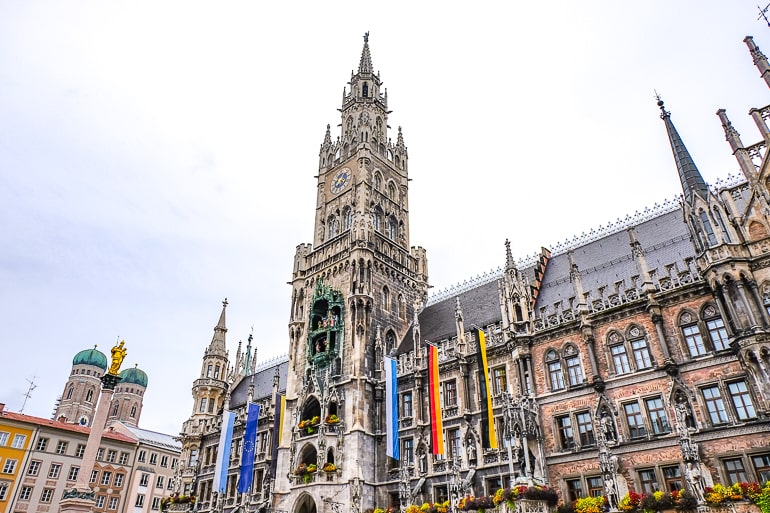
We are starting (and ending) this itinerary in Munich since it is an easy airport to fly in and out of from other parts of the world. If you are coming from another part of Europe by train, the connections to Munich are also usually pretty good.
Munich is the third-biggest German city and a very popular tourist destination. International travellers often mainly know the city because of the Oktoberfest which happens every year from the middle of September until October.
However, there is so much more to do and see in Munich than just the “Wiesn” (as the Oktoberfest is sometimes called as well). We are always happy to return to Munich because there is just so much to explore.
If you are thinking about renting a car for this itinerary, then you’ll be happy to know that it is quite easy to get a rental car in Munich. You can either pick it up directly at the airport after you land (if you arrive by plane) or in the city centre before you head to the next stop on this journey.
— Compare prices from rental car companies in Munich here
Accommodation in Munich: Munich is very large and popular city so finding a place to stay is no problem. The issue becomes that there are too many places to choose from! That said, you can check here for accommodations and hotels in Munich .
Specifically, we stayed at the very popular H2 Hotel München Olympiapark and we would highly recommend it for the value for money. The hotel has nice, cozy rooms, a super great breakfast buffet, and has a metro station steps from the front entrance to take you to the city centre.
There’s also onsite parking which makes this hotel perfect if you are travelling to Munich by car. The famous Olympic Park and BMW Museum are close by, too!
If you want to stay a little more in the city centre, then check out the Platzl Hotel Superior . This trendy hotel is in the heart of the Old Town just steps from top attractions like Marienplatz and the famous Hofbräuhaus. It’s also easy to get to the central train station either walking or on the metro.
If you are looking for more details on accommodations in this massive city, we wrote a detailed guide on where to stay in Munich .
Must-see Attractions in Munich:
- Marienplatz with New Town Hall
- Olympic Park
- Victuals Market
- English Garden
We also have a great little guide on how to spend one day in Munich if you want more details.
Day 2: Regensburg
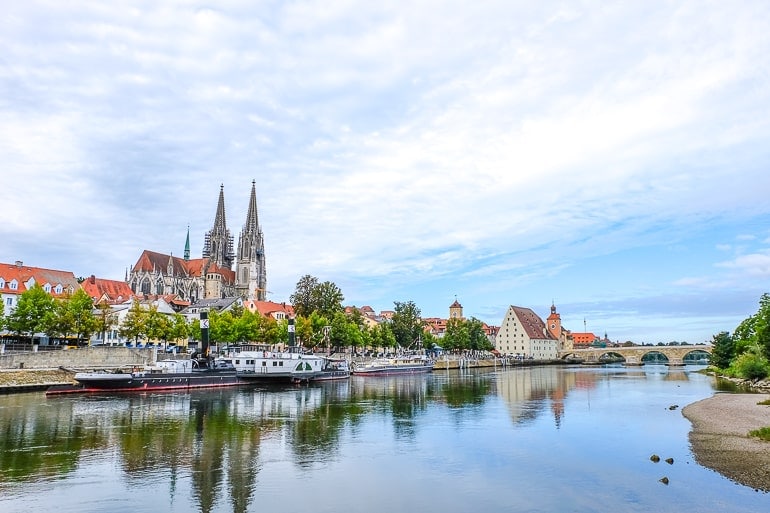
On day two of your trip you’ll be on your way to Regensburg, a small city in Bavaria on the Danube river. Due to its location by the river, Regensburg is a popular stop for people on a river cruise. So don’t be surprised if you see many different tour groups in the Old Town.
We recently spent a couple of days in Regensburg to get to know the city better and enjoyed our time there. One of the highlights is the Old Stone Bridge in the city centre which was built in the 12th century. We actually filmed a small YouTube video in Regensburg – which you can watch here if you are curious about what the city looks like.
The journey from Munich to Regensburg takes approximately 1 hr 20 minutes by car and around 1 hr 30 minutes by train . If you decide to travel by train – and especially if you are travelling with other people – we would recommend that travel with a “Bayernticket” (Bavaria Ticket). This ticket for train travel within the state of Bavaria usually allows you to save some money compared to regular prices.
Accommodation in Regensburg: If you are staying a night in Regensburg, you’ll have a number of great accommodations to choose from. To get started, you can check here for accommodations and hotels in Regensburg .
When we visited the city, we stayed at the Holiday Inn Express – Regensburg and really liked it. It’s a newer hotel and it really shows. The breakfast was excellent and there is even an onsite parking garage if you are travelling with a car. It’s not in the Old Town or near the river – but we did walk there one day and it only took about 15 minutes.
If you are travelling by train and you are on-foot, then check out the Altstadthotel Am Pach . This simple hotel is located right in the heart of the old town so you’re close to everything there is to see and do in Regensburg – including the beautiful Danube River. They also have breakfast included.
Must-see Attractions in Regensburg:
- Old Stone Bridge
- St Peter Cathedral
We are currently still working on our Regensburg Guide – but we’ll link it here once it is published.
Day 3: Nuremberg
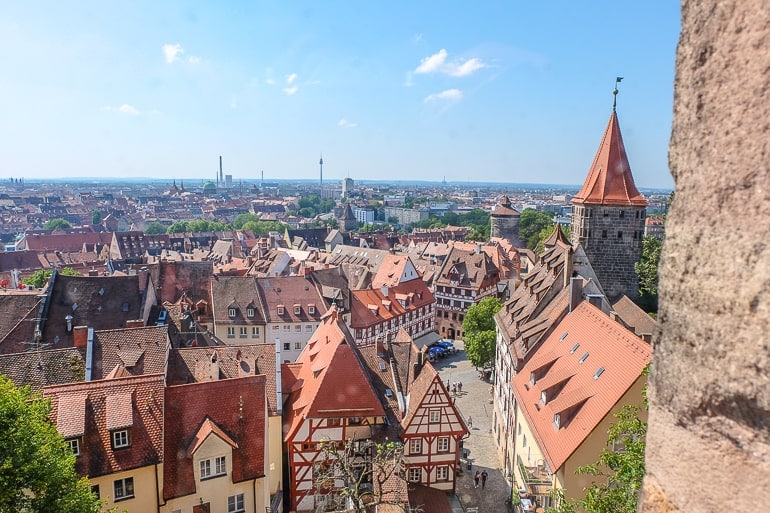
On the third day of this 5 day Southern Germany itinerary you’ll drive – or take the train – from Regensburg to Nuremberg. Nuremberg is a medium sized city in a part of Bavaria called Franconia. If you pay attention, you might notice that the dialect spoken here is quite different from that spoken in Munich and other places farther south.
Lisa actually grew up in this part of Germany so she has been to Nuremberg many, many times. Last year we also went to explore the city together and had a great time. Travellers from abroad mainly know the city for the Nuremberg Trials which took place there after World War II. You can certainly learn alot of history in this German city!
Since Nuremberg is quite close to Regensburg the drive won’t be long – giving you slightly more time to explore the city.
The journey takes approximately 1 hour 10 minutes by car and between 1-2 hours by train depending on which train you take (some stop more often than others). Once again, a regional ticket – such as the Bavaria Ticket – will probably save you some money if you travel with more people.
Accommodation in Nuremberg : Since Nuremberg is a very popular city to visit in Germany, there are many, many places to stay scattered throughout the city centre and around it. You can check here for accommodations and hotels in Nuremberg .
When we visited, we stayed at Five Reasons Hotel and Hostel and we really liked it. Located just inside the medieval city walls, we were really close to the train station and yet also steps from top attractions like the Germanisches Nationalmuseum. The place was bright and great value for the price which we liked a lot.
Close to Five Reasons, we had friends stay at the Sheraton Carlton Nuremberg and they loved it. We actually saw it with our own eyes – it had a pool with views of the city among other perks. There’s also a parking lot right across from the hotel if you’re coming to Nuremberg by car. It’s walking distance to the old centre and the central train station so best of all worlds!
Must-see Attractions in Nuremberg:
- Imperial Castle of Nuremberg (Kaiserburg)
- Documentation Center + Nazi Party Rally Grounds
- Albrecht Dürer’s House
As is the case with Regensburg, we are also still working on our article for Nuremberg. Once it’s live, we’ll link it here.
Day 4: Stuttgart
Stuttgart is the capital of the German state called Baden-Württemberg and the only place on this itinerary that is not located in Bavaria. The city is mainly known for being a “car hub” since both Mercedes-Benz and Porsche have their headquarters there. There are also museums dedicated to both car brands.
Stuttgart is a bit smaller than Munich but there is still a lot to see. In fact, one day won’t be enough to see the whole city – but it’ll allow you to get a good first impression. Next to the car museums, you could visit some of the many green spaces and/or old buildings that the city has to offer.
Driving from Nuremberg to Stuttgart by car will take you approximately 2 hours 15 minutes. If you have the time, you could even take a small detour and stop in Rothenburg ob der Tauber, known for its picturesque Old Town.
By train , the journey from Nuremberg to Stuttgart will take between 2 hrs 10 minutes and 2 hrs 30 minutes – depending on the type of train you are taking. Try to book your ticket in advance if possible as this can save you some money.
Accommodation in Stuttgart: There are many places to stay in Stuttgart – especially in the city centre. You can check here for accommodations and hotels in Stuttgart .
If you’re travelling to Stuttgart with a car, check out the Abalon Hotel ideal . Located very much in the city centre, this popular hotel has an underground parking garage and offers a good breakfast selection.
If you’re travelling to Stuttgart by train, you can check out the Pension am Heusteig . This guesthouse-style accommodation doesn’t have parking but offers a great breakfast and is a doable walk or metro ride from the train station. Funny enough, these two accommodations are very close to one another!
Must-see Attractions in Stuttgart:
- Schlossplatz
- Mercedes-Benz Museum
- Staatsgalerie Stuttgart
Day 5: Munich
On the last day of your trip you’ll make your way back to Munich since it is usually easier to leave Germany through the Munich airport than smaller airports in the surrounding area.
However, if you don’t have to get to an airport – and/or are taking the train home – you could also stay an extra night in Stuttgart if you wanted. Both cities are worth spending an extra few hours in – so you really just have to see what works best for you.
If you decide to get back to Munich, then the journey from Stuttgart to Munich will take approximately 2 hours 20 minutes by car and just slightly less (2 hrs 15 minutes) by train .
Accommodation in Munich : We already went over accommodations in Munich in Day 1 of this itinerary. So, you can head back up for the full details – but we would highly, highly recommend the H2 Hotel München Olympiapark as great value for money with great breakfast, parking, and a metro stop outside the front door.
Don’t forget we also have our detailed guide on where to stay in Munich if you want to have a deeper look at accommodations in the city.
We also have a post on spending one day in Munich if you want more details about the city!
Germany Itinerary 7 Days
If you have slightly more time to explore Germany, we have also created two 7 day Germany itineraries for you. Similar to the 5 day itineraries, we made two different itineraries since it’s pretty much impossible to see the whole country in just a week.
Instead of a northern and southern itinerary, this time we have focused on the western and eastern parts of the country. But please don’t read too much into that description – we use the terms quite loosely. As always, you’re welcome to modify any part of the itinerary to make it better fit your schedule/interests.
Germany Travel Itinerary 7 Days – West
For this itinerary, the total driving time would be around 14 – 15 hours and the distance would be slightly over 1100 km . For these calculations, we included the day trip to Monschau (and back to Cologne) as well as the day trip to Freiburg im Breisgau (and back to Stuttgart), which would be a longer day trip anyway.
So, depending on which day trips you decide to add on to (or remove from) this itinerary, your driving time and distance could be noticeably different than the estimates given above!
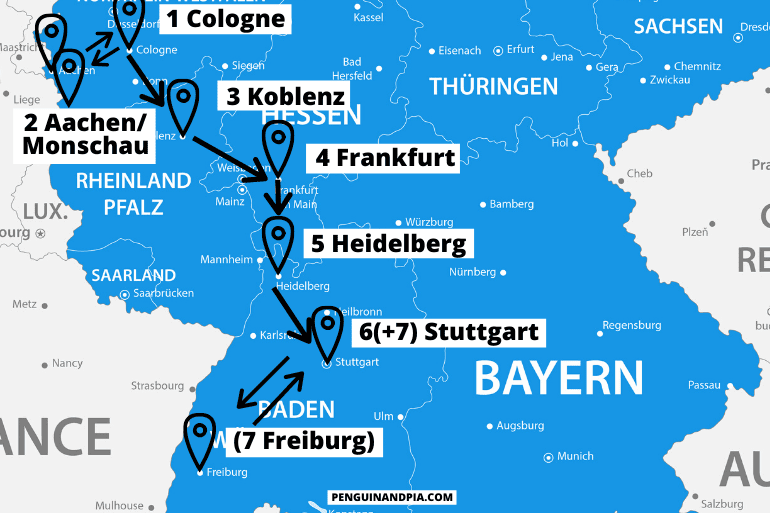
Day 1: Cologne Day 2: Day Trip to Monschau/Aachen Day 3: Koblenz Day 4: Frankfurt Day 5: Heidelberg Day 6: Stuttgart Day 7: Stuttgart / Day Trip to Freiburg im Breisgau
Day 1: Cologne
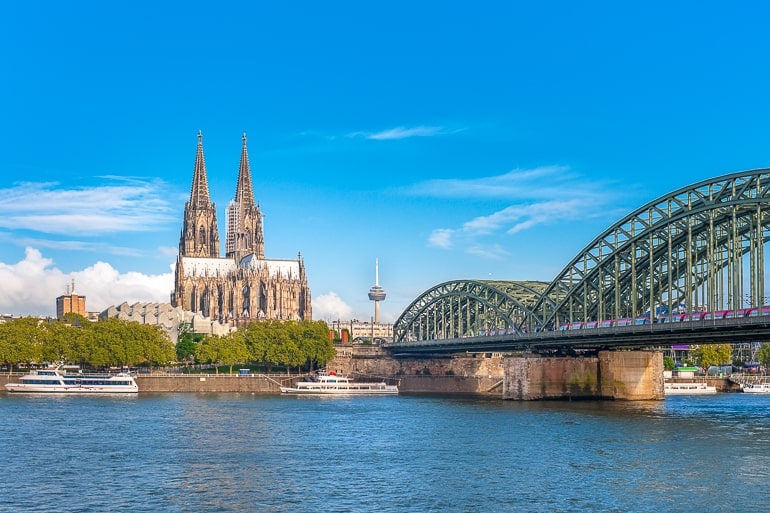
As we have already explained above, we like to start these itineraries in bigger cities to make it easier for people from overseas to get to Germany and start their adventure without hassle. Cologne is Germany’s fourth-biggest city (by population) and has two pretty good airports (Airport “Köln Bonn” and Airport “Düsseldorf”) close by for those coming from far away.
If you want to rent a car for this itinerary, it should be pretty easy to get one in Cologne since it’s quite an international city with lots of visitors.
— Compare prices from rental car companies in Cologne here
Cologne is a pretty spread-out city so you won’t be able to see the whole city in a day or two. However, the highlight of the city is certainly the Cologne Cathedral which is located right next to the central station and the Rhine River.
Make sure to plan some time to visit this impressive building – we always spend much longer in there than we originally plan. It’s free to enter so it can get very crowded depending on the day and time you’re visiting.
Accommodation in Cologne : Cologne is a very big city with multiple areas to stay in. As such, there are lots of accommodation options across the city. Wherever you book, remember to book your accommodation for two nights since you will go on a day trip and then return to Cologne on the second day. You can check here for accommodations and hotels in Cologne .
We have stayed in the Lindner Hotel City Plaza and loved it. The floors all have themes (we got Cologne Zoo with animals), the breakfast buffet is absolutely fantastic, and it’s a short walk to the Cathedral along one main street. There’s also parking available at/near the hotel for those with a car.
If you want to stay more in the heart of the city centre, check out something like the CityClass Hotel Residence am Dom . It’s popular, centrally located with shops and restaurants around, and only a short walk to the train station.
If you are looking for a hostel in Cologne, Eric once stayed at Cologne Downtown Hostel and it was honestly excellent. There’s a grocery store right below it and it’s located in the city centre. It also has a large balcony to enjoy the sunshine from!
Must-see Attractions in Cologne:
- Cologne Cathedral
- Cologne Chocolate Museum
Day 2: Day Trip to Monschau/Aachen
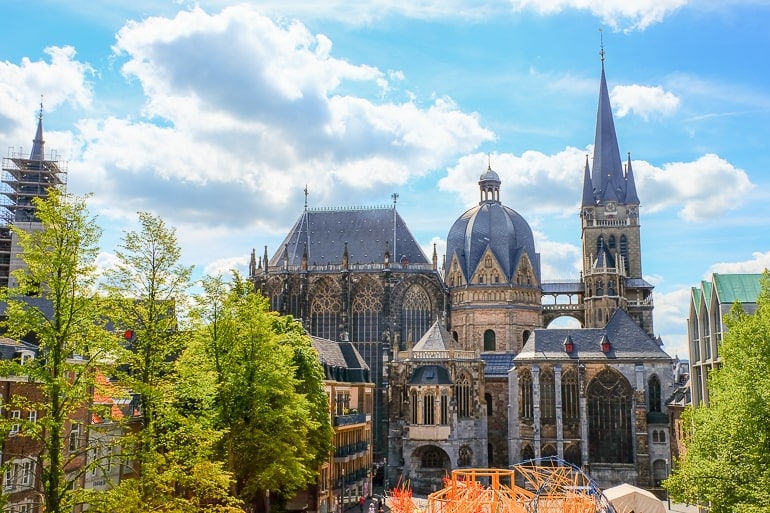
On the second day of this Germany itinerary, you have a few different option: you can either spend another day in Cologne if you feel like you haven’t seen enough of the city yet or take a day trip to Monschau or Aachen. Both of these are two places not too far from Cologne.
Monschau is a popular day trip in the area mainly because of its picturesque buildings in the old town. In fact, you probably have already seen photos of it on social media. To get to Monschau from Cologne, you can either drive or take a combination of trains and buses.
Getting to Monschau takes around 1 hr 40 minutes by car and approx. 2 hours by public transport . To visit Monschau by public transport, you can take the regional train from Cologne to Aachen-Rothe Erde and then take Bus #66 from there to Monschau.
Must-see Attractions in Monschau:
- Monschau Castle
If you want to go on a day trip but don’t want to venture that far, then Aachen would be another great option. This city is actually Germany’s most western city very close to the borders of The Netherlands and Belgium.
We’ve lived close to Aachen for a while and have written a whole guide full of things to do in Aachen that you should read if you want more information. In our opinion, one day is the perfect amount of time to explore the city since it doesn’t have that many attractions and the old town in the city centre is quite compact (but still very pretty).
Getting from Cologne to Aachen is also very easy. It takes approx. 1 hr 20 minutes by car and just around 50 minutes by regional train . You should look into getting a “Schönes Tag Ticket NRW” for the day if you’re travelling with more people as this can save you some money.
Must-see Attractions in Aachen:
- Aachen Cathedral
- Elisenbrunnen
Day 3: Koblenz
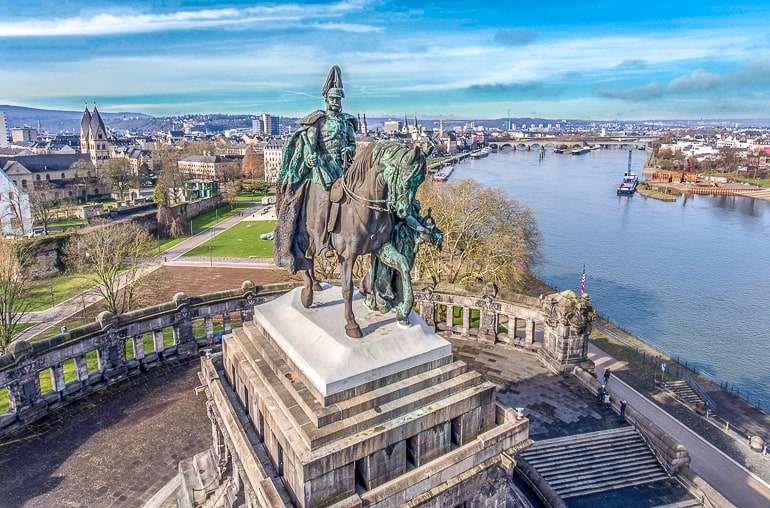
From Cologne, your journey continues to Koblenz – another city on the Rhine River. Koblenz is a smaller German city with a population of slightly over 110,000 inhabitants.
There are quite a few castles and nice hikes in the area which are easy to reach from Koblenz – just in case you decide that you don’t want to spend the day in the city. Depending on the time of year, you could also look into booking a boat tour on the Rhine river. This way, you get a unique perspective of the beautiful region.
Getting from Cologne to Koblenz is pretty easy and will take approximately 1 hour 30 minutes by car and between 50 minutes and 1 hr 10 minutes by train . We really like this train journey since the tracks follow the river for a majority of the trip. As a result, you get some really nice views – and might even spot some of the beautiful castles in the area!
Accommodation in Koblenz: Koblenz is certainly not a huge city – but you’ll still find a good number of places to stay for a night or two. You can check here for accommodations and hotels in Koblenz .
For a hotel right in the city centre, check out the Sander Hotel . This lovely hotel is super popular and close to shops and the rivers. If you are arriving to Koblenz by car, there is onsite parking at the hotel. However, since the city is smaller you can also easily reach the hotel by walking from the central train station.
Must-see Attractions in Koblenz:
- Deutsches Eck
- Ehrenbreitstein Fortress
- Koblenz Cable Car
Day 4: Frankfurt
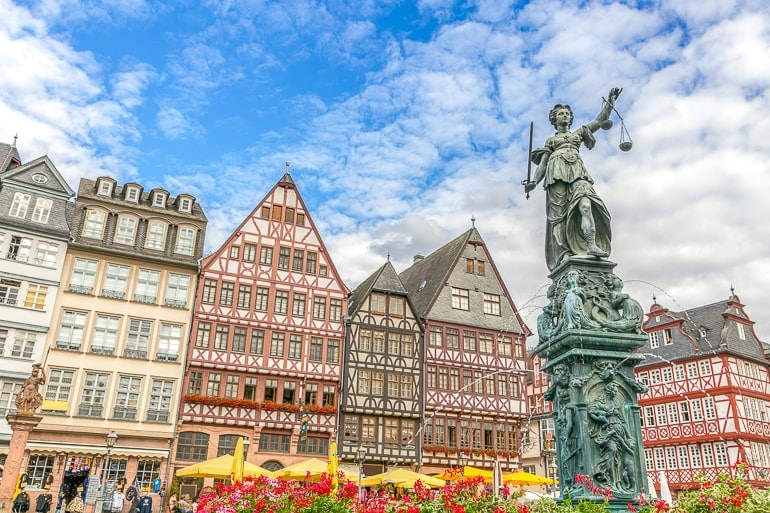
The next stop on your itinerary is Frankfurt, arguably one of the country’s most popular transport hubs due to the busy Frankfurt airport. Frankfurt is an interesting city that divided people: some people really enjoy it while other people don’t like it at all. To be fair, we haven’t spent enough time in the city to really solidify our opinion.
Either way, we do believe that Frankfurt is a stop that you shouldn’t miss if you are trying to get to know different areas of Germany. Known as the financial hub of Germany, this city with its many skyscrapers can feel quite a bit more modern than other German cities. However, the city also has a beautiful, historical market square that you should visit.
The journey from Koblenz to Frankfurt is another easy one – and if you are taking the train (we would recommend that!), you’ll once again follow the Rhine River for big parts of the journey and be rewarded with some great views.
The train ride will probably be between 1 hr 25 minutes and 2 hrs 12 minutes long – depending on the connection you choose. By car , the trip will take around 1 hr 30 minutes . Of course, this can vary depending on traffic.
Accommodation in Frankfurt : There are loads of places to stay in Frankfurt given its popularity and size. You can check here for accommodations and hotels in Frankfurt .
A great option in Frankfurt is the Motel One Frankfurt-Römer . Located very much in the heart of the city centre close to the old town and river, this cool hotel has underground parking if you are arriving to Frankfurt by/with a car. It also serves up a great breakfast!
If you are arriving by train to Frankfurt, you should check out Fleming’s Express Hotel Frankfurt . Located literally right beside the central station (which is in the city centre), this upscale hotel is very popular because it’s very affordable and also has a great breakfast.
Must-see Attractions in Frankfurt:
- Palmengarten
Day 5: Heidelberg
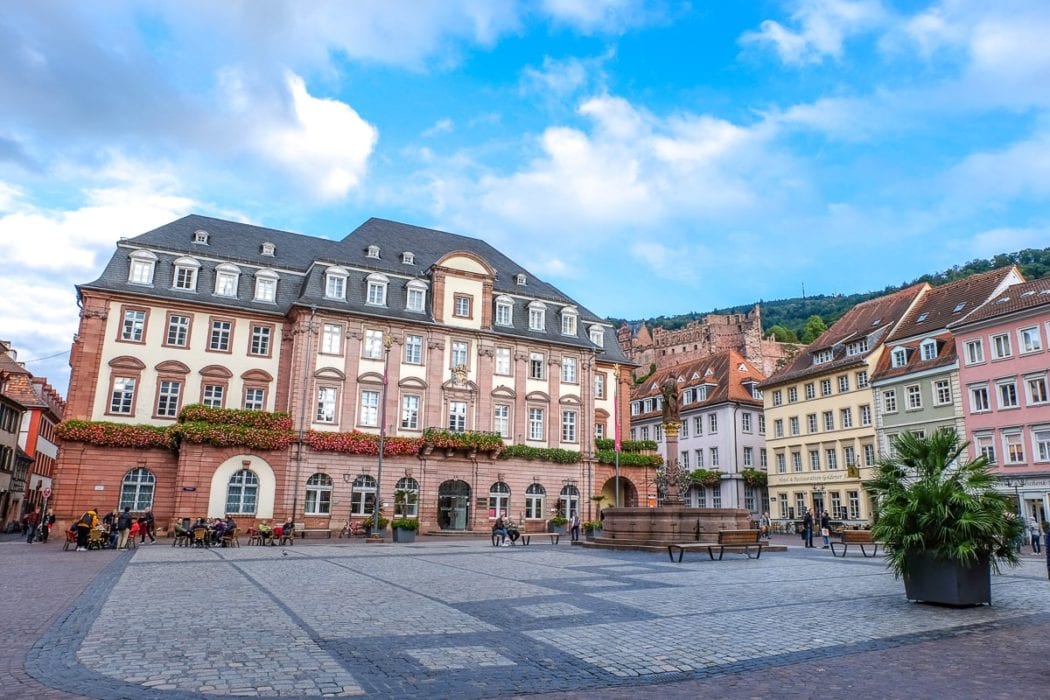
After your day in Frankfurt, you’re heading to Heidelberg which is actually one of our favourite German cities. The highlight of the city is certainly the castle on top of the hill which is visible from many different parts of the city.
Heidelberg is smaller than Frankfurt so you can see quite a bit in just 24 hours. The Old Town is beautiful and lots of attractions are located there. Our highlight was probably the tower climb of the Church of the Holy Spirit. From up there, you get a beautiful view of the Old Town. A very close second was the cable car ride up to the Königstuhl which was lots of fun – even in the rain.
Getting from Frankfurt to Heidelberg won’t take too long. The journey will be approximately one hour by car and between 45 minutes and 1 hr 30 minutes by train – depending on which type of train you are taking.
Accommodation in Heidelberg: If you’re heading for Heidelberg (good choice), there are lots of great places to stay. You can check here for hotels and accommodations in Heidelberg .
We stayed a little outside the old town – but close to the train station – at NinetyNine Heidelberg City . This hotel was really, really great. The beds were comfy and the decor has animals everywhere – you have to see it to understand!
There’s onsite parking (paid) and street parking (free, but not guaranteed) if you are travelling with a car. There’s also a tram stop right outside the hotel to get directly into the city centre in minutes.
If you are looking to stay in the historic old town, then check out colourful hotels like Hotel Holländer Hof which overlooks the river or Hotel Zum Ritter St.Georg which is literally overlooking the main Marktplatz.
Must-see Attractions in Heidelberg:
- Heidelberg Palace
- Church of the Holy Spirit (mainly tower climb)
If you want to learn some more about Heidelberg and what there is to do, you can read our detailed Heidelberg Guide here .
Day 6: Stuttgart
The next day you will drive to Stuttgart, a city that we’ve already mentioned in one of our Germany itineraries for 5 days. As we have already mentioned, you’ll probably really enjoy Stuttgart if you are interested in cars.
Even if you aren’t, there is still lots for you to explore. Did you know that wine also plays a huge role in Stuttgart and the surrounding region? If this is something that interests you and you’re there in the summer (specifically around the end of August), then you should stop by the “Stuttgarter Weindorf” (“wine village”) – but obviously, please don’t drink and drive.
As for getting from Heidelberg to Stuttgart, the journey will take you approximately 1 hr 20 minutes by car and between 40 minutes and 1 hr 30 minutes by train . As mentioned before, the time differs depending on the type of train you are choosing.
Accommodation in Stuttgart: Stuttgart has many places to stay so you can check here for accommodations and hotels in Stuttgart .
Be sure to see the Abalon Hotel ideal if you have a car. This hotel has underground parking available and a tasty breakfast. It’s also in the city centre which makes sightseeing easy.
Those coming to Stuttgart by train should look at the Pension am Heusteig . It’s a guesthouse that is located not too far from the first hotel here and it’s a doable walk or metro ride from the central station.
Day 7: Stuttgart / Day Trip to Freiburg im Breisgau
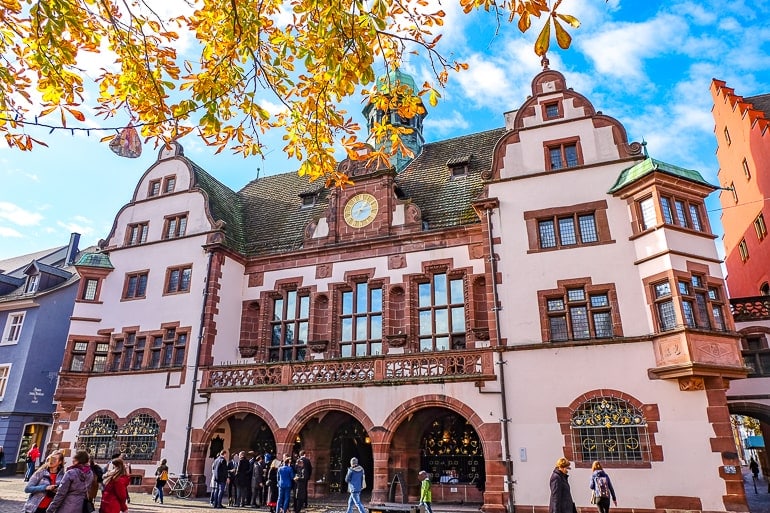
For this itinerary, you can decide how you would like to spend your last day. You could either spend another day to explore more of Stuttgart (and maybe relax for a bit) or you could head farther south and spend a day in Freiburg im Breisgau. We really enjoyed spending time in this small city in the south of Germany during our visit.
We are currently still in the process of writing our Freiburg guide, but we’ll link it here once it’s done. However, a good way to start your exploration of the city is by wandering the old town.
In Freiburg, you’ll find that many of the cobblestoney streets have small water-filled runnels – called Bächle – running alongside it. Sometimes they even have small yellow ducks in them!
The journey from Stuttgart to Freiburg im Breisgau is slightly longer than most other parts of this itinerary. It takes approximately 2 hrs 30 minutes by car and around 2 hours by train . Since this train journey will probably include at least one ICE (the fast train), we’d recommend that you book your train tickets early if you can to save some money.
Must-see Attractions in Freiburg:
- Freiburger Münster (Cathedral)
- Schlossberg + Tower
- New + Old Town Hall
Germany Travel Itinerary 7 Days – East
If the other week-long Germany itinerary doesn’t interest you and/or you really want to visit the German capital Berlin, then you might prefer this eastern route instead.
The driving time would be just slightly over 10 hours and would be approximately 900 km driving distance – including the day trip to Potsdam (which would honestly be easier with public transport, though)!
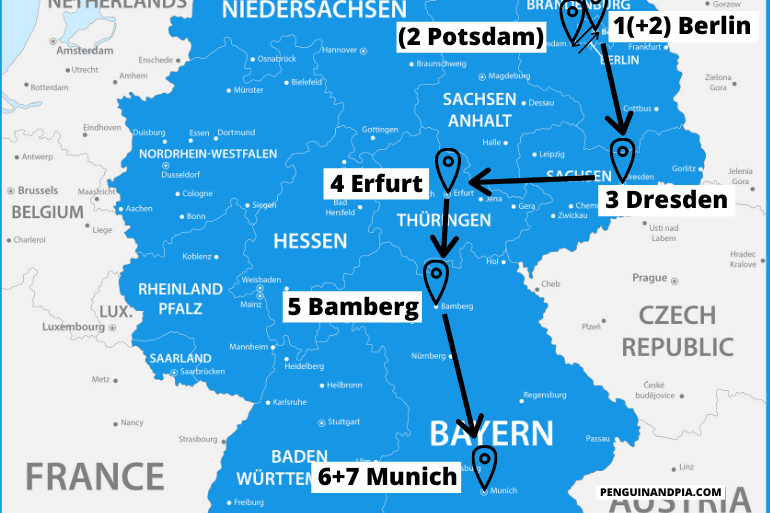
Day 1: Berlin Day 2: Berlin / Day Trip to Potsdam Day 3: Dresden Day 4: Erfurt Day 5: Bamberg Day 6+7: Munich
Day 1: Berlin
Once again, this itinerary begins in Berlin since it is one of the big cities that is easier to get to for people coming from overseas. Similar to the five day itinerary that started in Berlin, you’ll stay two nights in the German capital. There is just too much to see to spend only one day – and even in two days you wouldn’t be able to explore everything.
In case you’ve already been to Berlin on a different trip and/or aren’t a huge fan of big cities, we also give you the option of a day trip to Potsdam (a city close by) on the second day. More on that below.
Accommodation in Berlin : Finding a place to stay in Berlin can be tough because there are just so many options. You can check here for accommodations and hotels in Berlin .
If you have a car, check out Park Plaza Wallstreet Berlin Mitte . Located right in the middle of the city close to Museum Island, this hotel has a great breakfast and free parking on the street behind the hotel. Otherwise, parking is paid but for a decent price for the city centre.
Those without a car travelling by train should see the NH Collection Berlin Mitte am Checkpoint Charlie . If you want a hotel close to a top attraction that is easy to get to with public transport, this is definitely one of them!
Across the city, PLUS Berlin is a really good hostel/hotel that Eric stayed at a few years ago. It’s a big place but it was a great stay over by the East Side Gallery (part of the Berlin Wall with the graffiti on it).
As already mentioned above, if you want to read some more about Berlin, check out our articles on Things to do in Berlin and How to spend one day in Berlin .
Day 2: Berlin / Day Trip to Potsdam
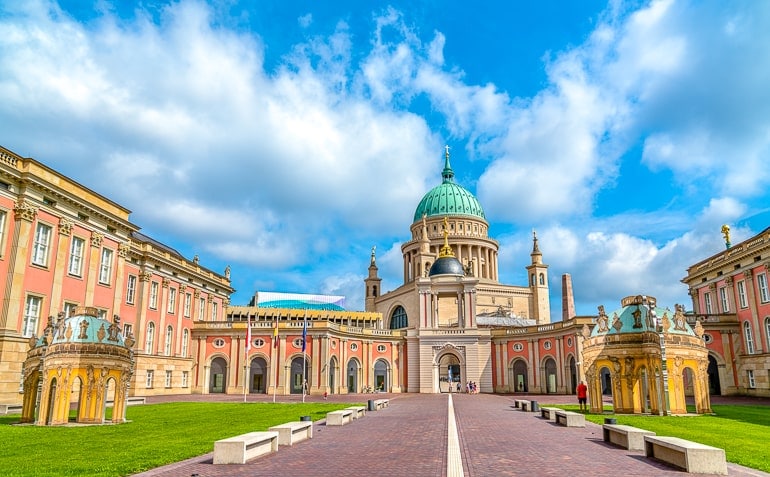
On your second day, you can choose between spending another day in Berlin to see more of the German capital or going on a day trip to Potsdam – which is a smaller city not far from Berlin.
Potsdam is actually the capital city of the German state called Brandenburg. It’s most popular attraction is probably Sanssouci Palace with the beautiful Sanssouci Park surrounding it.
During our visit, we also enjoyed walking through the Dutch Quarter with its small shops and cafes. Since the city isn’t too big, one day gives you a chance to get a good impression and check out some of the more popular sights.
It is also very easy to get to Potsdam from Berlin. If you decide to drive , it’ll take you approx. 40 minutes , but it could be longer – traffic depending. We would honestly recommend that you do this day trip by taking public transport. This way, you don’t have to worry about traffic and/or finding a parking spot.
For trains, you can take the S-Train #7 (S7) from Berlin Central Station (as well as other train stations) straight to Potsdam Central Station. The journey will take around 35 minutes with trains running very frequently throughout the day.
Must-see Attractions in Potsdam:
- Sanssouci Palace
- Dutch Quarter
- Cecilienhof
Day 3: Dresden
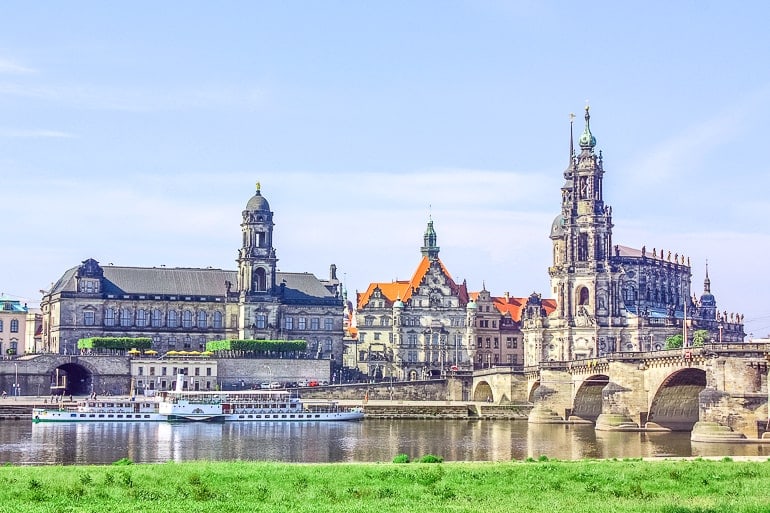
The third day of this Germany itinerary will take you from Berlin to Dresden which is a German city close to the Czech border. To be honest, we haven’t spend that much time in Dresden yet – and it’s certainly on our list of places to visit this year.
One of the city’s main attractions – the Zwinger – is known across the country and a sight that you shouldn’t miss during your visit. It’s a beautiful palace built in a baroque style.
Fun fact: When Lisa was a kid, she didn’t actually know that the “Zwinger” was a palace. Since that word can also mean “dog kennel” in German, she was always confused as to why people would want to visit it during their time in Dresden!
As for getting from Berlin to Dresden, the drive will take you around 2 hrs 10 minutes by car and around 2 – 3 hours by train. Once again, this depends on which connection you choose.
Accommodation in Dresden: There are a number of accommodations in the compact “Innere Altstadt” close to the River Elbe for you to choose from. You can check here for accommodations and hotels in Dresden .
For a great hotel option right in the old town, look no further than the Star Inn Hotel Premium Dresden im Haus Altmarkt . You’re a short walk to the train station, the river, and all the best old sights in Dresden if you stay here and arrive by train. If you come to Dresden by car, the hotel has discounted underground parking available.
Another option right in the old town (and even closer to the river) is Aparthotel am Schloss . Since this is an apartment-style hotel, it’s a great option if you are looking for more of a base to relax in a “home away from home”. It’s a very popular choice, too – and also has onsite parking.
Must-see Attractions in Dresden:
- Frauenkirche
Day 4: Erfurt
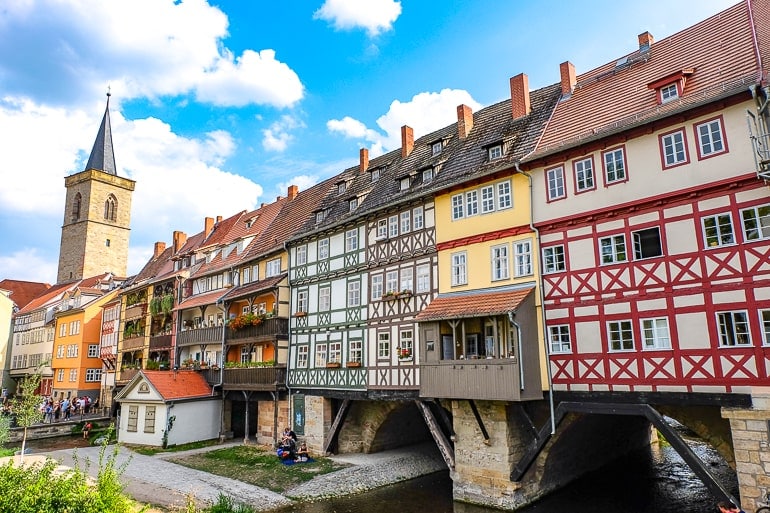
Erfurt is a popular city to visit in the middle of Germany – and it’s also the capital city of the German state Thuringia. We’ve spent some time in Erfurt a few months ago and instantly fell in love with the city. Its size is perfect (in our opinion) – giving you enough things to do without feeling overwhelming.
Maybe you’ve seen photos of one of the city’s most popular attractions, the Krämerbrücke. This bridge is not only pretty to look at and photograph, it’s also unique in the sense that there are buildings on the bridge and when you’re walking on it, you can’t actually see the water running below.
Visiting the bridge and climbing the tower of the Ägidienkirche, a church at one end of the bridge, is something we’d certainly recommend during your time in the city. We actually filmed a short video of our time exploring Erfurt. If you are interested in seeing what parts of the city look like, then you can find our video here .
Getting to Erfurt from Dresden won’t take you too long. It will take approx. 2 hours 20 minutes by car and between 2 and slightly over 3 hours by train .
Accommodation in Erfurt: Since Erfurt isn’t a huge city, there aren’t a ton of accommodations – but certainly more than enough to find one that works for your style and budget. You can check here for hotels and accommodations in Erfurt .
We stayed at Gästehaus in der Gotthardtstraße and really liked our stay. It’s located in a quiet neighbourhood just north of the city centre – a short walk to the Krämerbrücke. The host was lovely, the room was cozy, and there was secure onsite parking for those driving to Erfurt.
If you want to stay RIGHT in the city centre then you should check out Hotel Krämerbrücke Erfurt which is right beside the famous bridge. This might be a good place to stay if you are travelling to Erfurt by train and you’re on-foot.
Must-see Attractions in Erfurt:
- Krämerbrücke
- Erfurt Cathedral
- Citadel Petersberg
For more details, have a look at our Things to do in Erfurt article .
Day 5: Bamberg
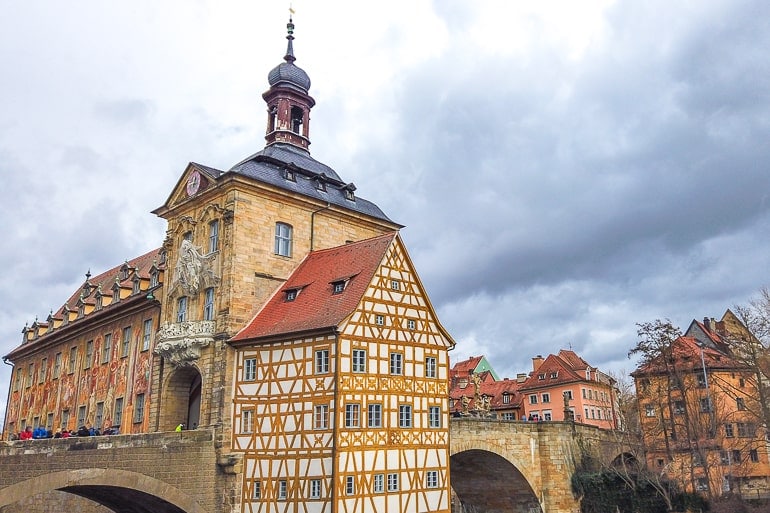
Bamberg is a small city – or larger town – in the German state called Bavaria. It’s actually located in a region called Franconia, which is noticeably different from the Bavaria that you might know in the area surrounding Munich, etc.
We’ve been to Bamberg multiple times over the years (it’s also close to the part of Germany where Lisa grew up) and are always happy to come back. Bamberg is known for its cute, historic old town which is actually a declared UNESCO World Heritage Site.
One of the most popular buildings the city has to offer is the Old Town Hall (shown above) which is built on an artificial island. The story behind it is quite interesting.
The drive from Erfurt to Bamberg is doable and will take approx. 2 hrs by car and around 3 hrs by train . On the way, you’ll drive through quite a few tunnels since you’ll drive through an area known as “Thuringian Forest”.
Accommodation in Bamberg: Bamberg is a small place to visit so there aren’t a ton of options but still enough to find what you’re looking for. You can check here for accommodations and hotels in Bamberg .
Anywhere you stay is basically in or close to the old town/city centre. For a place to stay with parking (for those arriving by car), check out Welcome Hotel Residenzschloss Bamberg . It’s located right on the river.
You might also want to see Palais Schrottenberg to stay right in the middle of the Old Town! For reference, the train station is a short walk to the north of the river – not far from these places in the centre.
Must-see Attractions in Bamberg:
- Bamberg Cathedral
- Old Town Hall
- Alte Hofhaltung
If you want some more information about Bamberg, please read our detailed Bamberg, Germany Guide .
Day 6+7: Munich
From Bamberg, your journey will continue to Munich which will be the last stop on this 7 day eastern itinerary. Not only is this the third biggest city of the country, it is also one of the most internationally known destinations in Germany.
Whenever we come back to Munich, we always enjoy our time there. For some reason, the atmosphere always feels more laid back than in other big German cities and the people are usually quite friendly. We might also be a little bit biased, though, since Lisa grew up in this part of the country and is more used to the mentality, dialect etc. than in other parts of Germany.
For this itinerary, you’ll spend two days in Munich since there is quite a lot to see. Next to the obvious attractions like the Marienplatz with the New Town Hall and the Frauenkirche close by, there are also lots of museums and other things that you can explore.
If you’ve already been to Munich before and/or decide that one day in the city is enough for you, you could also opt for a day trip on one of these days. We’ve just recently written a whole Day Trips from Munich Guide , which you can browse through to get some inspiration!
Driving from Bamberg to Munich will take about 2 hrs 20 minutes by car and between 2 and 3 hrs by train . If you decide to only take regional trains instead of the ICE (fast train), you should look into getting the Bayernticket. This can save you some money, especially when you’re travelling with more people.
Accommodation in Munich: Since Munich is so large and popular to visit, there is definitely no shortage of places to stay! You can check here for accommodations and hotels in Munich .
That said, we loved our stay at H2 Hotel München Olympiapark . Located up by the famous Olympic Park, we’d highly recommend it since it was amazing value for money. The breakfast was huge and delicious and there’s a metro station outside the lobby door that takes you into the heart of the old town in minutes. There’s also parking if you are arriving by car.
For a hotel that is a little more central, you should see the Platzl Hotel Superior this hotel is really popular – and for good reason. It’s located around the corner from attractions like Marienplatz and the famous beer hall, Hofbräuhaus.
For more help looking into accommodations and neighbourhoods in Munich, check out our where to stay in Munich guide .
(Check out our guide to one day in Munich if you want more details on things to do and see.)
Germany Itinerary 10 Days
Although we have tried to create short itineraries that allow you to see more than just the standard cities, it is no doubt easier to see more of Germany if you are able to travel for longer than one week. To give you a couple different options that you could look at (and then potentially modify), we have created two 10-day Germany itineraries.
Once again, we believe that ten days would not be enough time to see the whole country – and even if you managed to do that it would be too stressful (in our opinion). Both of the following itineraries give you a good mix of bigger and smaller cities as well as a few interesting day trips. So, have a look and see which one you like better!
Germany Itinerary 10 Days – North
If you’re interested in seeing more of the northern part of Germany and experiencing the mentality and way of life of people in the flatter part of the country, closer to the sea, then have a look at the following 10-day itinerary!
The total driving time would be slightly less than 17 hours with a distance of approx. 1470 kilometres. For these calculations, we have included the day trips to Schloss Drachenburg, Lübeck, and Flensburg. So, if you decide to skip any of these, your driving time and distance would obviously be slightly lower.
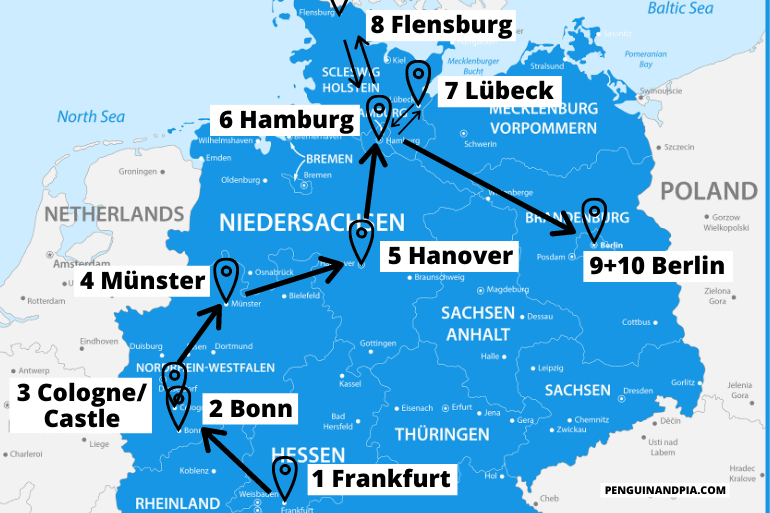
Day 1: Frankfurt Day 2: Bonn Day 3: Day Trip to Schloss Drachenburg / Cologne Day 4: Münster Day 5: Hanover Day 6: Hamburg Day 7: Day Trip to Lübeck Day 8: Day Trip to Flensburg Day 9+10: Berlin
Day 1: Frankfurt
Similar to some of the other itineraries mentioned in this article, we start this 10-day itinerary in Frankfurt. By now you should probably already know why – Frankfurt has the biggest airport of the country which should make it easier for people coming from overseas to get to Germany and start their adventure.
Furthermore, Frankfurt is quite centrally located so it is easy to get to many different cities from here. So even if you decide against following our itineraries step-by-step, Frankfurt would be a good starting point!
— Compare prices from rental car companies in Frankfurt here
Accommodation in Frankfurt : You’ll find plenty of places to stay in Frankfurt. You can check here for accommodations and hotels in Frankfurt .
One really popular hotel in Frankfurt is the Motel One Frankfurt-Römer . This Motel One is near the river and walking distance to lots of things in the city centre. If you are coming to Frankfurt with a car, Motel One has underground parking which can make life easy! They also have a nice breakfast.
A hotel option closer to the train station is Fleming’s Express Hotel Frankfurt . This hotel is just to the north of the main station which makes it a great option if you are arriving by train and have no car. It’s popular because it has a great breakfast and is good value for money.
Day 2: Bonn
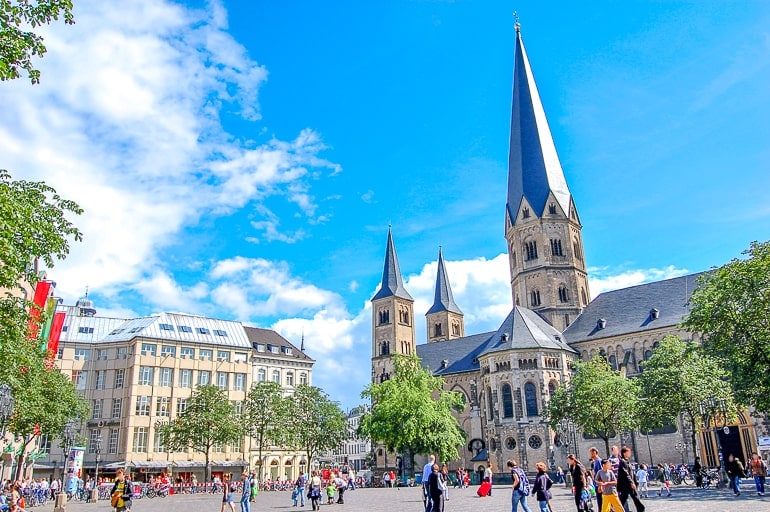
On the second day, you’ll head from Frankfurt to Bonn. As you might know, Bonn used to be the capital of the Federal Republic of Germany during the time that Germany was split into two countries. Later, the capital was relocated from Bonn to Berlin.
If you are interested in learning more about the history of Germany during your time in the country, then Bonn would be a good city to do that in. For example, you could visit the so-called “Haus der Geschichte” which is a museum about the history of the Federal Republic of Germany.
It won’t be difficult to get from Frankfurt to Bonn since the two cities are not too far apart. The journey will take approximately 1 hr 50 minutes by car and between 1 hr 20 minutes and 2 hrs if you take the train . Once again, we’d recommend that you book your train ticket in advance if possible.
Accommodation in Bonn: There are a number of accommodation options in Bonn which you can choose from – many are right in the city centre/old town. You can check here for accommodations and hotels in Bonn .
Keep in mind to book your accommodation for two nights for this itinerary. (You could also spend the following night in Cologne if you day tripped to there, though).
For a great hotel in the heart of the old town, check out BrauHotel Bonn . You can easily walk here from the central train station but they also have a and parking garage close by if you arrive by car. There’s also a craft beer bar on the ground floor!
Another option is the Hilton Bonn . This hotel offers you amazing views of the Rhine River. It’s a bit north of the city centre but still very much close to it. There is parking but it can be expensive so keep that in mind when you book.
Must-see Attractions in Bonn:
- Bonn Minster
- House of the History of the Federal Republic of Germany (Haus der Geschichte)
Day 3: Day Trip to Schloss Drachenburg / Cologne
On day three of this itinerary, you can choose to stay in Bonn, or go on one of two day trips: to Schloss Drachenburg (a castle not far from Bonn) or to Cologne which is also close by.
Schloss Drachenburg is actually a private villa/mansion that was built to look like a castle in the 19th century. Today, it is a popular attraction in the area.
From Bonn, you can either drive to Königswinter by car (and then leave your car at the car park) or take public transport to the Königswinter/Clemens-August-Straße station. You can find more information about that and opening hours etc. on the offical website .
If you are not a huge fan of castles, then you might opt for a day trip to Cologne instead. In this case, you might even decide to change your base and spend the night in Cologne instead of returning to Bonn at the end of the day. That is definitely an option that you can choose since there are lots of accommodation options in Cologne as well.
Getting to Cologne from Bonn will take you around 40 minutes by car (this can obviously depend on traffic) and only approx. 25 minutes by train . Just a quick warning: Trains can get very full if you are travelling during rush hour traffic – so try to avoid that if you don’t like being surrounded by lots of people in a small space.
Day 4: Münster
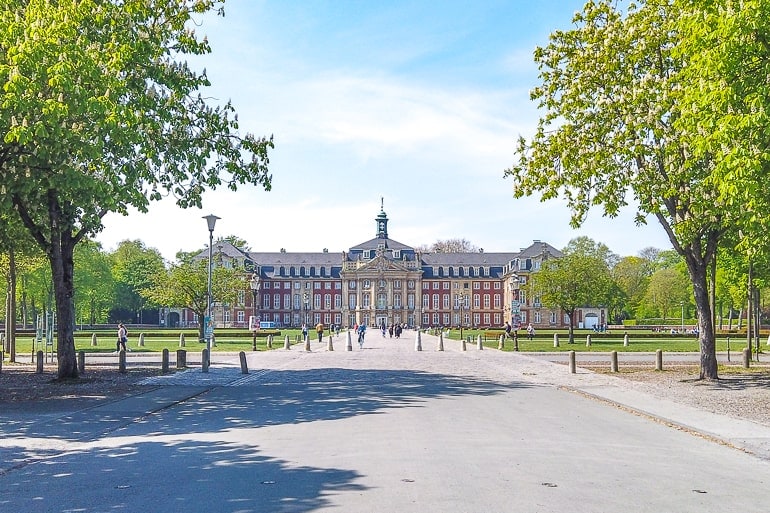
The next day you’ll head from Bonn – or Cologne – to Münster. Since Bonn and Cologne are so close, the journey wouldn’t really differ much from either city.
Münster is a smaller German city that we really enjoy. To be honest, it sometimes reminds Lisa of Copenhagen – mainly because of the many bikes that you can see all around the city. The University of Münster plays a big role in the city and the vibe – depending on which part of the city you are in – is noticeably younger.
One of the highlights of the city – for locals and visitors alike – is the lake Aasee which is located quite centrally. When the weather is nice, there are always people sitting on the grass enjoying the sun and maybe even out on the water (depending on the time of year). You can rent a small paddle boat to explore the lake from a unique perspective.
The journey from Bonn to Münster should take you slightly less than 2 hrs by car and between 2 hrs and slightly more than 3 hrs by train . If you want to save some money and are travelling with other people, then you should look into getting an “NRW Schönes Tag Ticket”. With this ticket, you wouldn’t be allowed to travel on ICE’s (the fast train), but the connections using only regional trains wouldn’t be much longer.
Accommodation in Münster: Münster might feel small but it’s actually pretty spread out and offers accommodations for all styles and budgets. You can check here for accommodations and hotels in Münster .
If you want a popular hotel option right in the centre, the H4 Hotel Münster is a short walk to the heart of the historic centre. It also has onsite parking for those travelling to Münster by car – but you can easily walk there from the train station in the south of the city centre.
Must-see Attractions in Münster:
- Münster Prinzipalmarkt
- Historic Town Hall
- Münster Cathedral
For a more detailed guide, have a look at our Things to do in Münster, Germany article .
Day 5: Hanover
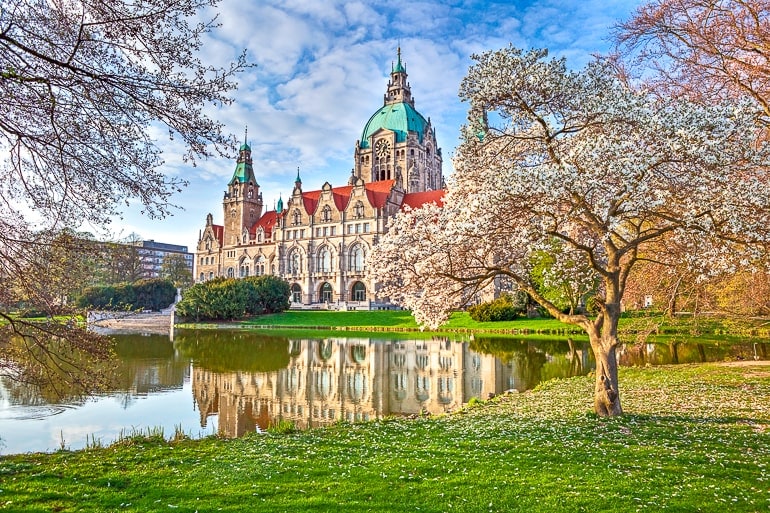
The following day you are travelling from Münster to Hanover. In German “Hannover” is actually written with two “n”, so don’t be surprised if you see it being written slightly differently.
Hanover is the biggest city and the capital of the German state called Lower Saxony. Compared to some other cities on this itinerary it is a less popular tourist destination. To be fair, even we haven’t spent that much time in Hanover yet. Hopefully we’ll be able to change that soon. However, that’s not to say that Hanover is not worth a visit.
Not only can you explore some beautiful gardens and interesting museums in the city, but it is also located pretty much halfway between Münster and Hamburg. That makes it a great stop to break up the journey and spent another day in a city that allows you to explore without too many other (international) tourists around.
By car , the journey from Münster to Hanover will take you around 2 hrs . If you choose to travel by train instead, it will take you approximately the same amount of time .
Accommodation in Hanover: Hanover is a larger city but the accommodation are still relatively packed together in and around the historic city centre. You can check here for accommodations and hotels in Hanover .
For a stay right in the city centre, check out the Hotel Loccumer Hof . This popular hotel is a very short walk from the central station which is perfect if you are arriving to Hanover by train. That said, they also have parking onsite so this hotel works well if you arrive by car!
For another hotel option, check out the Arthotel ANA Prestige am neuen Rathaus . This boutique hotel is directly across from the beautiful New Town Hall in the south end of the city centre by the greenspace and water! They also have a really nice breakfast and parking available.
Must-see Attractions in Hanover:
- New Town Hall
- Marktkirche
- Herrenhausen Gardens
Day 6: Hamburg
On day six of this 10-day itinerary you’re on your way to Hamburg. If you’ve read the details of any of the shorter itineraries in this article, you’ll know that we really like Hamburg.
The city offers modern areas, such as “HafenCity”, mixed with historic (e.g. “Speicherstadt”) and alternative areas (“Sternschanze”) . This makes exploring the city all the more interesting – there is truly something for everyone. During your time in the city, we’d also recommend that you climb the tower of the St. Michael’s Church. From up there, you get a beautiful view of most parts of the city.
The journey from Hanover to Hamburg won’t be long. Depending on the route you are taking (Highway A7 or A1), it’ll take between 1 hr 30 minutes and 2 hrs by car . If you opt for the train , you can expect the journey to take between 1 hr 15 minutes and 1 hr 30 minutes . This depends on the connection you choose.
Accommodation in Hamburg : Hamburg has many, many places to stay. You can check here for accommodations and hotels in Hamburg .
The Mövenpick Hotel Hamburg might be a good option if you have a car while you travel around Germany. This cool hotel is inside an old water tower which gives guests stunning views of the city around. There’s also parking onsite and it’s close to a transit stop for getting around the city.
Located not too far from the central train station, ARCOTEL Rubin Hamburg makes for a good hotel option if you don’t have a car. It’s located in St. Georg which is a lively area within walking distance of the city centre.
Those that need hostel for their stay in Hamburg might be happy with Generator Hamburg . It’s a popular hostel in the city and is close to the train station for easy getting around. If you’re unsure about where to stay, you can always check out our detailed guide on where to stay in Hamburg .
Once again, if you’d like to read our (very) short Hamburg guide, you can find our Things to do in Hamburg article here .
Day 7: Day Trip to Lübeck
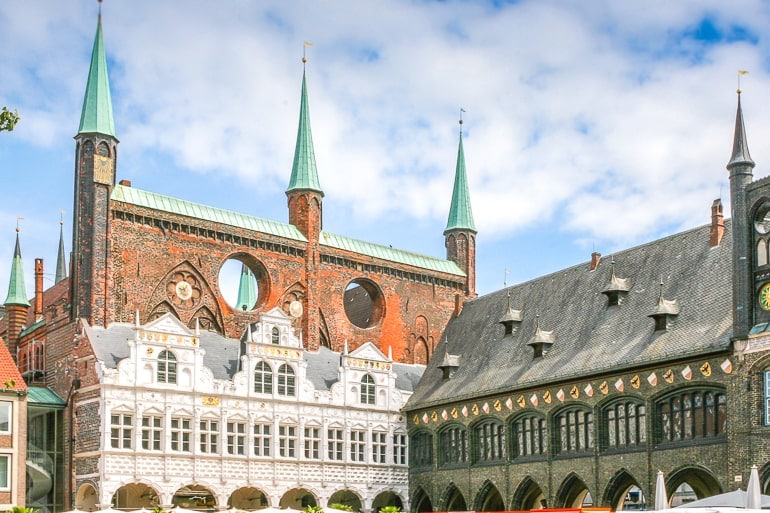
For the next couple of days, we decided to include some day trips from Hamburg. This allows you to stay in one accommodation for longer than just one night and gives you the option to see some more of Hamburg as well. If you don’t want to visit any other cities and want to spend more time in Hamburg instead, then feel free to skip one or both of the day trips mentioned.
Lübeck is the closer one of the two day trips mentioned from Hamburg. Within Germany the city is mainly known for its delicious “Lübecker Marzipan” (Lübeck Marzipan) – but of course there is much more to the city than just that. One of the highlights is the Holsentor, a red-brick city gate dating back to the 15th century.
The journey from Hamburg to Lübeck will take you slightly over 1 hr by car and just around 45 minutes by train . In our opinion, that’s great for a day trip since it gives you lots of time to actually see the city instead of spending a lot of time in the car/on the train.
Must-see Attractions in Lübeck:
- Marienkirche
- Heilig-Geist-Hospital
Day 8: Day Trip to Flensburg
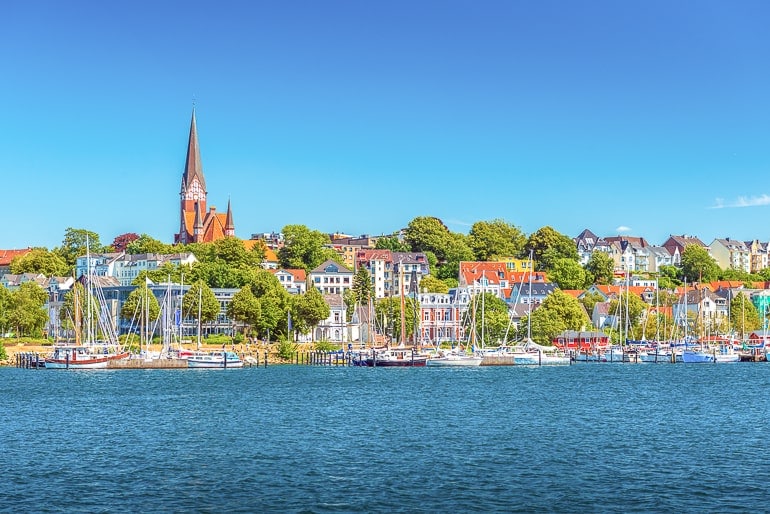
For the following day, we have another day trip option for you. The journey to Flensburg is slightly longer than to Lübeck – but it would be worth it. Flensburg is a smaller German city in the north of Germany, very close to the Danish border.
Since it is located close to the water, shipping plays an important role in the city to this day. If you’re interested in learning more about that, then the Maritime Museum would be a good place for you to visit.
Another thing we would recommend is a walk along the Rote Straße. Here you’ll find different “Hinterhöfe” (similar to backyards) with cute cafes and small shops.
Getting to Flensburg from Hamburg should take slightly less than 2 hrs by car and the same amount of time by train . As already mentioned, it would be a longer journey than to Lübeck, but if you want to experience a smaller, maritime city, the trip would be worth it!
Must-see Attractions in Flensburg:
- Historischer Hafen (Historic Harbour)
- Flensburger Schifffahrtmuseum (Maritime museum)
- Museumsberg Flensburg
Day 9+10: Berlin
On the second to last day of this itinerary, you’ll head from Hamburg to Berlin where your journey ends. This allows you to spend two days in the German capital. Since there is so much to do in Berlin, we’d recommend that you do some research beforehand to narrow down which attractions you’d like to visit.
If you’ve never been to Berlin before classics like the Brandeburg Gate and the Reichstag would be a good place to start. We’ve written a few different articles about Berlin – one about classic attractions (link below). Maybe these will be a good starting point to gather some more information!
The drive from Hamburg to Berlin will be one of the longest mentioned as part of this itinerary – so you should keep that in mind. It’ll take approximately 3 hrs 20 minutes by car (with traffic it could be longer), but just 1 hr 50 minutes by train .
It’s a popular train route since it connects the two biggest German cities so trains run frequently throughout the day. Once again, we’d recommend to book your train ticket in advance to get one of the discount tickets and save some money.
Accommodation in Berlin : As the capital city, there are lots of accommodation options for Berlin. You can check here for accommodations and hotels in Berlin .
Those travelling to Berlin with a car should look into the Park Plaza Wallstreet Berlin Mitte for a hotel in the city centre with free street parking available. There’s always paid parking for a reasonable fee if those are full and you’ll be close to top attractions.
The NH Collection Berlin Mitte am Checkpoint Charlie is a popular hotel option for those coming to Berlin by train since it’s close to attractions in the city centre and you can get there very easily with the metro.
Finally, if you need a hostel/hotel, check out PLUS Berlin . This is where Eric stayed a few years back and really enjoyed it. You’ll be close to the East Side Gallery – the part of the Berlin wall with the artwork on it. It’s also easy to get in and out of the city centre from here.
Also feel free to have a look at our guide on Berlin Attractions and tips for a day in Berlin .
Germany Itinerary 10 Days – South
This 10 day Germany itinerary begins and ends in Frankfurt – so it’s pretty much a small loop through the southern part of the country. If you want to be closer to the mountains (for part of the trip at least) instead of the sea, then this itinerary might be better suited for you than the other 10 day version.
For this itinerary, the total driving time would be slightly over 17 hours with a total distance of approx. 1330 kilometres. This includes the day trips to Neuschwanstein Castle, Garmisch-Partenkirchen, and Tübingen. So depending on if/how you modify the itinerary, these estimates could differ.
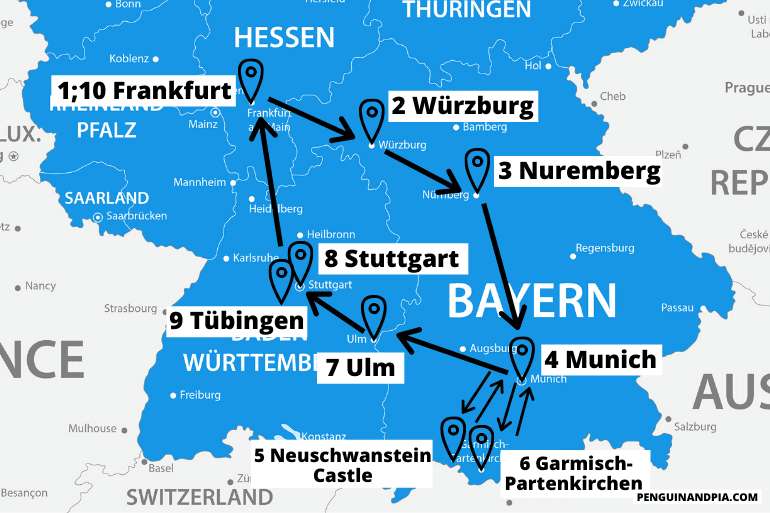
Day 1: Frankfurt Day 2: Würzburg Day 3: Nuremberg Day 4: Munich Day 5: Day Trip to Neuschwanstein Castle Day 6: Day Trip to Garmisch-Partenkirchen Day 7: Ulm Day 8: Stuttgart Day 9: Day Trip to Tübingen Day 10: Frankfurt
Similar to the northern version of this itinerary for 10 days, you begin your adventure in Frankfurt. During your day in the city, you shouldn’t forget to visit the Römerberg with the beautiful half-timbered houses. If you want to get a nice few of the city from above, then you should look into visiting the Main Tower as well.
Frankfurt is also a great place to pick up your rental car – if you decide to complete this itinerary by car instead of using public transport. You can either pick up a car at the airport or at different spots in the city centre. This obviously also depends on the rental company you choose.
Accommodation in Frankfurt: Frankfurt is full of accommodation options – from the city centre to the airport. You can check here for accommodations and hotels in Frankfurt .
For a hotel in the heart of the city, check out the Motel One Frankfurt-Römer . Complete with underground parking, good breakfast, and a top location in the centre and close to the river, this hotel is a decent option if you are travelling around with a car.
For those not travelling with a car (and taking the trains around Germany), check out Fleming’s Express Hotel Frankfurt . This nice looking hotel is really popular for its breakfast, price, and the fact that it’s steps from the central train station.
Day 2: Würzburg
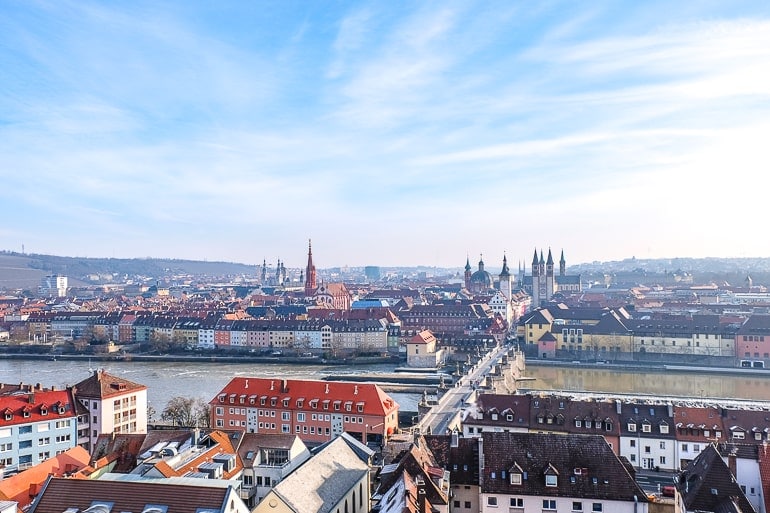
On day two of this itinerary, you’ll be on your way to Würzburg, a small German city that we’re always happy to return to. Similar to Stuttgart, Würzburg is located in a region that is known for its wine.
As such, it comes as no surprise that a highlight in Würzburg is to drink a glass of (white) wine on the Old Bridge across the Main river. We’ve done that multiple times and would especially recommend it during the evening when it gets dark.
Another thing you shouldn’t miss in Würzburg is the short walk up the hill to Marienberg Fortress. Up there you can not only explore the old fortress, but you also get a beautiful view of the old town and other parts of the city.
We actually wrote a whole guide about Würzburg (link below) where we not only talk about things to do but also mention some great cafes and restaurants!
The drive from Frankfurt to Würzburg will be a short one. It should only take you around 1 h 20 minutes by car and between 1 h 07 minutes and 1 hr 50 minutes by train depending on the type of train you’re taking (ICE vs. regional train).
Accommodation in Würzburg: Würzburg isn’t a huge city so you’ll find a number of places to stay packed together in the city centre and a number of other hotels and guesthouses around. You can check here for accommodations and hotels in Würzburg .
On a recent trip, we stayed at the Best Western Hotel Würzburg-Süd . It’s a little south of the city centre but the tram stop is right outside the hotel so you’re into the historic city centre in minutes. There is also an onsite parking lot if you’re arriving to Würzburg by car. We booked this one last minute but we would stay again.
If you want to stay a little more central, then you can check out Hotel Strauss . With a location close to the river, the train station, and the city centre – it’s a great option fo those arriving by train.
We also once stayed at Hostel Babelfish for a budget accommodation and it was honestly not too bad, either. It’s right across from the train station for easy access in and out of the city.
Must-see Attractions in Würzburg:
- Marienberg Fortress
- Würzburg Residence
If you want more tips for visiting Würzburg, have a look at our detailed Things to do in Würzburg Guide (+ insider tips) .
The next day you’ll be on your way to Nuremberg, which is another city in Bavaria that we really like. In German, Nuremberg is actually written/called “Nürnberg” – just an FYI, so you’re not confused when you see this written somewhere.
As we have already mentioned in the description of one of the shorter itineraries, there is a lot of history to be found in the city. Not only can you explore an old castle in the middle of the city, you can also learn a lot about Germany’s dark history if you’re interested.
Getting from Würzburg to Nuremberg will take approx. 1 hr 20 minutes by car and between 53 minutes (ICE) and 1 hr 13 minutes (regional) by train . If you’re travelling with more people and decide to just take a regional train, look into getting a “Bayernticket” as that could save you some money.
Accommodation in Nuremberg : Nuremberg is a larger and well-travelled city in Germany so you will have no problem finding a place to stay! You can check here for accommodations and hotels in Nuremberg .
We ended up staying in the very popular Five Reasons Hotel and Hostel and we enjoyed our stay. The room was bright with new furnishings. It’s also located just inside the old city walls so we were close to the metro, a short walk to central train station, and also close to the heart of the old town!
Very nearby was the Sheraton Carlton Nuremberg – we had friends stay there. They really liked this hotel which had a swimming pool with city views and other great perks. If you are arriving to Nuremberg by car, there’s a parking lot across the street from the hotel as well as street parking around. The train station is very close as well so it’s a great location overall.
- Documentation Center Nazi Party Rally Grounds
Day 4: Munich
On day four of this Germany trip, you’ll be on your way to Munich. As you might know Munich is the capital of the German state called Bavaria and there are lots of things to do in this city.
That’s why you’ll spend three nights in Munich. This way you can explore the city in more detail if you want or go on a couple of day trips from Munich to see other popular attractions as well. It’s really up to you.
The journey from Nuremberg to Munich won’t be overly long and it’s a route Lisa has driven many times. It’ll take you around 2 hrs by car (of course traffic depending) and between 1-3 hrs by train.
Since this is a popular train route, there are lots of different connections of varying length – some are quick and others are slower trains with more stops. Since that’s the case, we’d recommend that you plan in advance and try to catch a better connection to avoid an unnecessarily long train ride!
Accommodation in Munich: Since Munich is such a popular and large city, there are plenty of accommodation options for you to choose from. You can check here for accommodations and hotels in Munich . Just remember to book your accommodation for three nights if you are following this itinerary!
We stayed at the H2 Hotel München Olympiapark which is a very popular hotel because of the price and the value. It was a prefect stay. The breakfast was amazing, they had parking, and the location was great – only a quick metro to the heart of the city centre. You also have the Olympic Park and BMW Museum as top attractions nearby!
If you’re itching to stay right in the heart of the action in Munich, check out the Platzl Hotel Superior . This is a hotel around the corner from Marienplatz in the old town with the famous beer hall Hofbräuhaus just steps away. The central train station is also walkable from here.
Of course, you can learn all about the best areas to stay in more detail with our Munich accommodation and neighbourhood guide .
Learn more about Munich with our one day in Munich post!
Day 5: Day Trip to Neuschwanstein Castle
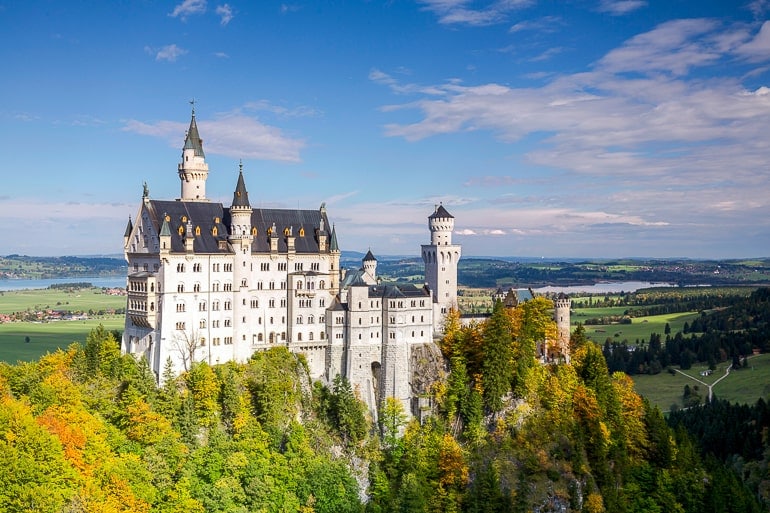
Neuschwanstein Castle probably doesn’t need a lot of introduction – it is arguably one of the most popular day trips from Munich. If you want to see this fairy-tale castle with your own eyes, then this day trip might be for you.
However, it is such a popular attraction that depending on the time of year it can get incredibly crowded. So if you are planning this itinerary for the middle of summer, we’d honestly recommend that you think twice about whether you really want to do this day trip. A second day in Munich wouldn’t be so bad either, would it?
If you are set on visiting Neuschwanstein Castle, then have a look at our Day Trips from Munich Guide . In that article – under the Neuschwanstein Castle section – we talk about all the different ways you can get to the castle.
In case you don’t want to stress too much about logistics and are not travelling with a rental car, you could always look into a day tour that brings you to Neuschwanstein Castle and then back to Munich. Here are some examples:
- Neuschwanstein and Linderhof Palace – A very popular tour to check out two castles in one day!
- Just Neuschwanstein Castle – Grab your live guide and check out the classic castle you came to see!
- Neuschwanstein Castle and Füssen – Explore the surrounding area on this day trip + see that great castle!
Day 6: Day Trip to Garmisch-Partenkirchen
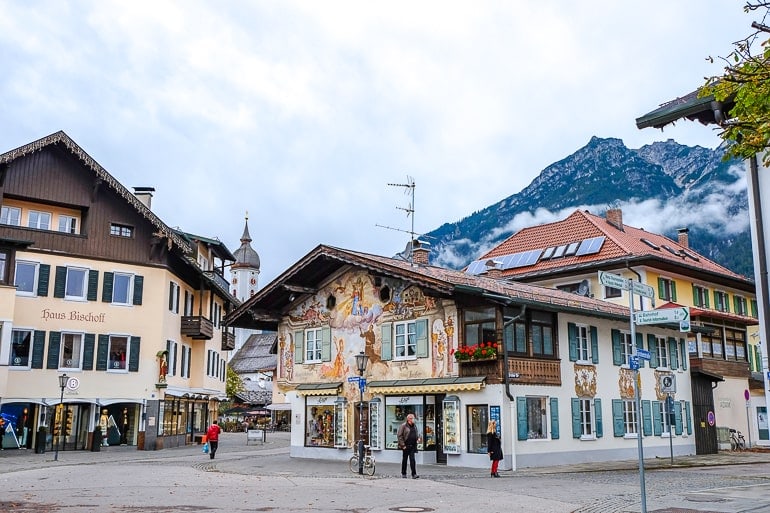
Another popular day trip from Munich – and the one we would recommend for Day 6 of this itinerary – is a trip to Garmisch-Partenkirchen in the south of Bavaria, close to the Austrian border.
We have been to Garmisch-Partenkirchen recently and really enjoyed our day there. However, that was during the shoulder season, so we can’t really say much about how busy it gets in the summer or during the ski-season.
There are a few good reasons for visiting Garmisch-Partenkirchen. The obvious one is that the town is super close to the mountains and it is very easy to reach the “Zugspitze” (Germany’s highest mountain) from here.
Of course, you don’t have to go that high up – there are also lots of other mountains and great hiking trails in the area if you’re looking for a day in nature.
Other reasons why people come to Garmisch-Partenkirchen is to visit the Partnach Gorge which is quite beautiful and/or the old town where you can admire the decorative paintings found on many houses.
It’s actually quite easy to get from Munich to Garmisch-Partenkirchen. By car , it should take you around 1 hr 10 minutes and by train the journey would be approx. 1 hr 22 minutes . It’s actually a nice drive/train ride since you’ll get some great views of the mountains as you get closer to your destination.
Must-see Attractions in/close to Garmisch-Partenkirchen:
- Partnach Gorge
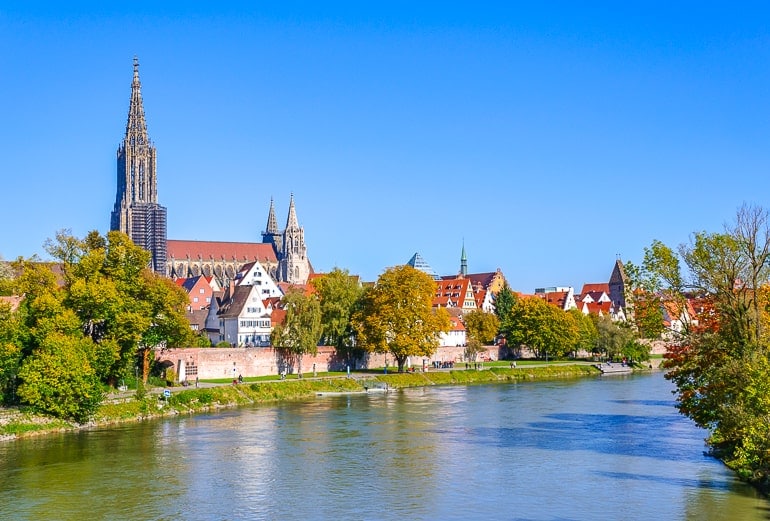
The following day you’ll travel from Munich to Ulm, a small city in the German state of Baden-Württemberg. It is actually located right by the border with Bavaria – “Neu Ulm” in fact is a city on the Bavarian side. When you’re there, it sometimes feels like it is just one bigger city. For you as a visitor, this doesn’t really matter – just an interesting side note.
Ulm is mainly known for having the church with the tallest steeple in the world – so that is something you shouldn’t miss during your visit. Other than that, we’d also recommend that you check out the Fishermen’s Quarter where you can find some beautiful, half-timbered houses.
Getting from Munich to Ulm won’t take you long. The journey will take approx. 1 hr 40 minutes by car and between 1 hr 19 minutes and 2 hrs by train. Once again, this depends on which type of train connection you choose (ICE vs. regional trains).
Accommodation in Ulm: It’s best to stay in the centre of Ulm since it’s not huge and the attractions can mostly be found there. You can check here for accommodations and hotels in Ulm .
For a boutique hotel option right in the city centre, check out Boutique 005 Ulm City . This hotel is super walkable to the train station if you are arriving by train but also offers an option for parking. It’s location makes it really close to all the top attractions in the city.
For a stay closer to the river, you can check out the Hotel am Rathaus – Hotel Reblaus . With onsite parking available and a really good breakfast, this more “authentic” hotel is an experience not to be missed in Ulm.
Must-see Attractions in Ulm:
- Ulmer Münster
- Fishermen’s Quarter
Day 8: Stuttgart
From Ulm, you’ll head to Stuttgart on the next day. Stuttgart is a city that we have mentioned a few times in this article already. If you’ve read some of the other itineraries, you’ll know that Stuttgart is known for both cars and wine.
Of course, there’s more to see in the city than that. If you’re interested in architecture, you might enjoy visiting the New Palace at the “Schlossplatz” and if you’re into art, the Staatsgalerie (an art museum) might be for you.
Getting to Stuttgart from Ulm will only take slightly over 1 hr by car and approx. the same amount of time by train . There are slower trains – called RB instead of RE which stands for “Regional Express” – that take longer than that. However, if you plan ahead, you shouldn’t have a problem catching an RE or ICE Train since they run frequently throughout the day.
Accommodation in Stuttgart: Since there are a number of places to stay in, you can check here for accommodations and hotels in Stuttgart .
Those with a car can check out the Abalon Hotel ideal because it has an underground parking garage while those travelling to Stuttgart by train can check out the Pension am Heusteig since it’s easy to get to walking or with the metro.
Day 9: Day Trip to Tübingen
On day 9 of this itinerary, you have the choice between either spending a second day in Stuttgart or taking a day trip to Tübingen, a university town not far away.
Tübingen is a popular day trip from Stuttgart and is mainly known across the country for its old university. In fact, some of Lisa’s friends have studied there. When in town, you shouldn’t forget to visit the market square with its 15th century town hall. Another popular attractions is the Hohentübingen Castle on the hill which nowadays is home to a museum.
It won’t take you long at all to get to Tübingen from Stuttgart. That makes it great for a (half-)day trip. The journey should only take around 42 minutes by car and between 43 minutes and 1 hr 30 minutes by public transport – depending on the connection you choose.
Must-see Attractions in Tübingen:
- Hohentübingen Castle
- Market Square with Town Hall
- Hölderlinturm
Day 10: Frankfurt
On the last day, you’ll make your way back to Frankfurt. This is where your itinerary ends since it will hopefully be easy for you to get back home from here.
The journey from Stuttgart back to Frankfurt will probably be the longest one for this trip – but it’s still easily doable. It should take you approx. 2 hrs 25 minutes by car and between 1 hr 17 minutes and 3 hrs 30 minutes by train. Once again, this is dependent on the connection you choose (ICE vs. regional trains).
Accommodation in Frankfurt: Since you’re back in Frankfurt, we already went over accommodations in Day 1 of this same itinerary. That said, you can check here for accommodations and hotels in Frankfurt and specifically check out the Motel One Frankfurt-Römer for a central hotel with parking.
Germany Itinerary 14 Days
This Germany itinerary is the longest one that we have for you – for now. If anyone is interested in a 21 day version, please let us know!
The distance you’d cover with this 14 day itinerary would be around 1960 kilometres . The driving time would be approx. 22.5 hours – but of course, this varies depending on traffic and the exact route you decide to take.
As you’ll see below, sometimes the driving time between two cities is longer than 3 hours. So, while this itinerary is totally doable in two weeks – if you wanted to slow down the pace a bit, you could just as easily spend more time in some of the cities and complete the itinerary in more days.
Since you have probably already read about most of these places in some of the itineraries above, we’ll try to keep the descriptions short and not get too repetitive.
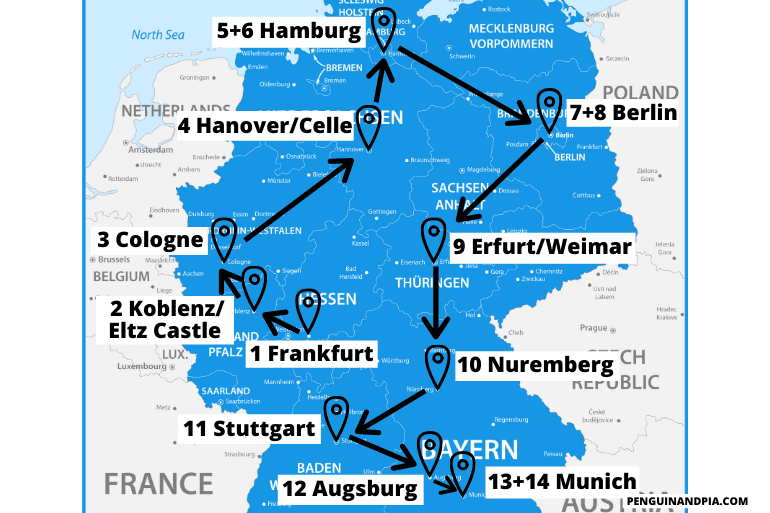
Our version here is written as an “incomplete route” from Frankfurt to Munich. However, as with most of our itineraries, you are welcome to reverse the direction if that works better for you and/or start and end in the same city. So, to see a big part of the country, your 14 day Germany itinerary could look something like this:
Day 1: Frankfurt Day 2: Koblenz / Eltz Castle Day 3: Cologne Day 4: Hanover or Celle Day 5+6: Hamburg Day 7+8: Berlin Day 9: Erfurt or Weimar Day 10: Nuremberg Day 11: Stuttgart Day 12: Augsburg Day 13+14: Munich
Once again we begin this itinerary in Frankfurt since it is an easy city to get to. As we have mentioned before, there are a few things to see in the city so you can start exploring on day one!
Frankfurt is also a great city to pick up a rental car. Since many international (business) travellers fly into Frankfurt, there should be many cars available with automatic transmissions. In smaller German towns you’ll find that this is not always the case.
Accommodation in Frankfurt: If you are making a stop in Frankfurt, you can check here for accommodations and hotels in Frankfurt .
As for accommodation options, the Motel One Frankfurt-Römer has parking available and is located in the city centre close to the Main River. That’s important if you have a car with you but it’s also walkable to the train station, so you know.
Another great hotel option that is even closer to the train station is Fleming’s Express Hotel Frankfurt . This hotel is known for its prime location to the north of the station, its tasty breakfast, nice decor, and fair price. This is definitely a popular place you should at least look into if you are travelling by train around Germany.
Day 2: Koblenz / Eltz Castle
On day two of this itinerary, you’ll be on your way to Koblenz, a small German city on the Rhine river. You can either explore the city or use it as a base to visit one of the many castles close by.
Our suggestion would be a visit to Eltz Castle which is a beautiful medieval castle surrounded by a forest. Please keep in mind that the castle is not open year round. You can check opening hours here .
You could also visit Eltz Castle as a day trip from Frankfurt but then you’d have to return to Frankfurt at the end of the day. This wouldn’t make much sense unless you want to spend some more time in Frankfurt anyway, as Cologne (your next destination) is closer to Koblenz and Eltz Castle than Frankfurt.
The drive from Frankfurt to Koblenz should take around 1 hr 30 minutes by car . If you want to take the train , the journey would take between 1 hr 30 minutes and 2 hrs 15 minutes . From Koblenz, it is only about a 30 minute drive to Eltz Castle.
Accommodation in Koblenz: Since Koblenz isn’t that large, you should have no problem finding and choosing an accommodation that works for you. You can check here for accommodations and hotels in Koblenz .
If you want a popular option right in the heart of the city centre, you should see the Sander Hotel . This hotel is located within walking distance to the rivers as well as restaurants and shops in the centre. If you travel by car to Koblenz, they have onsite parking which is handy. That said, you can also easily walk from the hotel to the train station in minutes.
Day 3: Cologne
The next stop on your 14 day Germany itinerary is Cologne, a city we have mentioned already in some of the previous itineraries. As you might know, the highlight of the city is the Cologne cathedral which is quite an impressive sight. As the city is located on the Rhine river, a boat tour might also be a great activity depending on the time of year you are visiting.
Getting to Cologne from Koblenz takes around 1 hr 15 minutes by car and between 50 minutes and 1 hr 15 minutes by train . The train tracks follow the Rhine river for part of the journey which allows for some beautiful views!
Accommodation in Cologne : There are lots of great places to stay in Cologne. You can check here for accommodations and hotels in Cologne .
We recently stayed at the Lindner Hotel City Plaza which was great value for money. The breakfast buffet is incredible and it’s an easy, short walk into the city centre near the Cathedral. It also has parking available for those with a car.
If you want to stay a little closer to the river and the Old Town, check out the CityClass Hotel Residence am Dom . With many things around to keep you busy – like attractions, food, and/or drinks – you’re just a short walk to the central train station if you stay here.
For those looking for a hostel, Cologne Downtown Hostel was a great stay for Eric a number of years ago. It’s really popular, in a great location, and has a nice rooftop balcony to enjoy.
Day 4: Hanover or Celle
Day 4 of this itinerary will take you to either Hanover or Celle depending on your preference. Celle is a noticeably smaller city/town than Hanover and the two places are only a few minutes apart.
Getting from Cologne to Hanover will take approximately 3 hrs 10 minutes by car and between 2 hrs 40 minutes and 3 hrs 5 minutes by train .
Accommodation in Hanover: Since Hanover is a well-travelled city for people moving around Germany, there are a number of accommodation options in and around the city centre. You can check here for accommodations and hotels in Hanover .
To stay very close to the central train station in the city centre, you should see the Hotel Loccumer Hof . The location makes it great if you are travelling by train and on foot. They also have onsite parking if you are arriving to Hanover with a car!
To the south of this hotel, the Arthotel ANA Prestige am neuen Rathaus is an option right across from the New Town Hall. This hotel has a beautiful, light style and is also close to the water/parks. Complete with breakfast and onsite parking, you can’t go wrong here!
If you want to spend a night in a smaller German city instead, then Celle is a good option as it is not far from Hanover. That will make it easy to reach the next stop on your itinerary without too much of a detour. The journey from Cologne to Celle would be slightly longer and take around 3 hrs 30 minutes by car and 3 hrs 19 minutes by train .
Accommodation in Celle: Celle isn’t that big at all – so there are only a handful of places to stay. That said, there are still some great options. You can check here for accommodations and hotels in Celle .
Of note, check out Hotel Borchers . This hotel – one of only a handful located in the heart of “city centre” is a top pick with a tasty breakfast and an underground car park. You can also walk there from the Celle train station which is located not too far across town.
Must-see Attractions in Celle:
- Celle Castle
- Bomann Museum
- French Garden
Day 5+6: Hamburg
An itinerary across a large part of the country wouldn’t really feel complete without including Hamburg. Since there is quite a bit to see in this hanseatic city, you’ll spend two nights in the city to give you more time to explore.
Getting from Hanover to Hamburg will take you approx. 1 hr 45 minutes by car and between 1 hr 15 minutes and 2 hrs 30 minutes by train . As mentioned before, this varies depending on the type of train connection you choose.
The journey from Celle to Hamburg will be approximately 15 minutes shorter at 1 hr 30 minutes by car . If you opt for the train, you can expect travel times between 1 hr 10 minutes and 2 hrs .
Accommodation in Hamburg : Since Hamburg is a well-travelled city, it makes sense that there are loads of places and areas to stay in. You can check here for accommodations and hotels in Hamburg .
The Mövenpick Hotel Hamburg might work for those with a car since they have onsite parking. This old water tower is a different hotel than you might be used to but it’s a great experience overall.
Something closer to the central station to get to on foot would be the ARCOTEL Rubin Hamburg which is located in St. Georg. This is an area with shops and restaurants and is very much part of the city centre.
Those looking for a budget accommodation can check out Generator Hamburg which is a popular hostel close to the train station. If you’re ever unsure or want more advice, we have a detailed guide on where to stay in Hamburg .
Day 7+8: Berlin
Of course, we couldn’t forget to include a stop in the capital of the country when planning a longer trip through Germany. Since there is so much to do and see in Berlin you will spend two nights there.
This will also give you some more time to recover from all the driving you have done so far on this journey. Getting from Hamburg to Berlin takes approximately 3 hrs 20 minutes by car (obviously traffic depending) and just about 1 hr 50 minutes by train .
Accommodation in Berlin : There are lots of hotel options in Berlin. You can check here for accommodations and hotels in Berlin .
The Park Plaza Wallstreet Berlin Mitte is a good option in the city centre for those coming to Berlin with a car while the NH Collection Berlin Mitte am Checkpoint Charlie is located right at the attraction “Checkpoint Charlie” in the city centre.
A great option for a hostel/hotel where Eric stayed a few years back is PLUS Berlin . You can find it near the famous East Side Gallery which is a very popular attraction to check out.
As mentioned a few times now, we also have more articles on t hings to see in Berlin and a one day Berlin itinerary .
Day 9: Erfurt or Weimar
For the following day you have the choice between Erfurt or Weimar as your next destination. Both are small cities in the state of Thuringia with Weimar being smaller than Erfurt. If you know anything about Martin Luther, an important figure in the Protestant reformation, then you might have heard of one or both of these places before.
If you’re looking for a place with a beautiful old town and some nice churches as well as buildings for you to explore, then we’d really recommend Erfurt. We had a great time during the days we spent there. The city also has some really nice, cozy cafes if that is something that you care about.
Getting to Erfurt from Berlin will take a while – but it is a great stop on the way to the south of Germany. You can expect the journey to take approx. 3 hrs 40 minutes by car and just around 1 hr 50 minutes by ICE (fast train) .
Accommodation in Erfurt: With Erfurt being a smaller city with a smaller central area to explore, finding a place to stay isn’t too difficult. You can check here for hotels and accommodations in Erfurt .
When we visited Erfurt, we booked the Gästehaus in der Gotthardtstraße . This was a simple guesthouse with a nice host and cozy rooms located just a short walk north of the Krämerbrücke. There’s also a small parking lot onsite if you’re coming to Erfurt with a car.
For a stay that is more central, check out Hotel Krämerbrücke Erfurt . It’s located basically right beside the Krämerbrücke making it a great option if you are travelling by train and you’re on foot.
Once again, if you want to learn some more about Erfurt before you visit the city, check out our detailed Erfurt Guide here .
If you instead preferred to learn some more about the well-known German writers Goethe and Schiller – or about Germany’s dark past – then you should plan to visit Weimar instead.
Two of the highlights there are Goethe’s and Schiller’s House – now turned into museums. Close to Weimar there’s also the Buchenwald Memorial which was a former Nazi concentration camp. This was the first KZ-Memorial Lisa ever visited. It was a somber experience, but also an important one in regards to understanding more about Germany’s past.
The journey from Berlin to Weimar will be slightly shorter than to Erfurt – at least by car. It’ll take approx. 3 hrs 15 minutes by car and around 2 hrs 20 minutes by train .
Accommodation in Weimar : There are a handful of places to stay in Weimar since it’s a smaller city – but you still have good options. You can check here for accommodations in Weimar .
In particular, check out Amalienhof Hotel und Apartment . This classic and very popular hotel is just south of the heart of the city centre. It features parking onsite and an excellent breakfast. It’s also not too far to walk to the train station if you are arriving on foot.
Must-see Attractions in/close to Weimar:
- Buchenwald Memorial
- Goethe’s House
- Schiller’s House
Day 10: Nuremberg
On day 10 of your itinerary, you’ll drive – or take the train – from Erfurt/Weimar to Nuremberg. This Franconian city has also been mentioned in some of the shorter itineraries.
The journey from Erfurt to Nuremberg will take approx. 2 hrs 40 minutes by car in a southern direction. The drive from Weimar to Nuremberg will just be a couple minutes longer.
If you decide to take the train, the journey would take between 1.5 hrs and 2 hrs from Weimar and between 1 hr 10 minutes and 1 hr 30 minutes from Erfurt .
Accommodation in Nuremberg : Nuremberg is a city with loads of history and attractions so it’s very popular. As such, you will find hotels and accommodations all over the city – from the old town to the surrounding areas. You can check here for accommodations and hotels in Nuremberg .
We booked a stay at Five Reasons Hotel and Hostel and we would recommend it. You can find the place inside the massive old city walls so the location was great – walkable to the central train station and also to go find top attractions.
On the same trip, friends of our stayed at the Sheraton Carlton Nuremberg . It was close to where we stayed and they really enjoyed it. There’s this great pool on an upper floor with city views as well as a parking lot across the street if you travel to Nuremberg by car. The train station is close as is the old town by walking so it’s great option overall, too.
Day 11: Stuttgart
The following day you will be on your way from Nuremberg to Stuttgart – once again, a city we have mentioned multiple times now during this article. From Nuremberg, it’ll take you around 2 hrs 15 minutes by car and between 2 hrs 10 minutes and 2 hrs 30 minutes by train to get to Stuttgart.
As we’ve mentioned before, if you are driving and have the time, you could take a small detour and stop in Rothenburg ob der Tauber for a stroll through its beautiful old town. We’ll leave that up to you!
Accommodation in Stuttgart: You can check here for accommodations and hotels in Stuttgart .
The Abalon Hotel ideal has parking for those with a car while the Pension am Heusteig is a guesthouse close by but is easy to get to by the metro system if you arrive by train to central station and you are walking.
Day 12: Augsburg
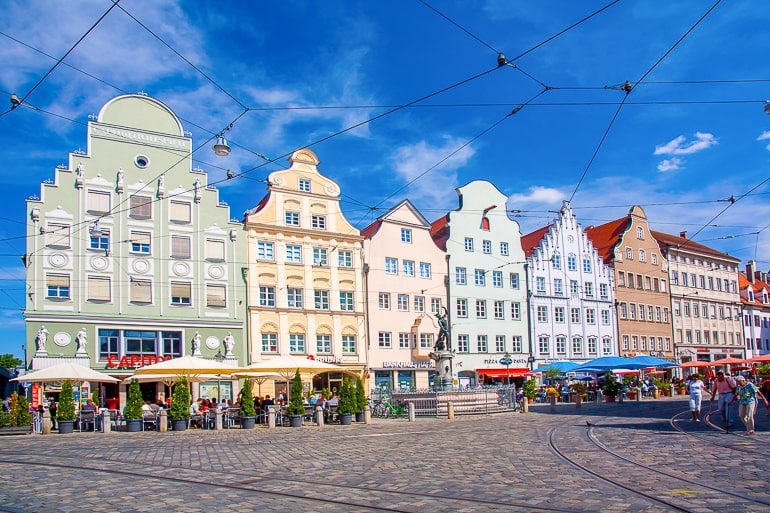
On day 12 you’ll be on your way from Stuttgart to Augsburg, a small city in Bavaria and one of Germany’s oldest cities. Around Germany, most people have heard of Augsburg because of its “Fuggerei” – a historic social housing complex where rent has increased very slowly over the centuries. It’s certainly worth a visit!
It’ll take you around 2 hrs by car to get from Stuttgart to Augsburg. If you opt for the train , then you can expect the journey to take approx. 1 hr 40 minutes .
Accommodation in Augsburg: In Augsburg, you will find a number of places to stay around the city centre. You can check here for accommodations and hotels in Augsburg .
For a reliable stay, check out Hotel Augusta . This popular hotel – located right in the city centre – features breakfast and has parking available if you are travelling to Augsburg by car.
The nice thing about Augsburg is that because it’s a smaller city, you can easily walk to the hotel from the train station if you are arriving by train.
You might also check out City Hotel Ost am Kö which is another hotel in the heart of the centre walkable to the station. It also has breakfast and parking garage right nearby.
Must-see Attractions in Augsburg:
- Augsburg Cathedral
- Perlach Tower
Day 13+14: Munich
On your second to last day of this itinerary you will drive from Augsburg to Munich. That’s the last stop on your two week Germany adventure. In Munich, there is more than enough to see to spend two days in the city.
Munich also has an airport with good international connections in case you’re coming from overseas and need to take a plane to get back home. If that’s not the case, we’d encourage you to see whether the train would be an alternative to get you back home as well.
The journey from Augsburg to Munich should take just less than 1 hr by car and between 30 and 48 minutes by train. So it’s certainly one of the shortest transitions mentioned in this article.
Accommodation in Munich: If you’re exploring Munich while in Germany, there is no shortage of places to stay and areas to check out. You can check here for accommodations and hotels in Munich . For this itinerary, remember to book your Munich accommodation for two nights.
We really liked our stay at the H2 Hotel München Olympiapark . From the really good breakfast, nice rooms, and excellent location with metro access nearby – you cannot beat the price for Munich. There’s also parking available if you’re travelling with a car to Munich.
For a spot right in the heart of Munich’s charming old town, check out the Platzl Hotel Superior . This is a trendy hotel that puts you super close to all the action at busy Marienplatz and is steps from Hofbräuhaus, the beer hall made famous decades ago. You can also catch the metro or walk to the central train station from here.
If you are looking for more details on accommodations in this city, we wrote a detailed guide on where to stay in Munich .
To learn more about the city – as we have mentioned before – check out our post on Munich in a day if you want more details about the city!
And there you have it – one massive Germany guide with more than one Germany itinerary to suit your travel needs! Whether you’re looking for a short 5 day or a wild 14 day itinerary – we’re sure you’ll have a great time exploring Germany. We’re actually really happy to have created this post – Lisa especially. It’s always fun to help others explore your home country!
As always, Happy Germany Itinerary Waddlin’, – L&E
- Compare flights on Skyscanner
- Check for Hotel Deals or Book A Hostel
- Get A Rental Car (depending on the destination)
- Research plug types and possibly get a travel adapter
- Go over our packing list
Pin it for later!
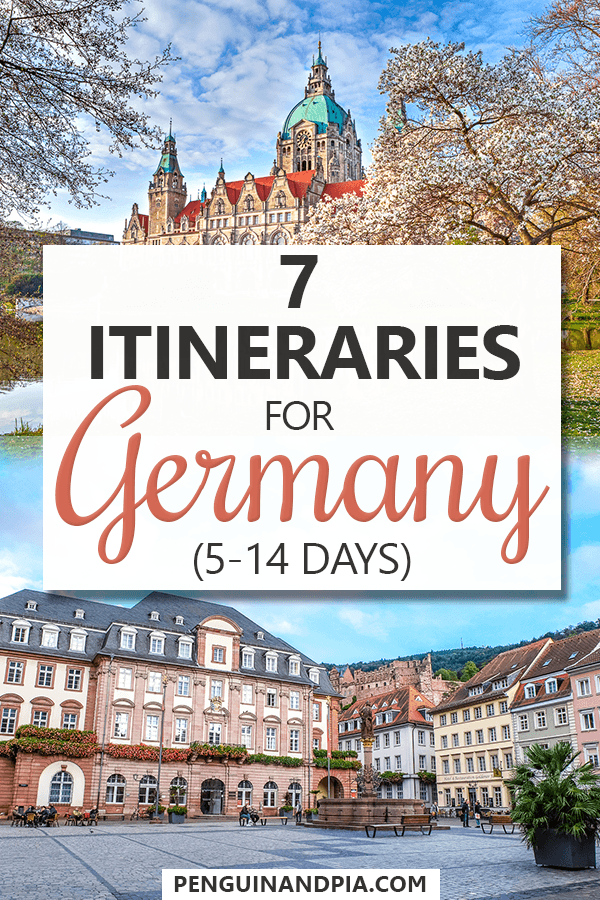
As an Amazon Associate we earn from qualifying purchases.
Destinations
Privacy policy
Disclaimer & Affiliate Disclosure
Terms of use
© 2024 Creativlier Media Inc.

IMAGES
VIDEO
COMMENTS
Germany is a destination for every taste. It offers a wide variety of attractions. Whether you are looking for history, culture, nature or just a good time, here you will find everything for an …
Boasting more than 33 UNESCO World Heritage monuments and many world class events, including Munich's annual Oktoberfest, Germany offers something for everyone. From art to …
You will find everything you ever wanted to know about Germany in our summary of key facts and figures, from form of government to size, landscapes, population, lifestyle and cultural scene.
The Foreign, Commonwealth and Development Office (FCDO) provides advice about the risks of travel to Germany, to help you make informed decisions. Find out more about FCDO travel advice . Read all the advice in this guide.
Germany Travel Guide. Germany is often seen as the heart of Europe due to its deep history. It’s most well known for its bratwursts and beer, but the country is so much more than that. …
Any person who spent time in an area classified as an area of variants of concern, within the 10 days prior to entering the Federal Republic of Germany, must be in possession of a test …
1 Meet Your Germany Travel Guides. 2 Overview of Regions. 3 Where to Go in Germany: Itineraries and Planning. 4 Want more itinerary ideas? Are you a big city person? Check out… 5 Prefer smaller historic, picturesque cities? Check …
So, whether you’re looking for the best week in Germany or a Germany itinerary that covers 5 days or 14 days – here’s our master guide with 7 detailed Germany itineraries by train and/or by car!
The rules on quarantine and isolation are some of the most important measures to control the coronavi-rus pandemic and prevent a rapid spread of the virus, since many people in …